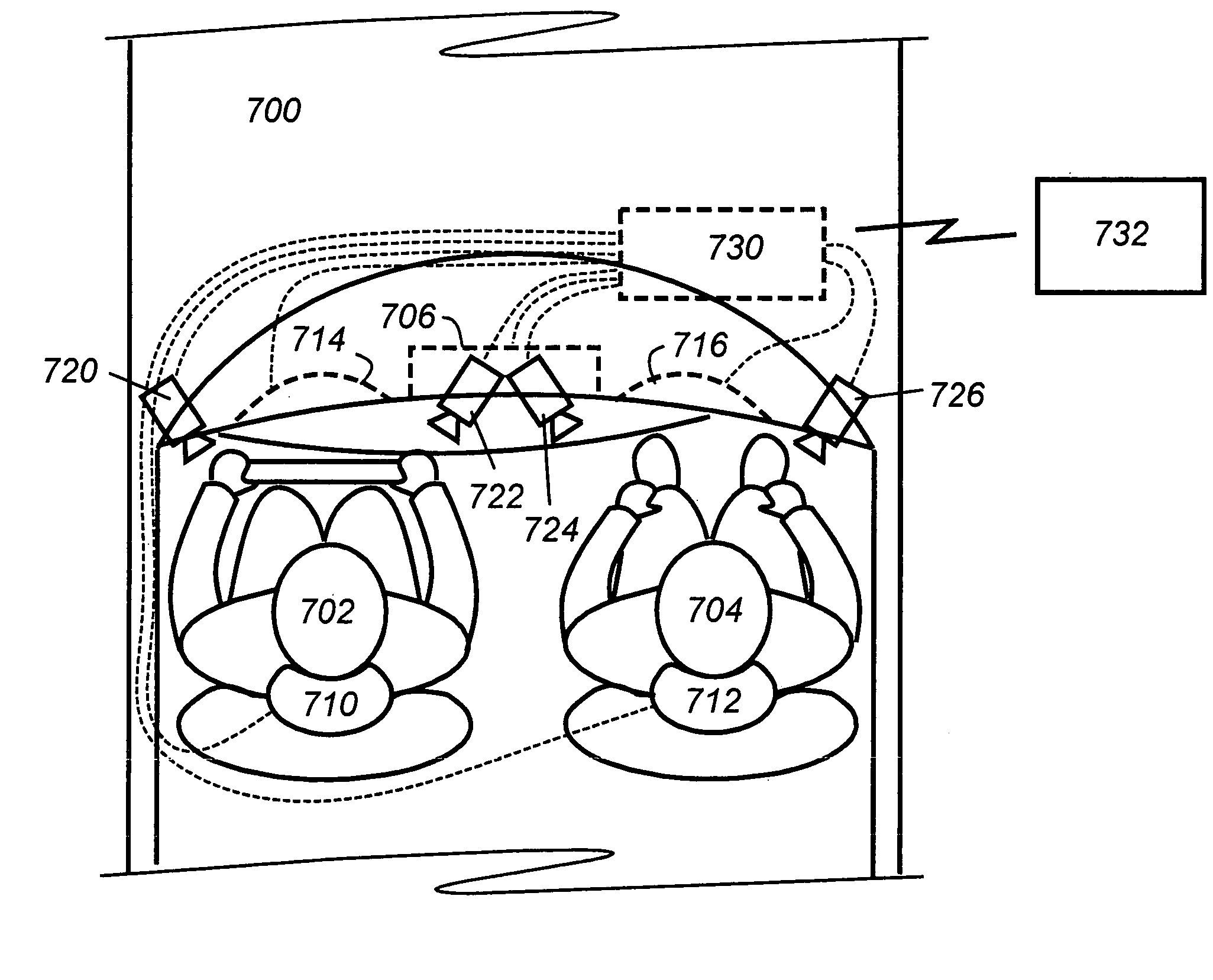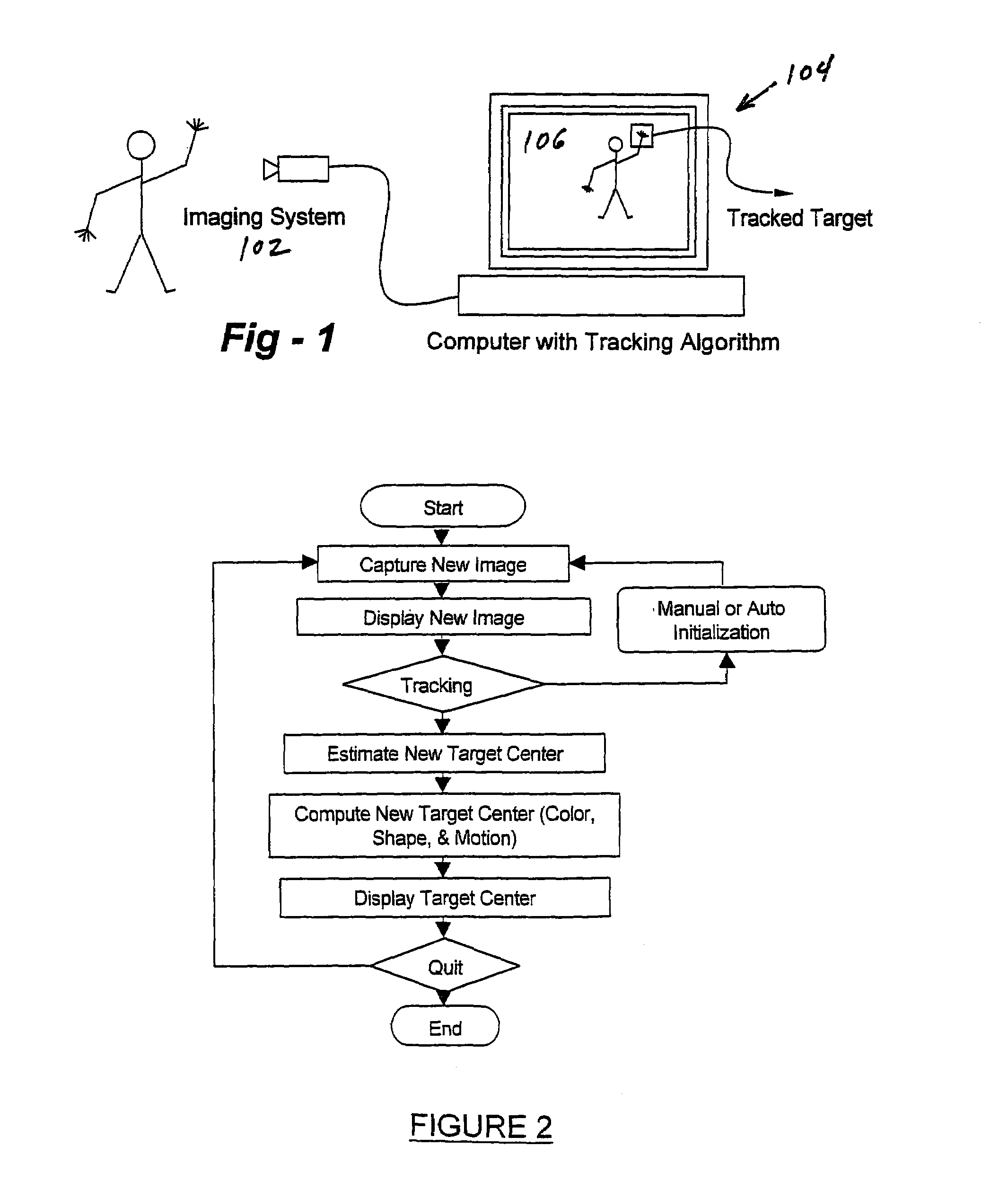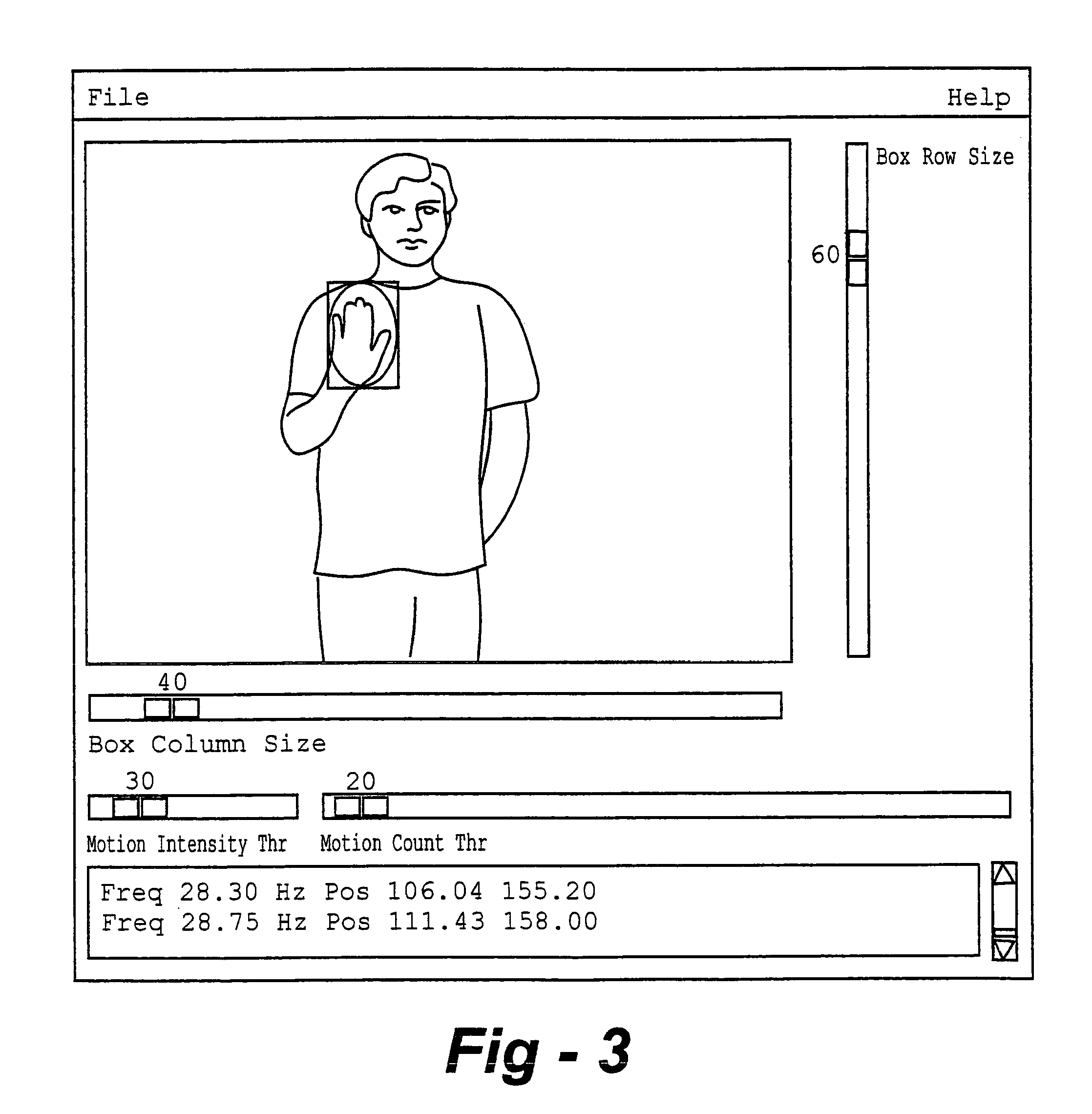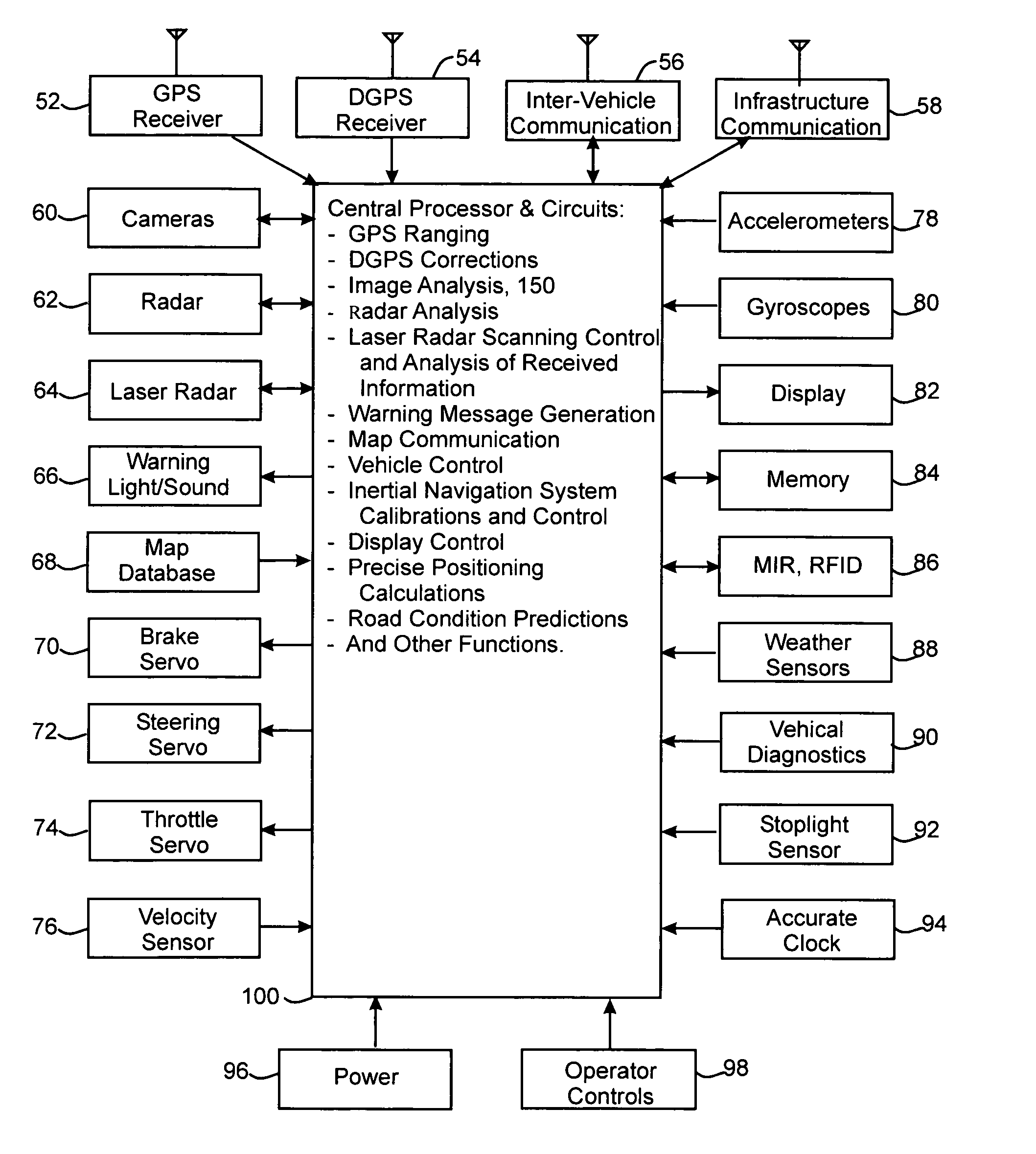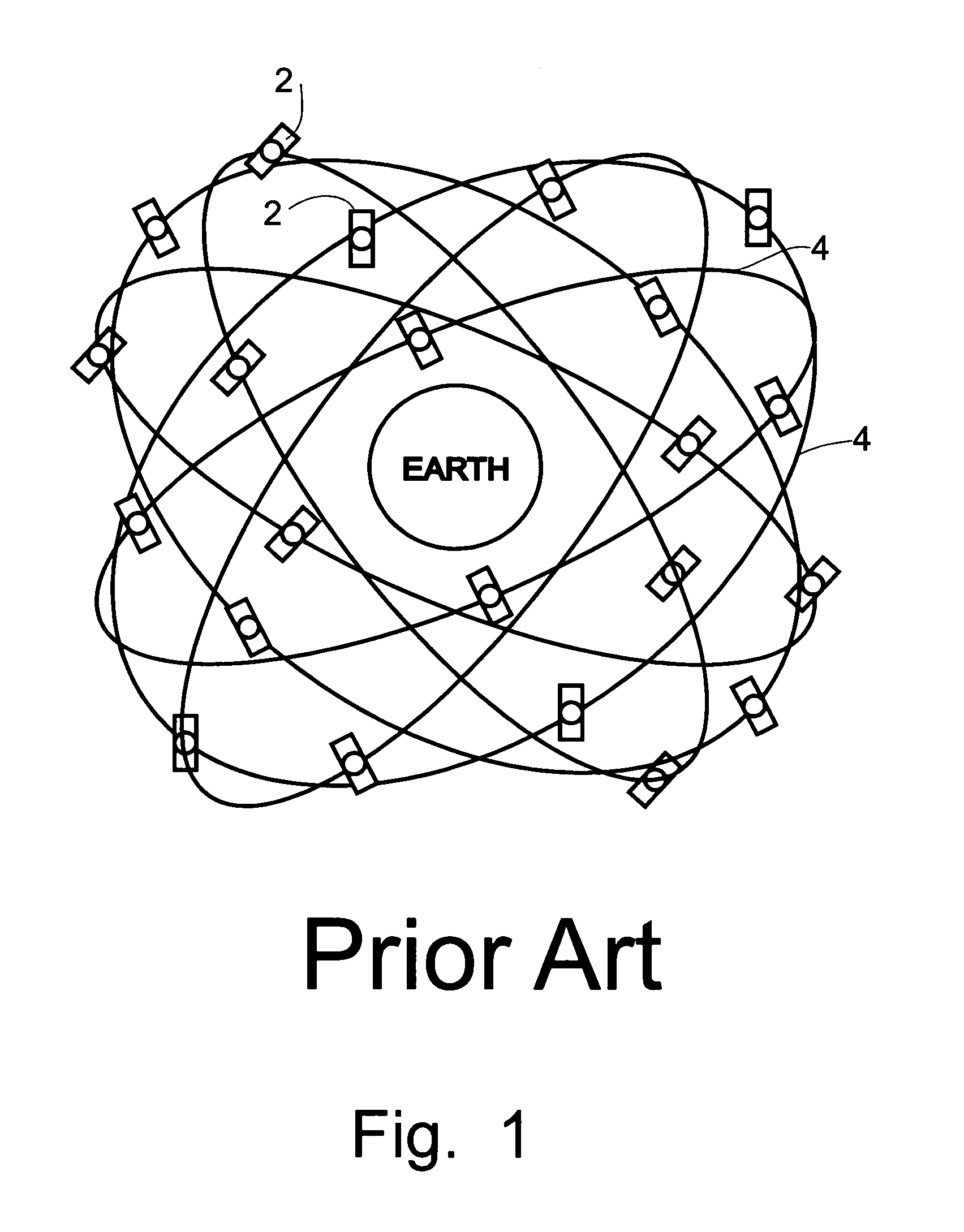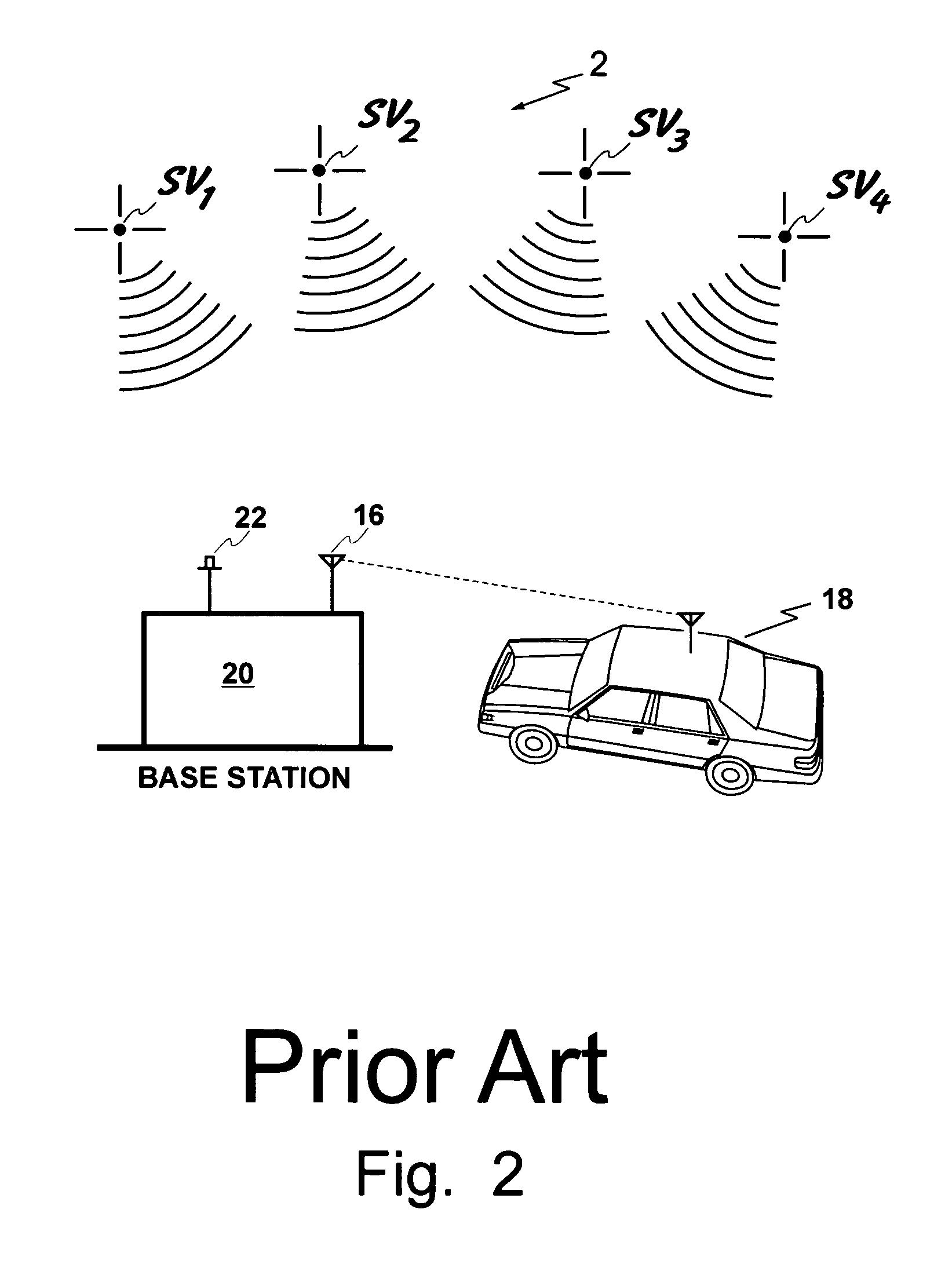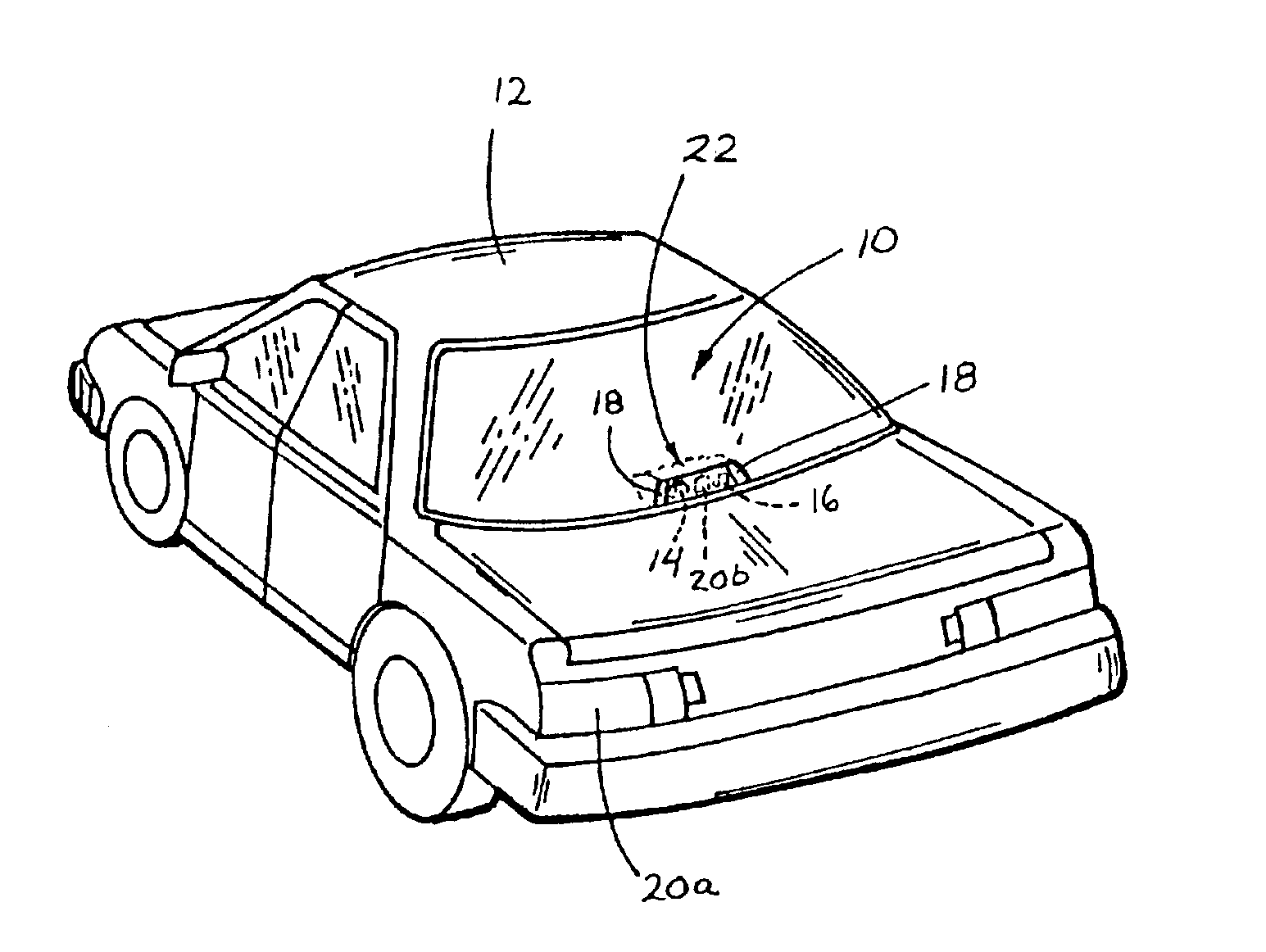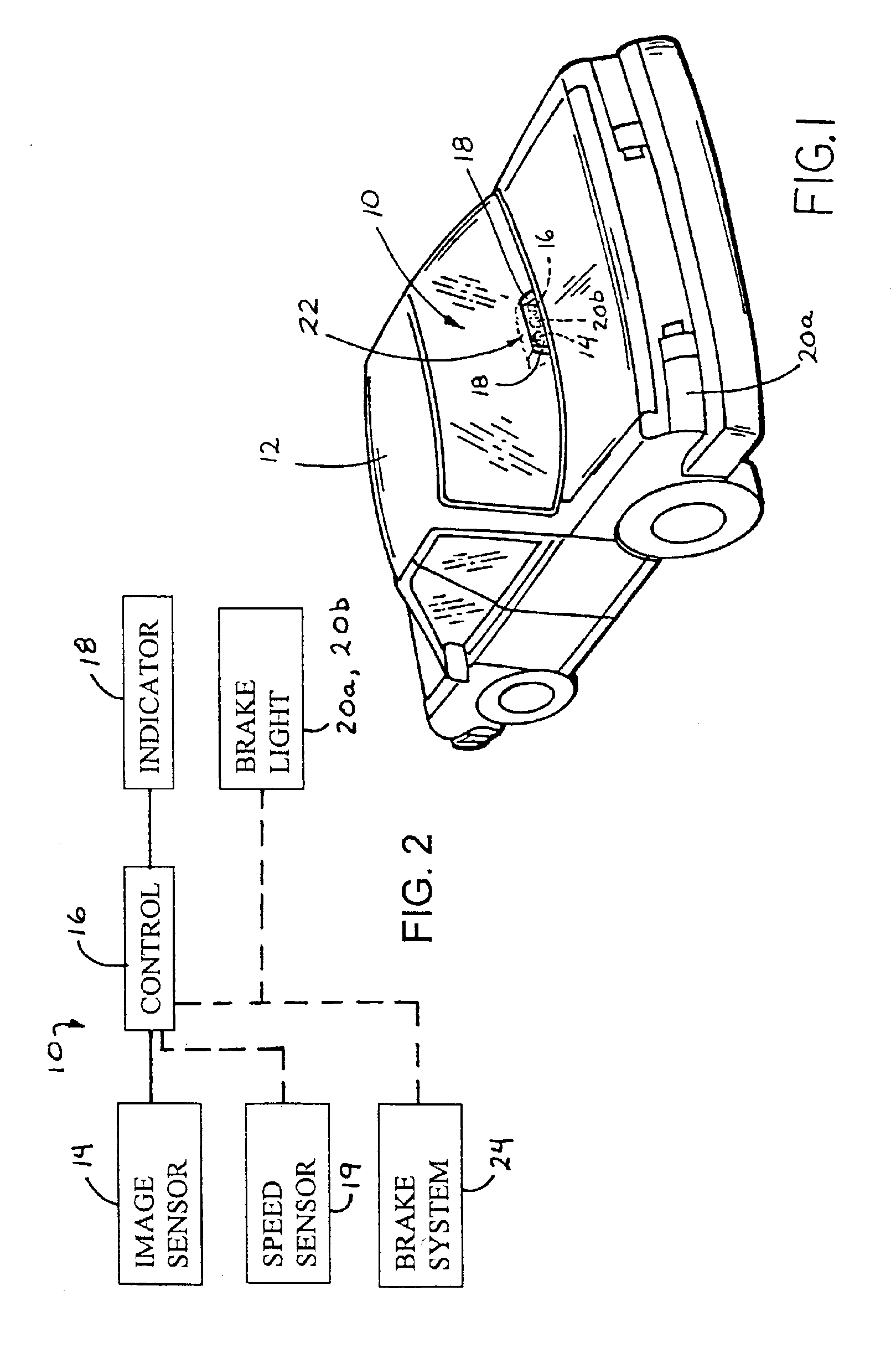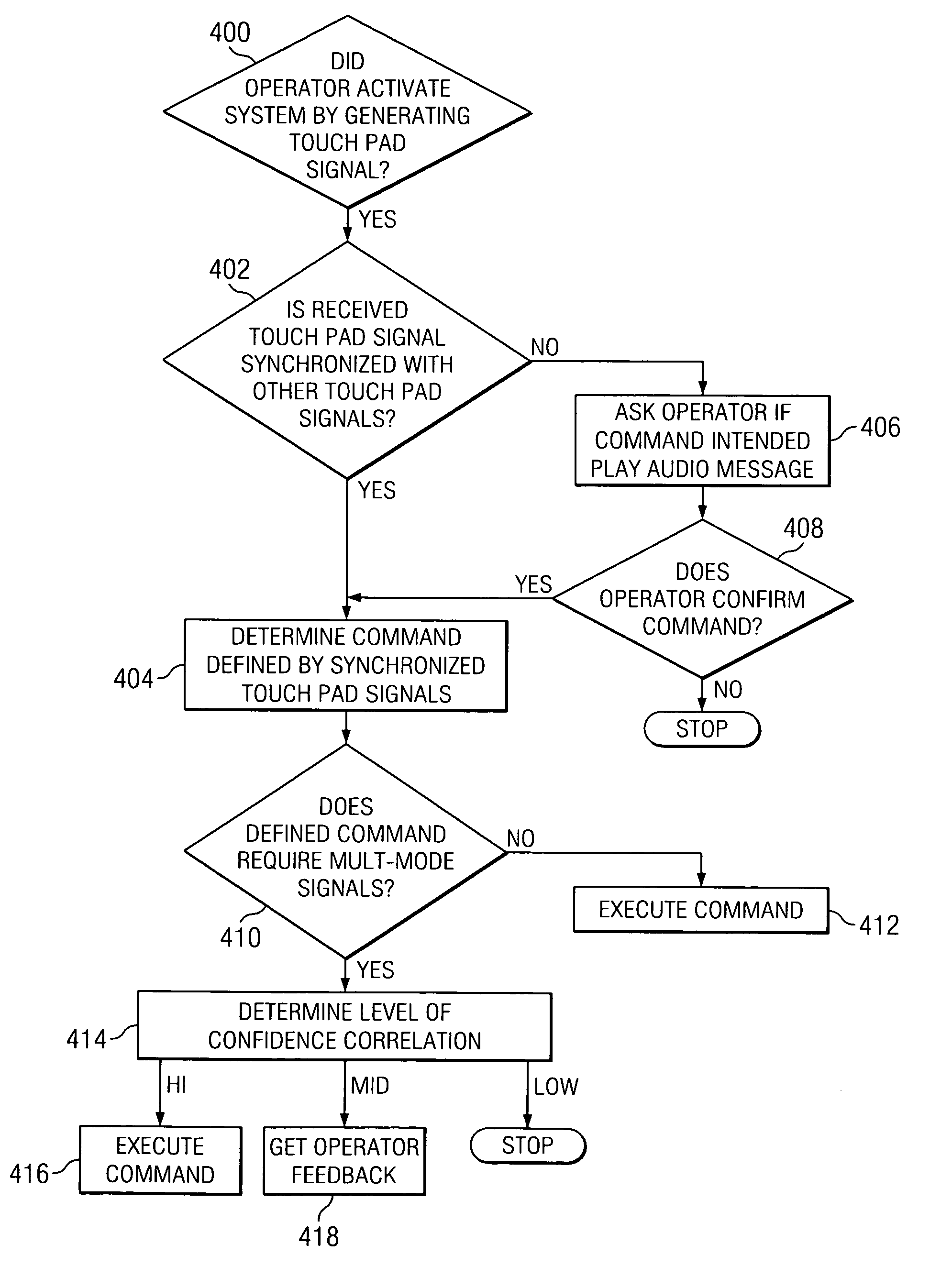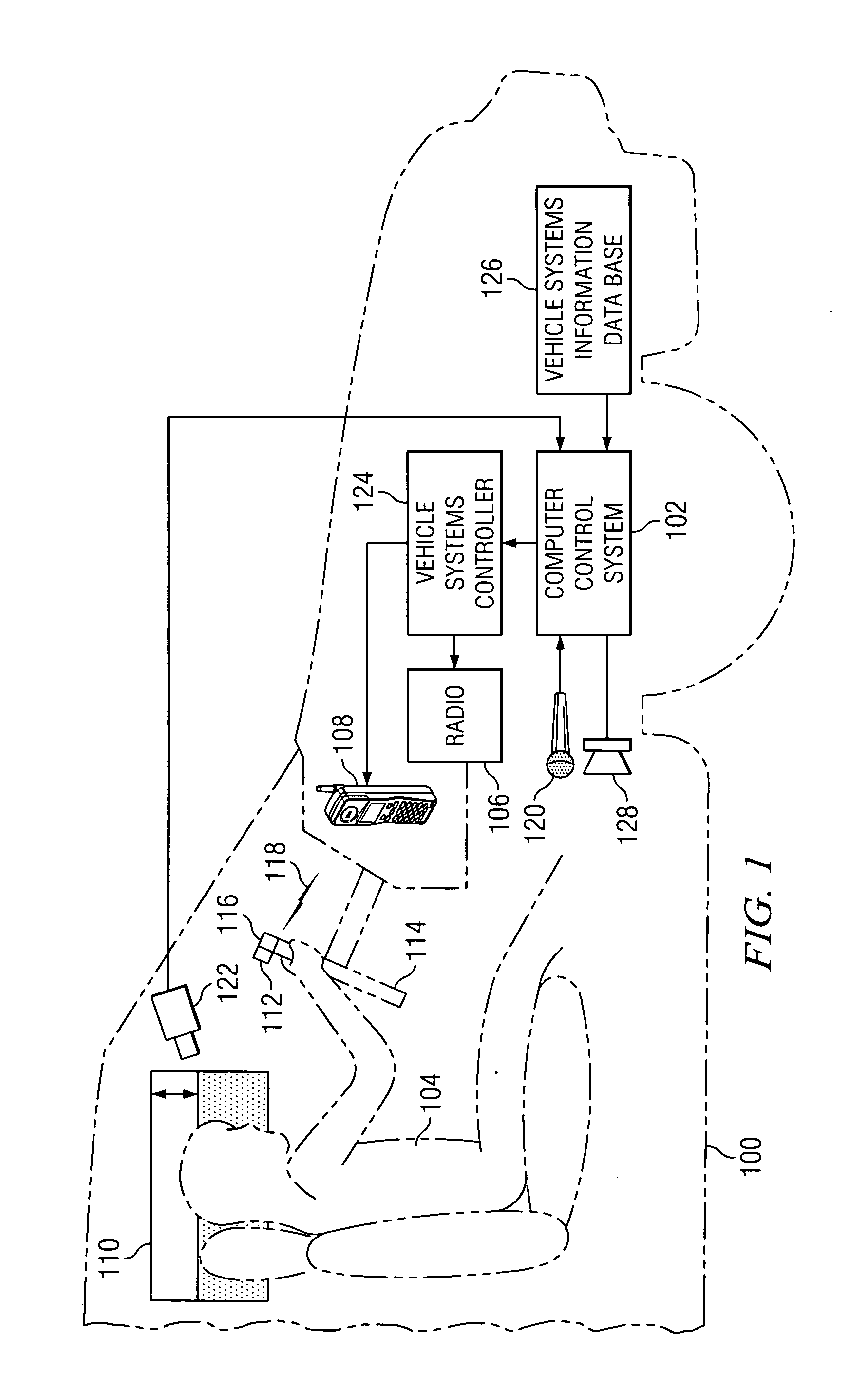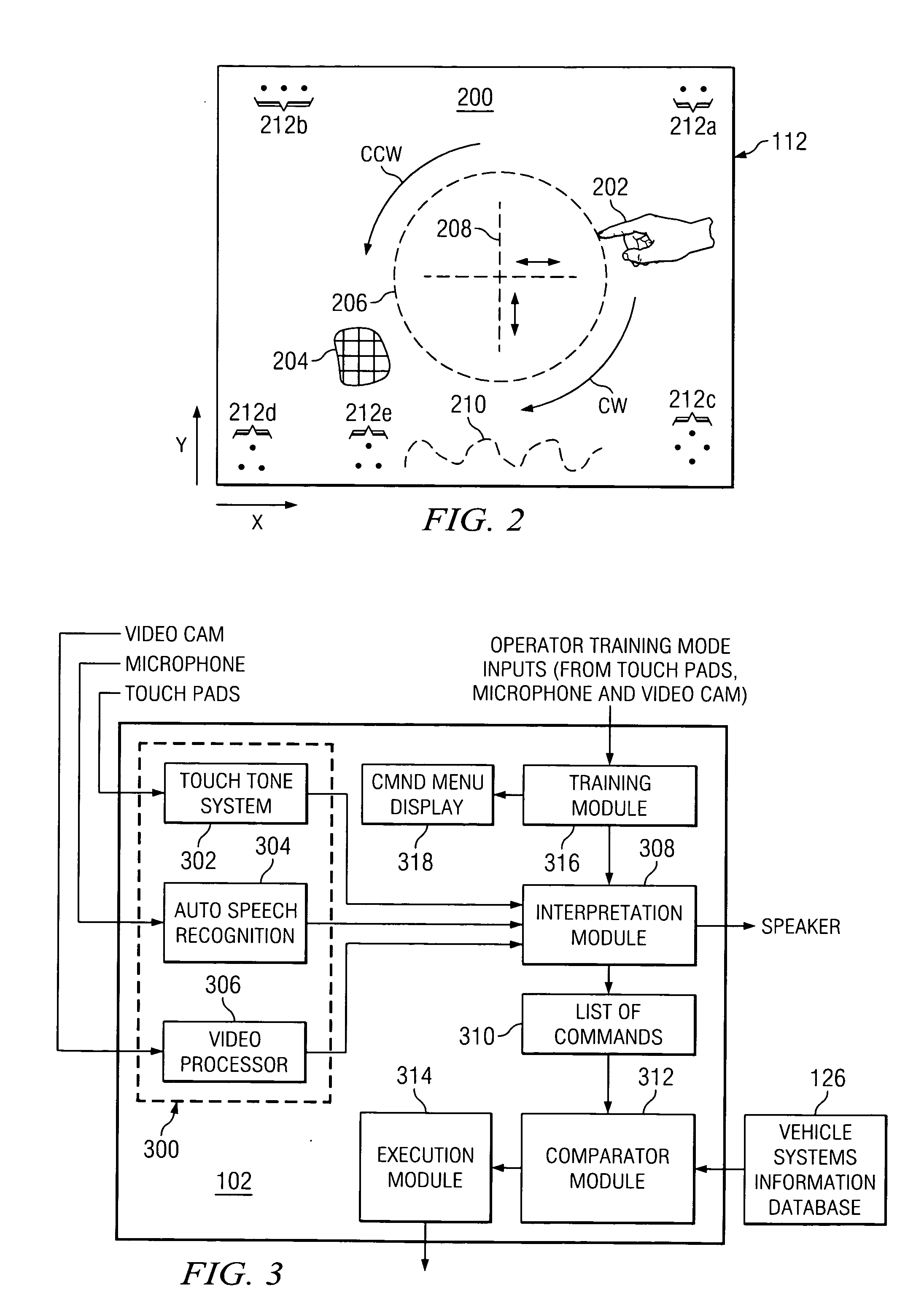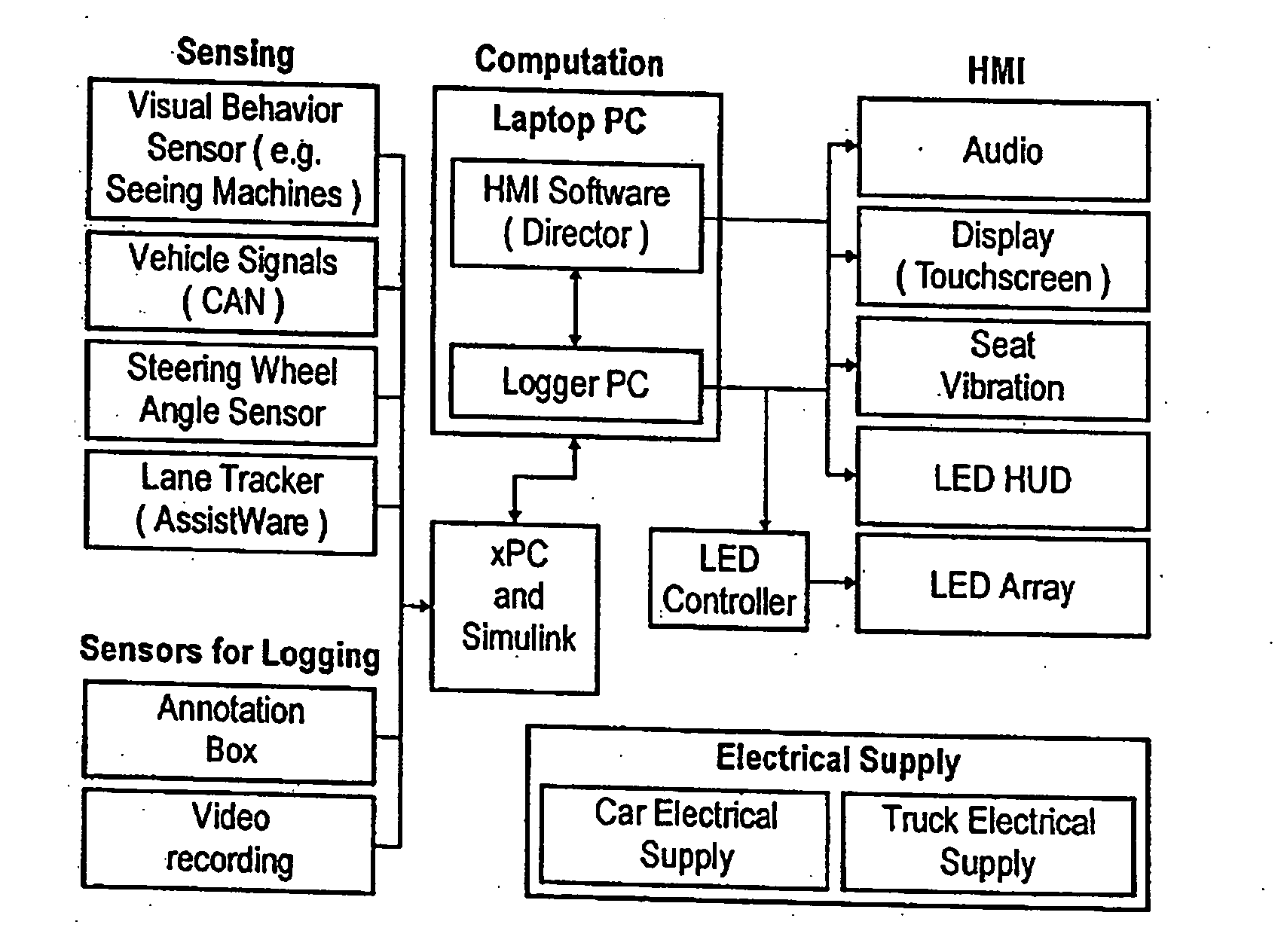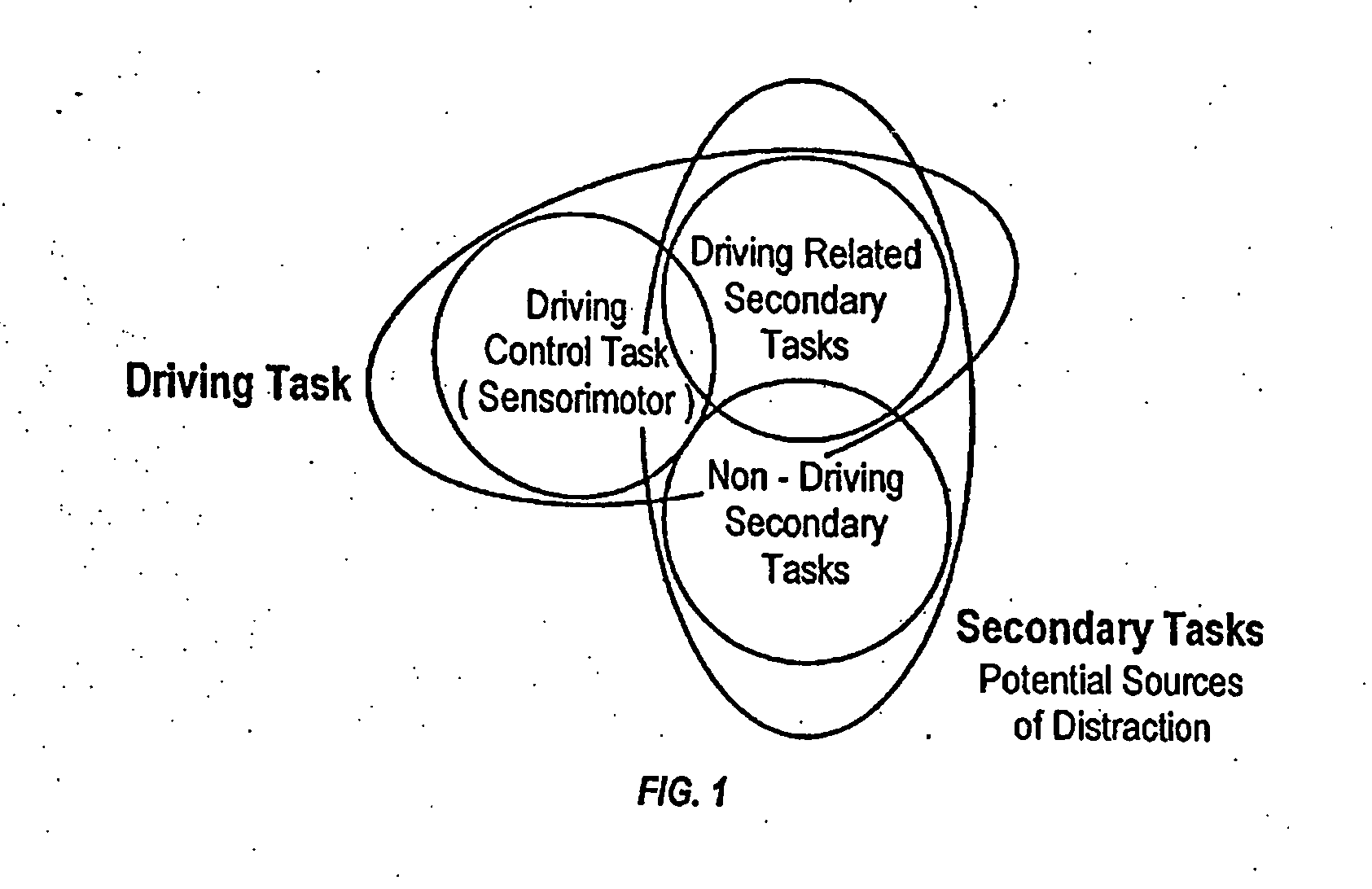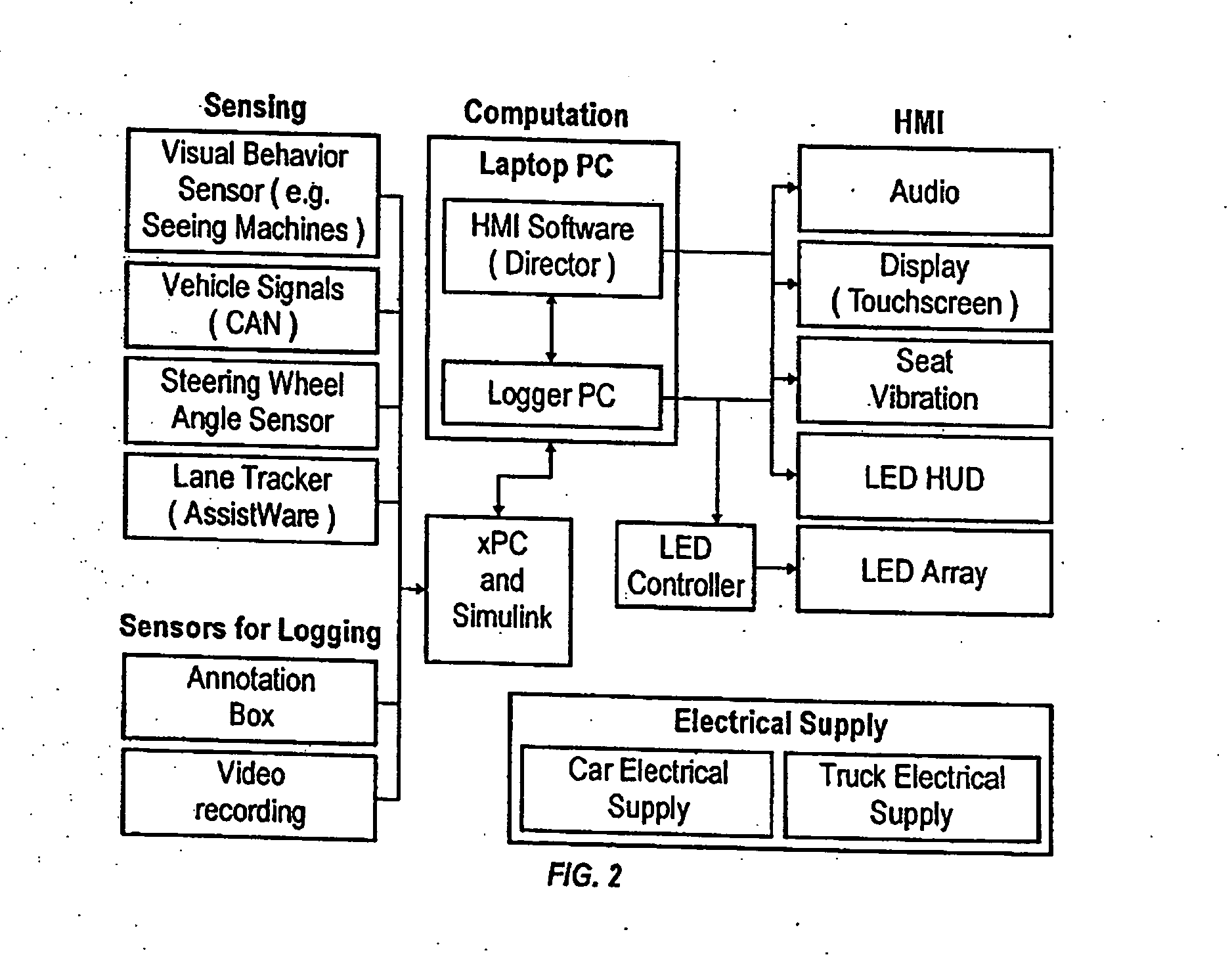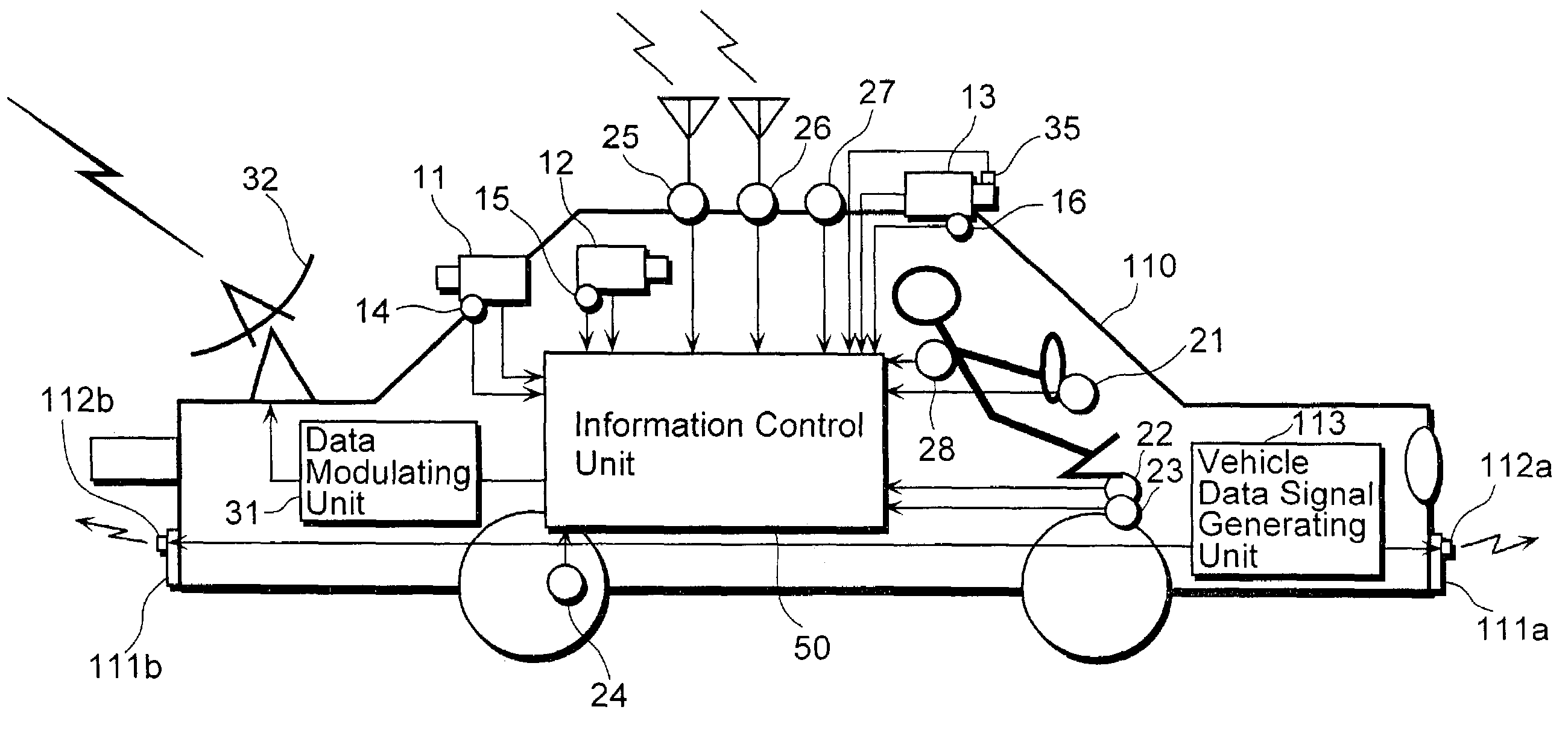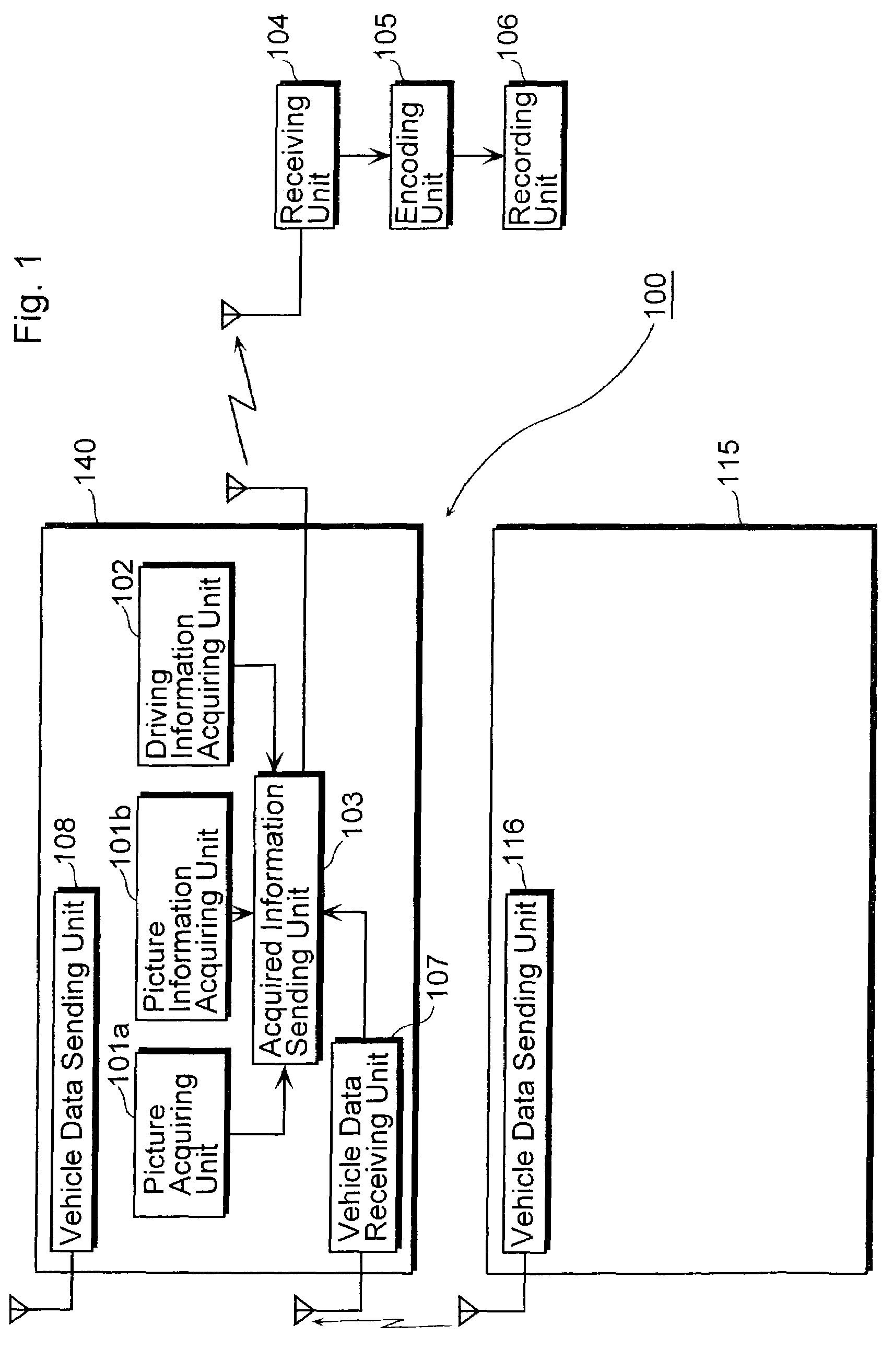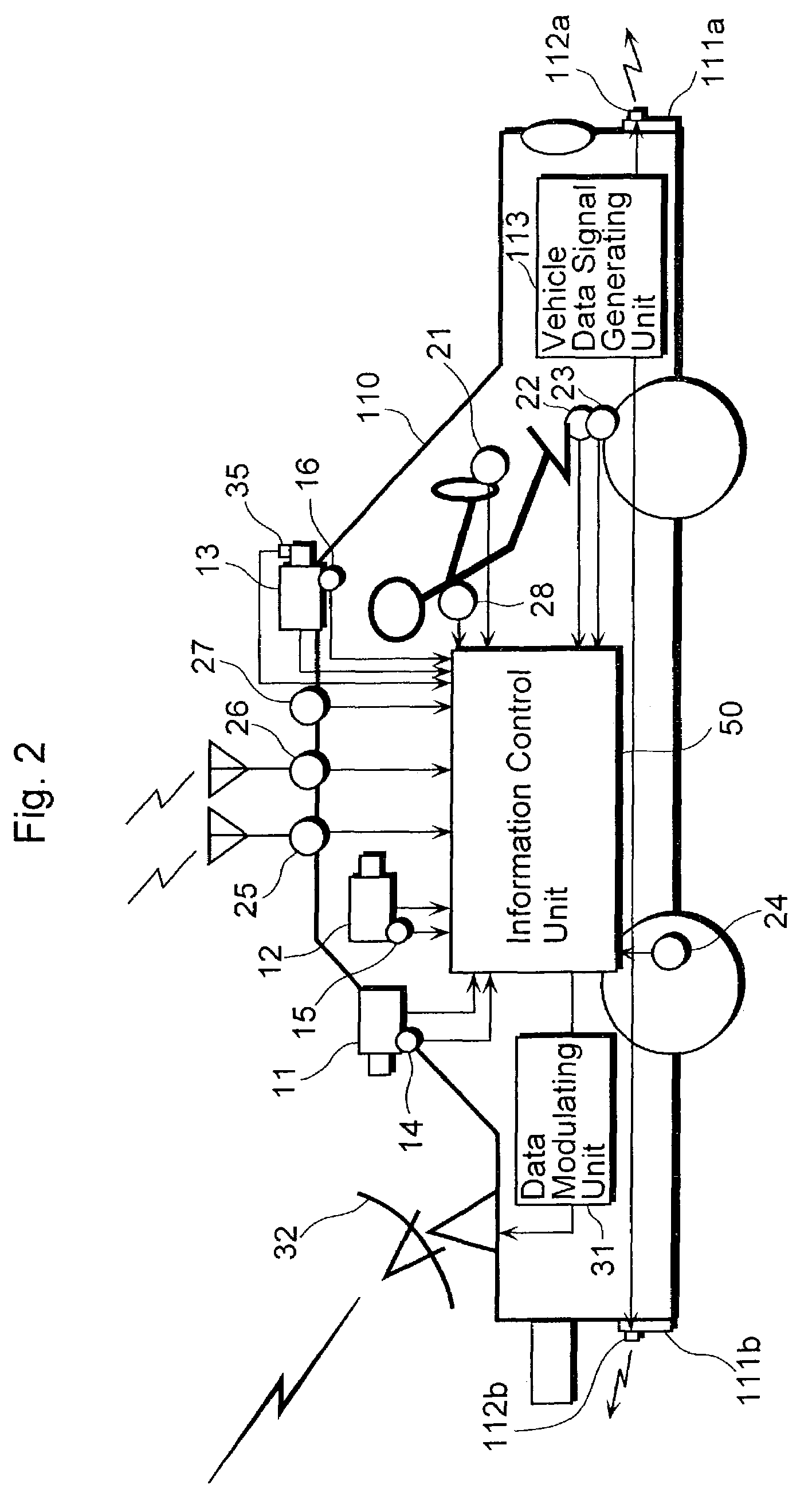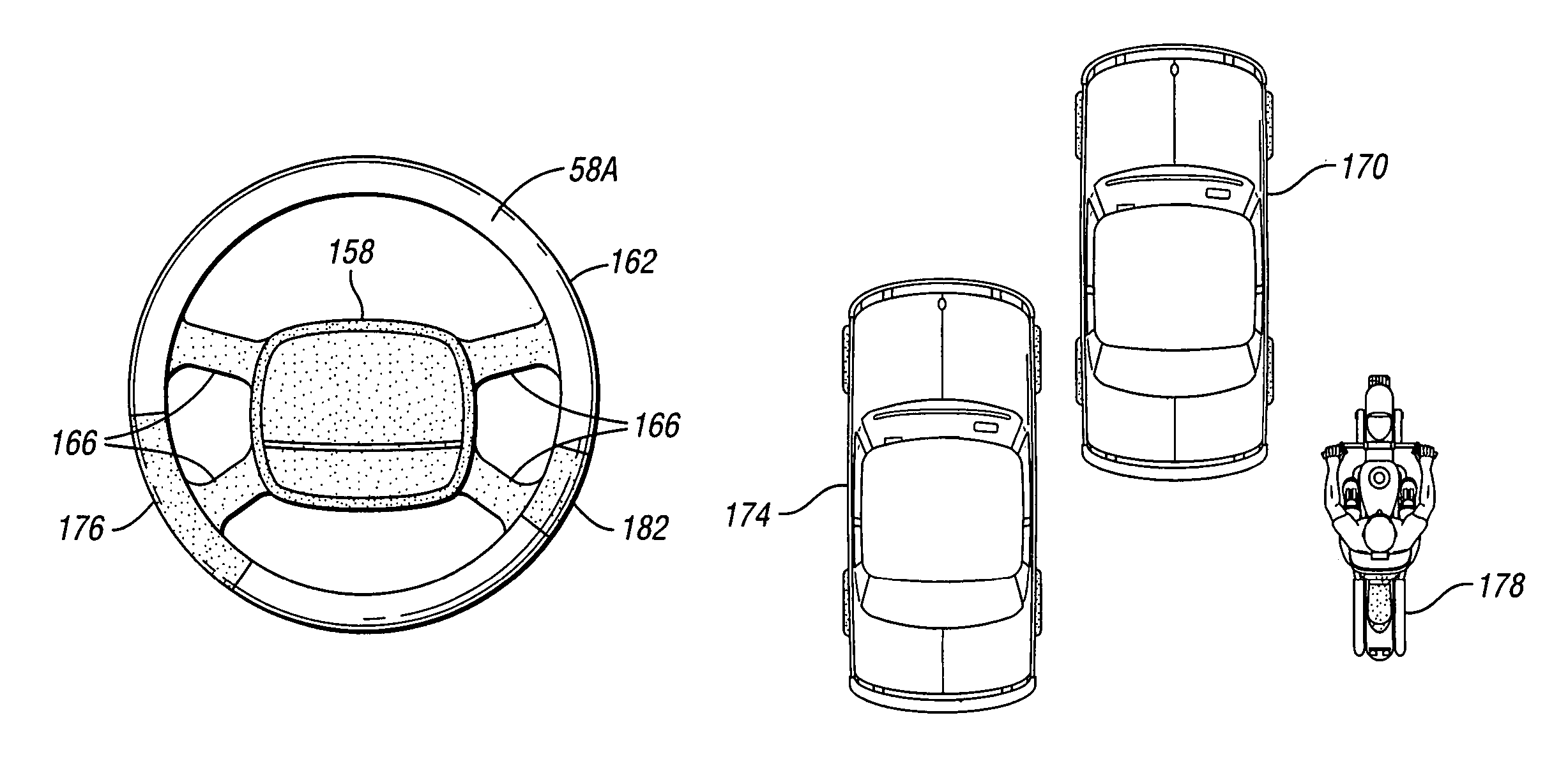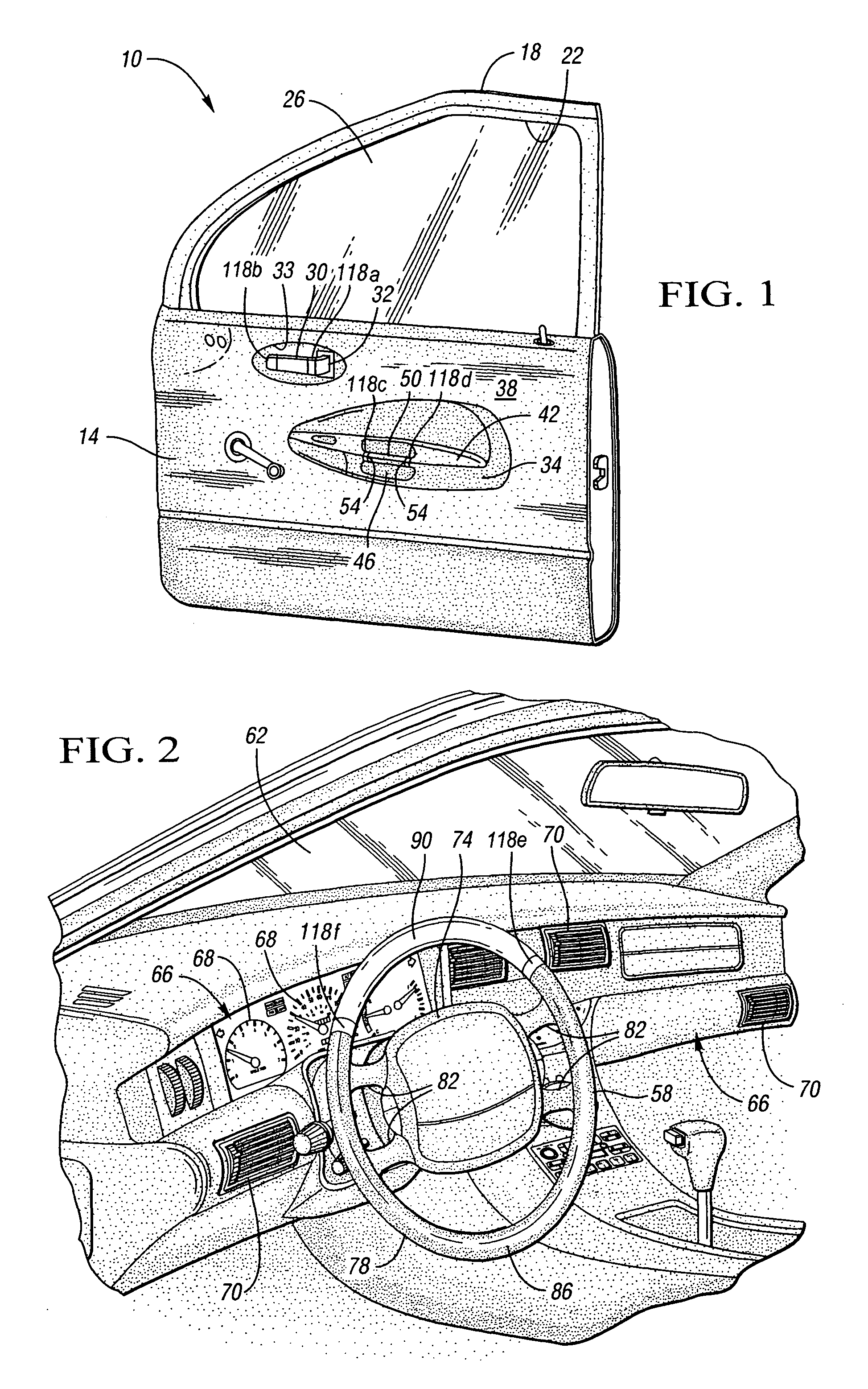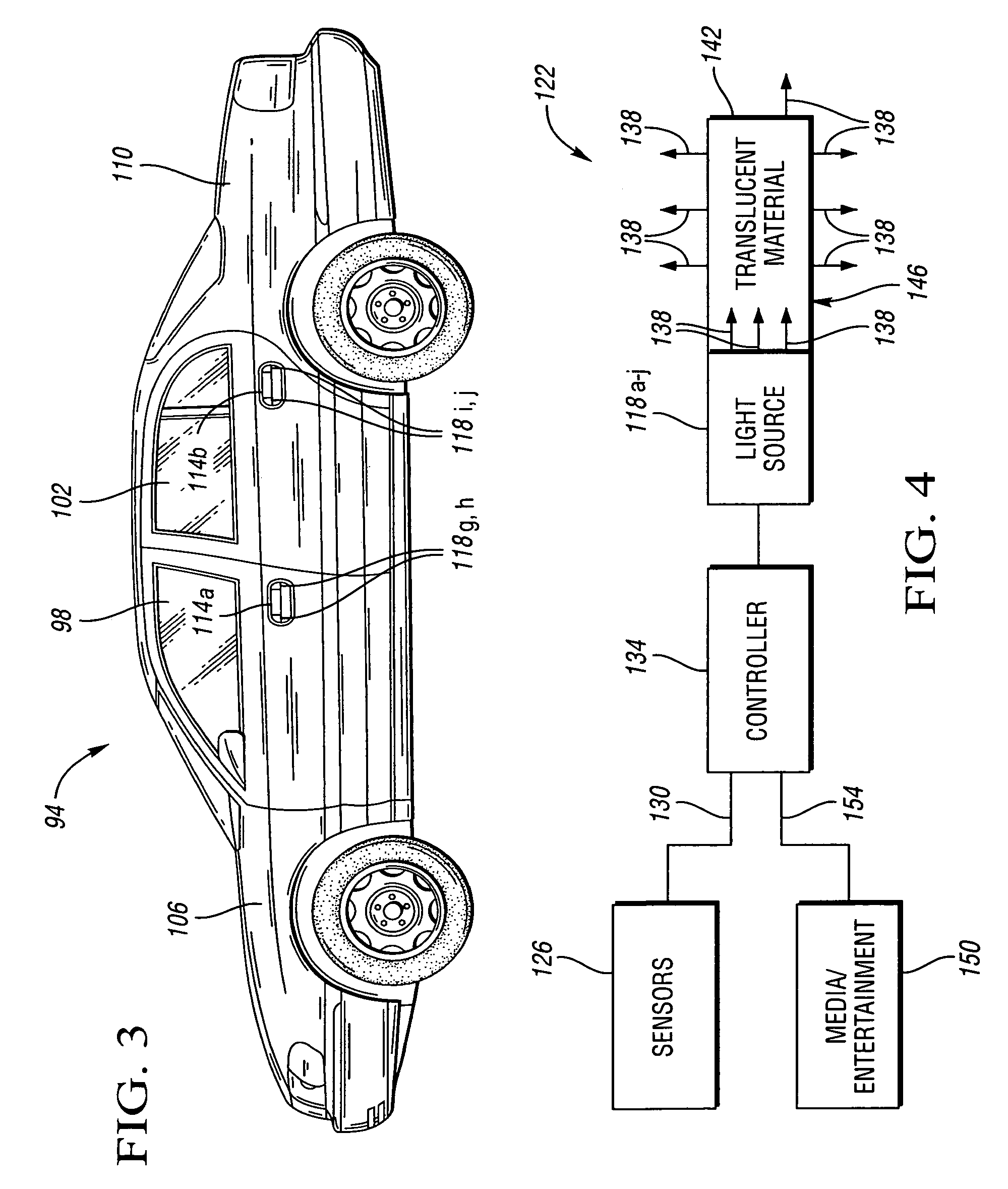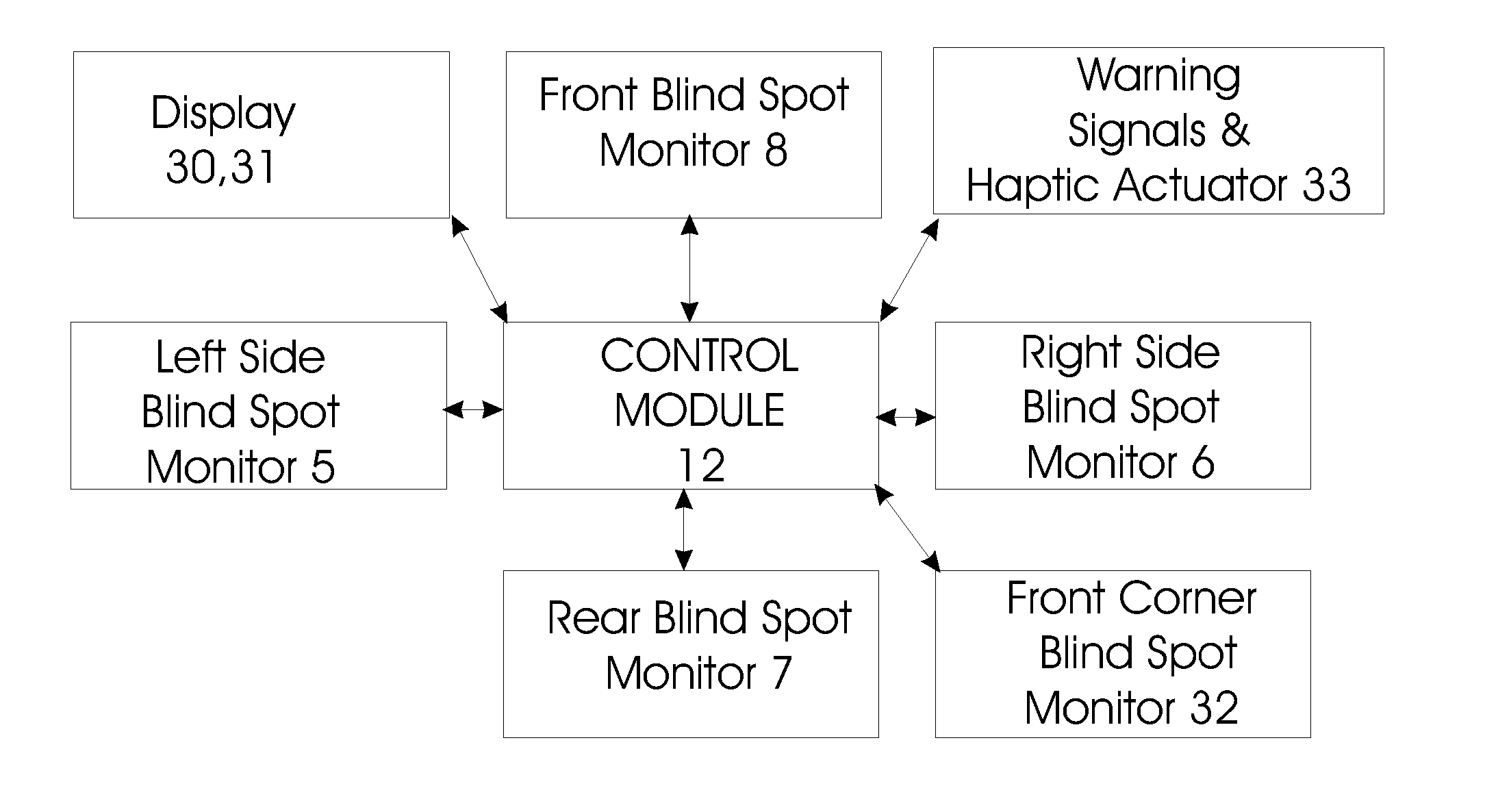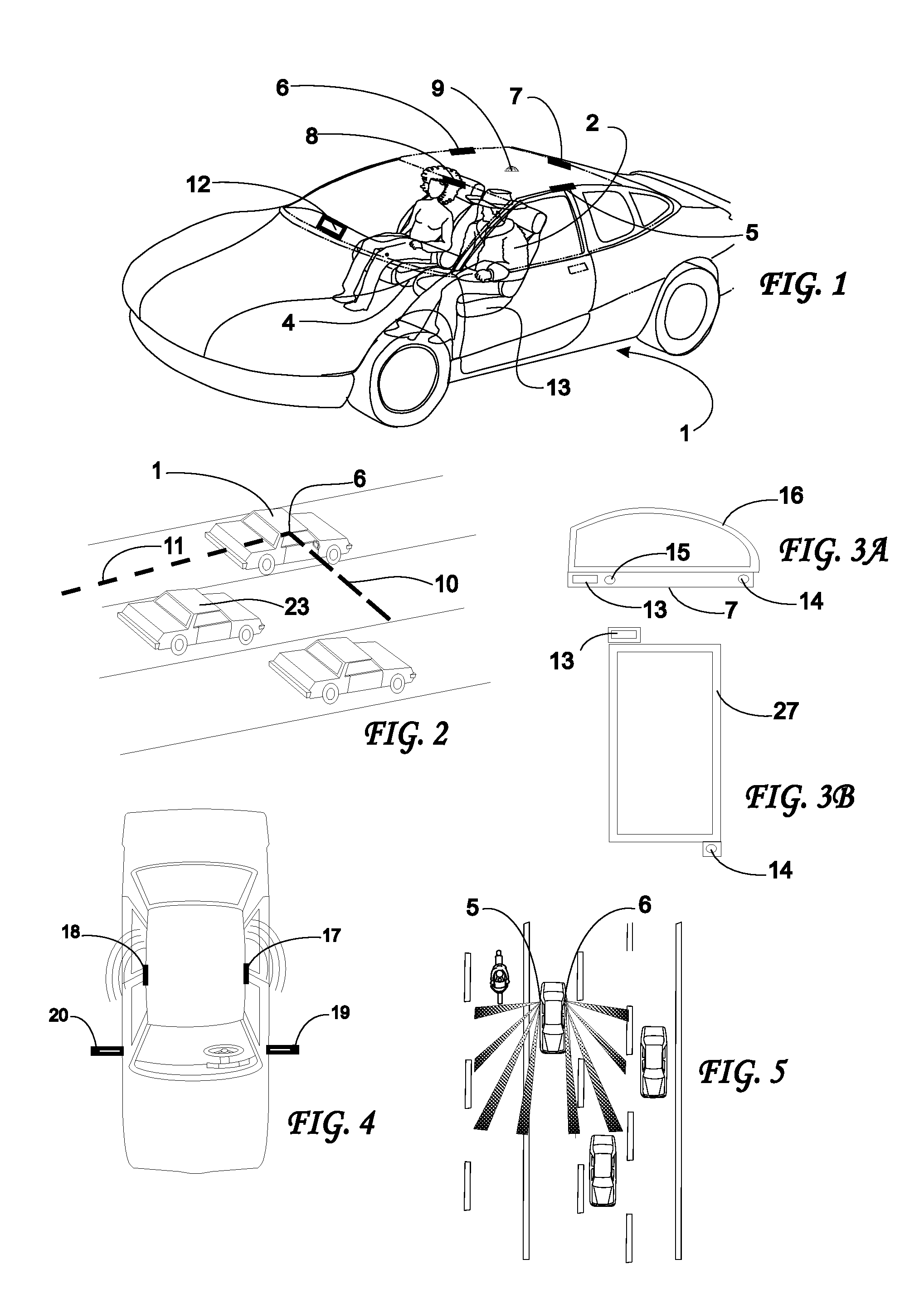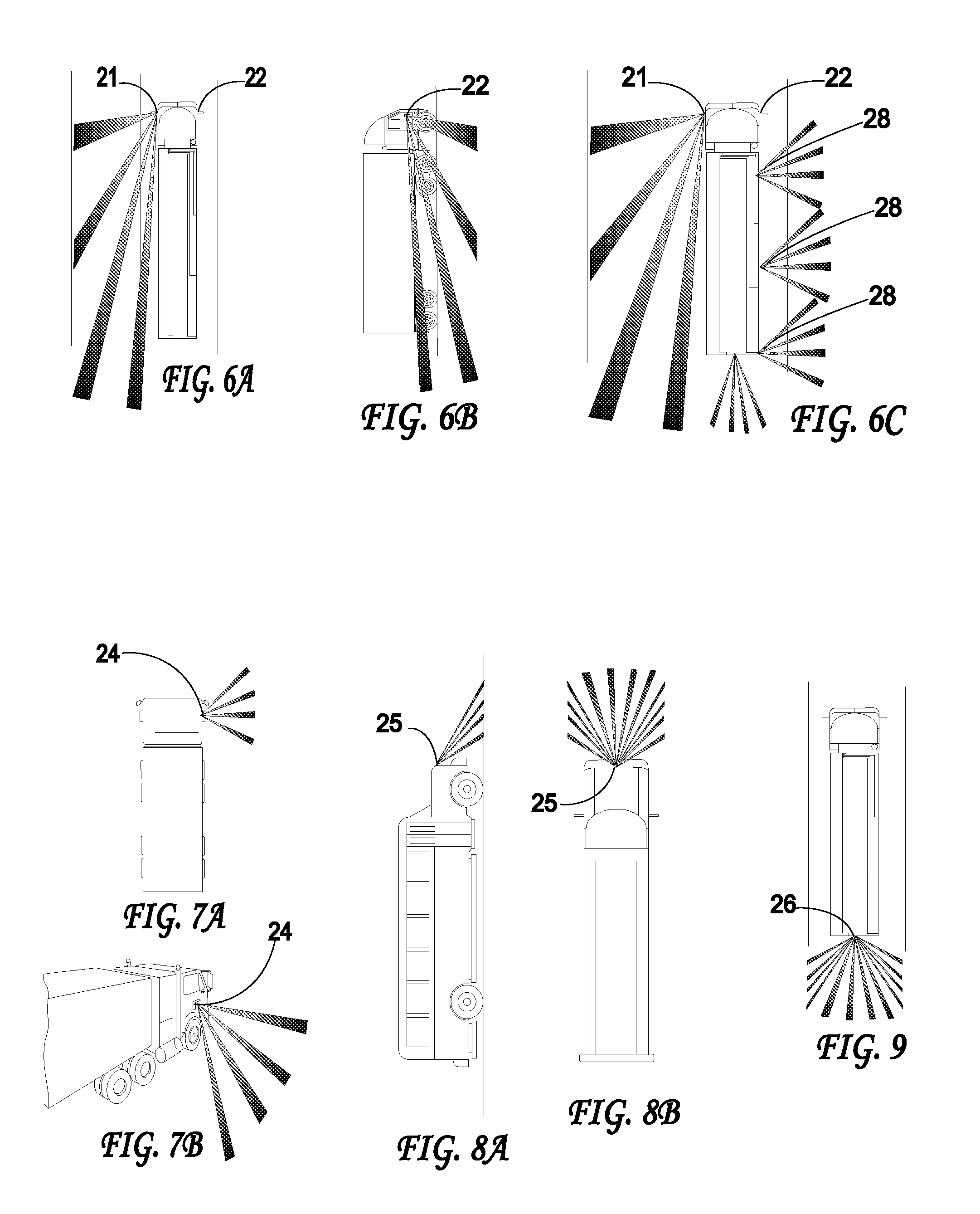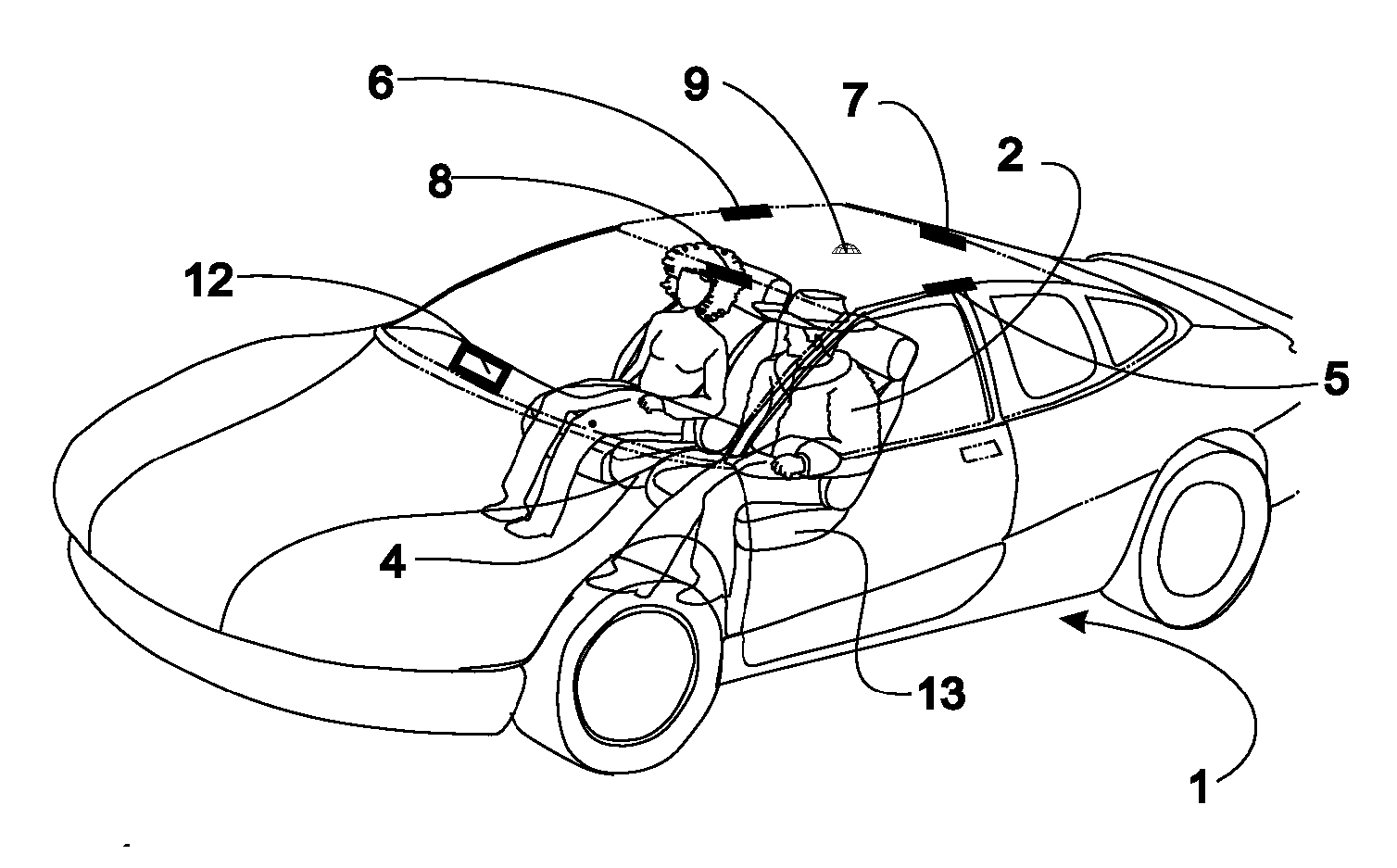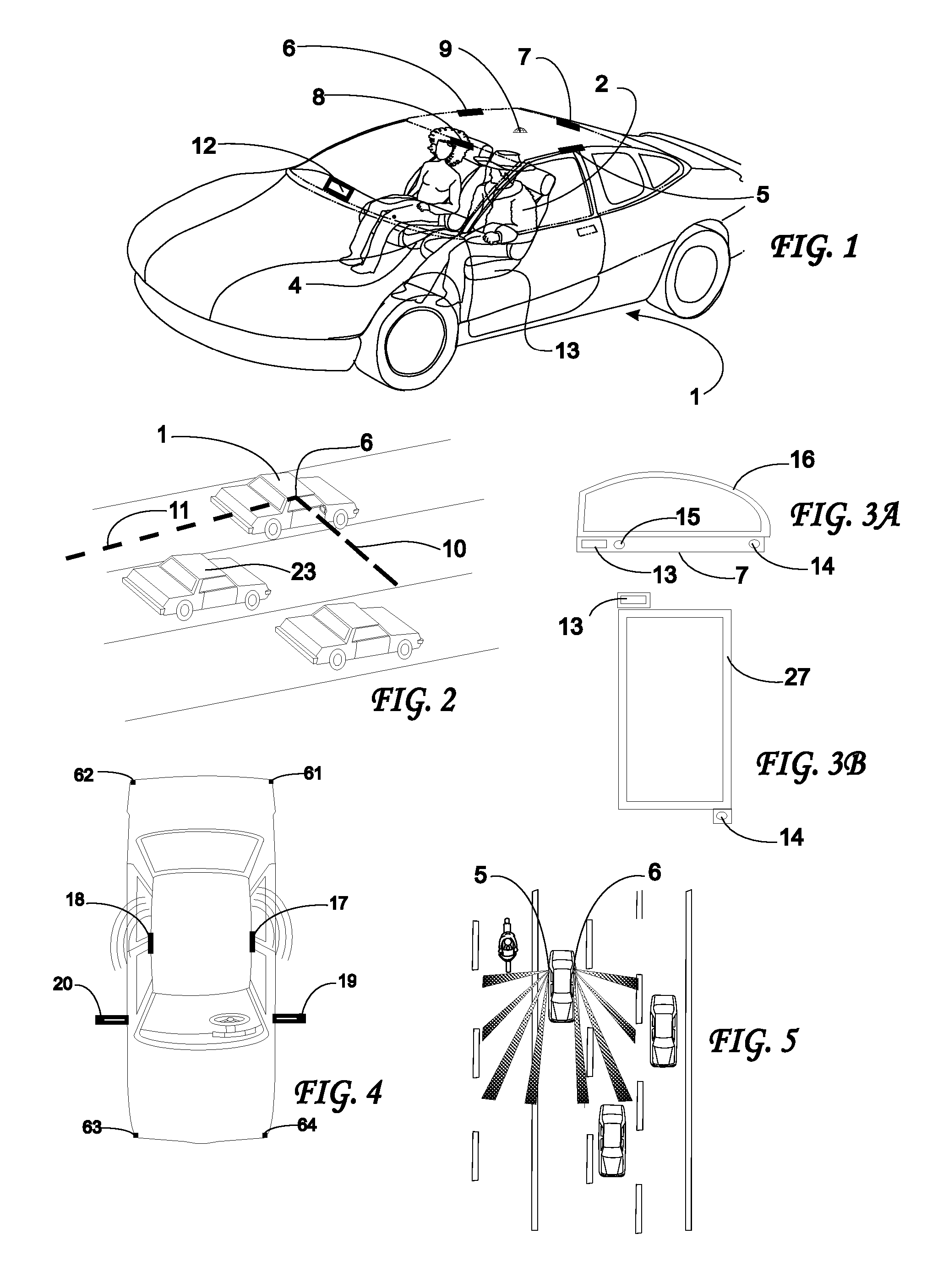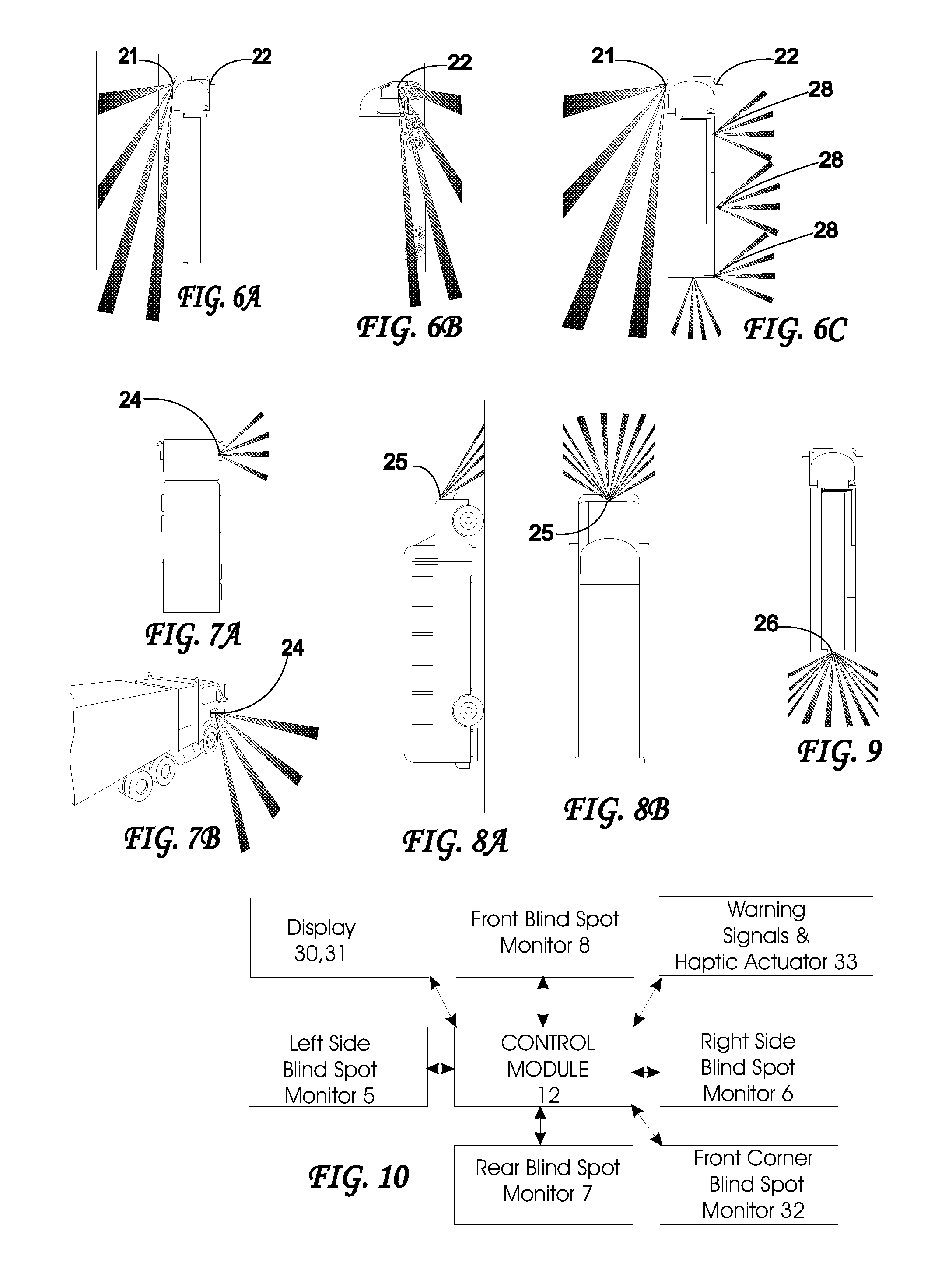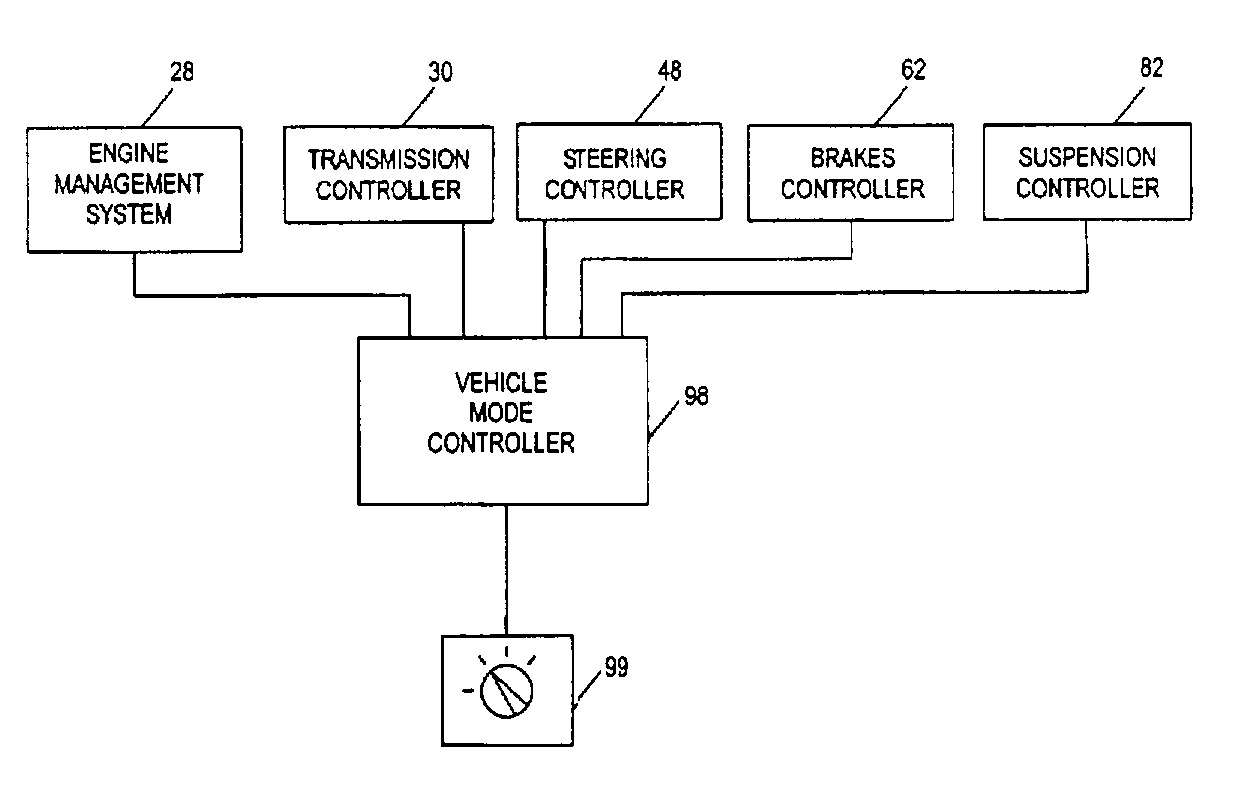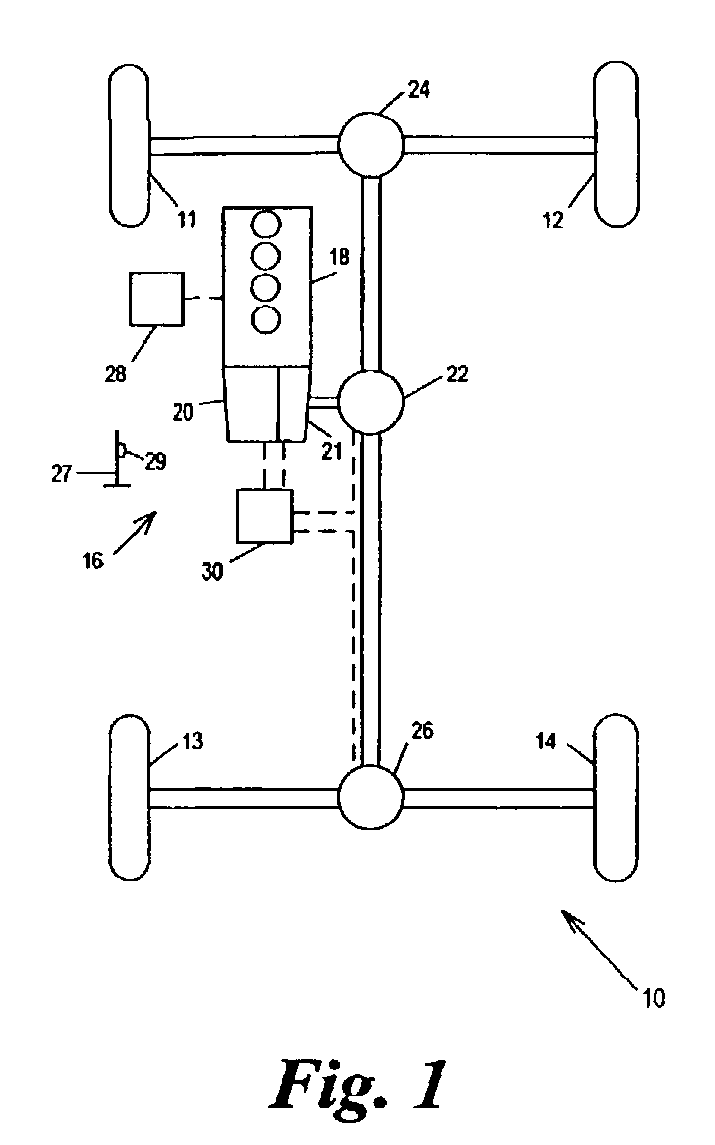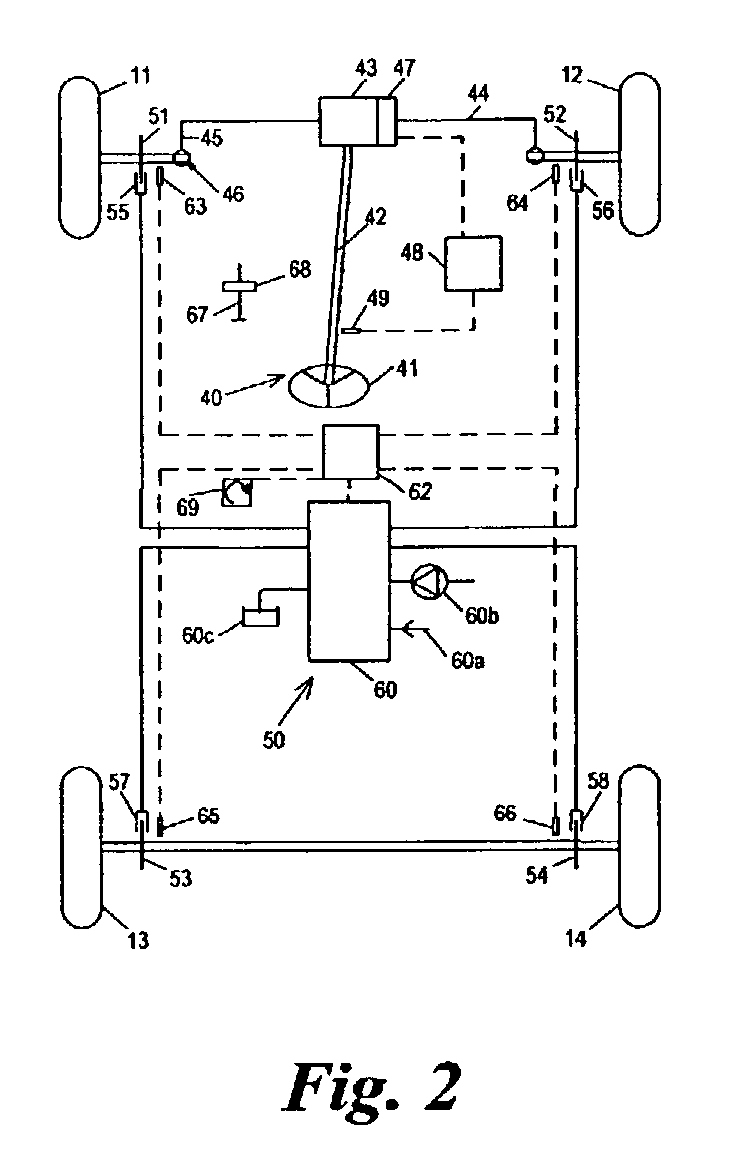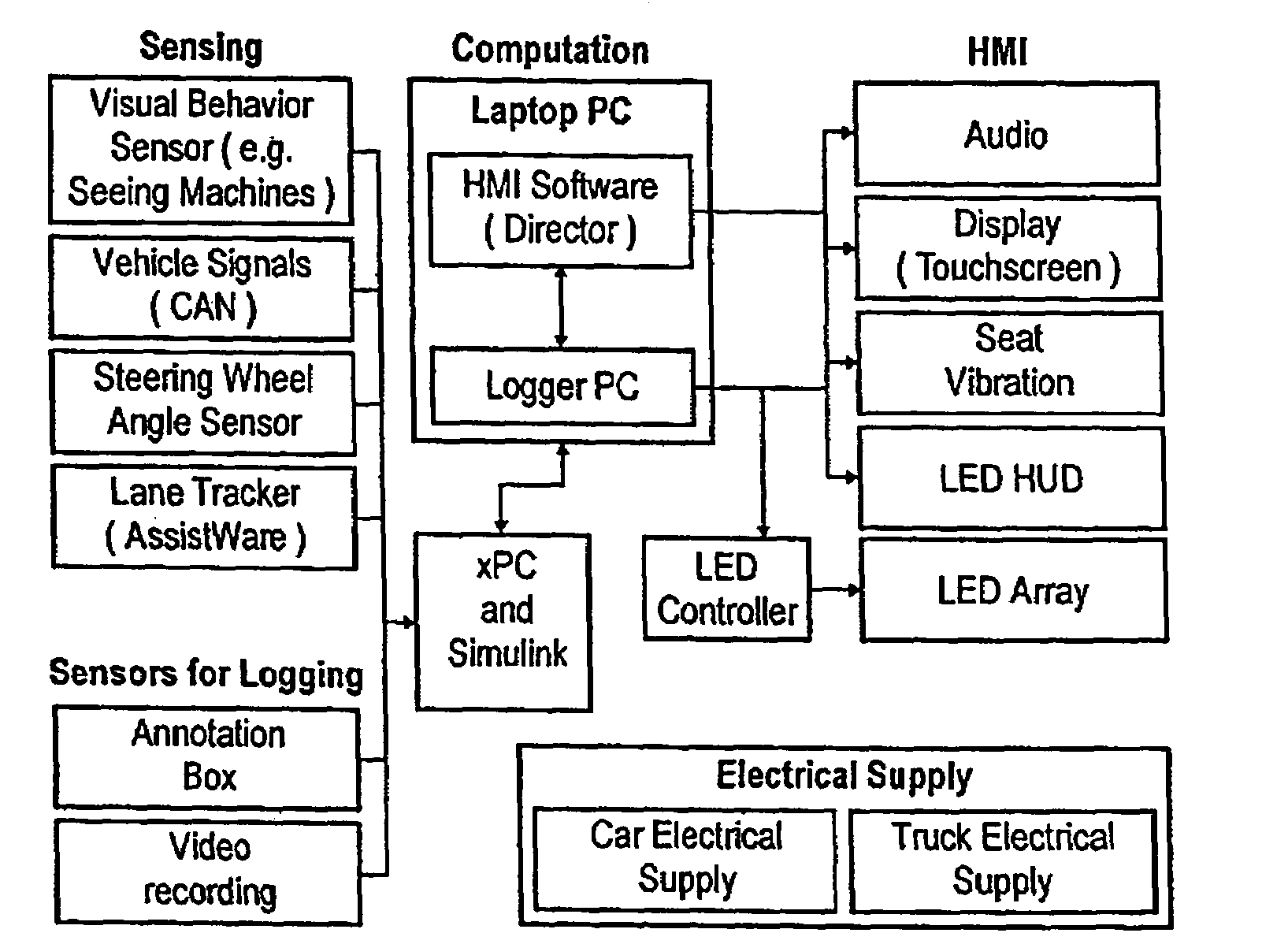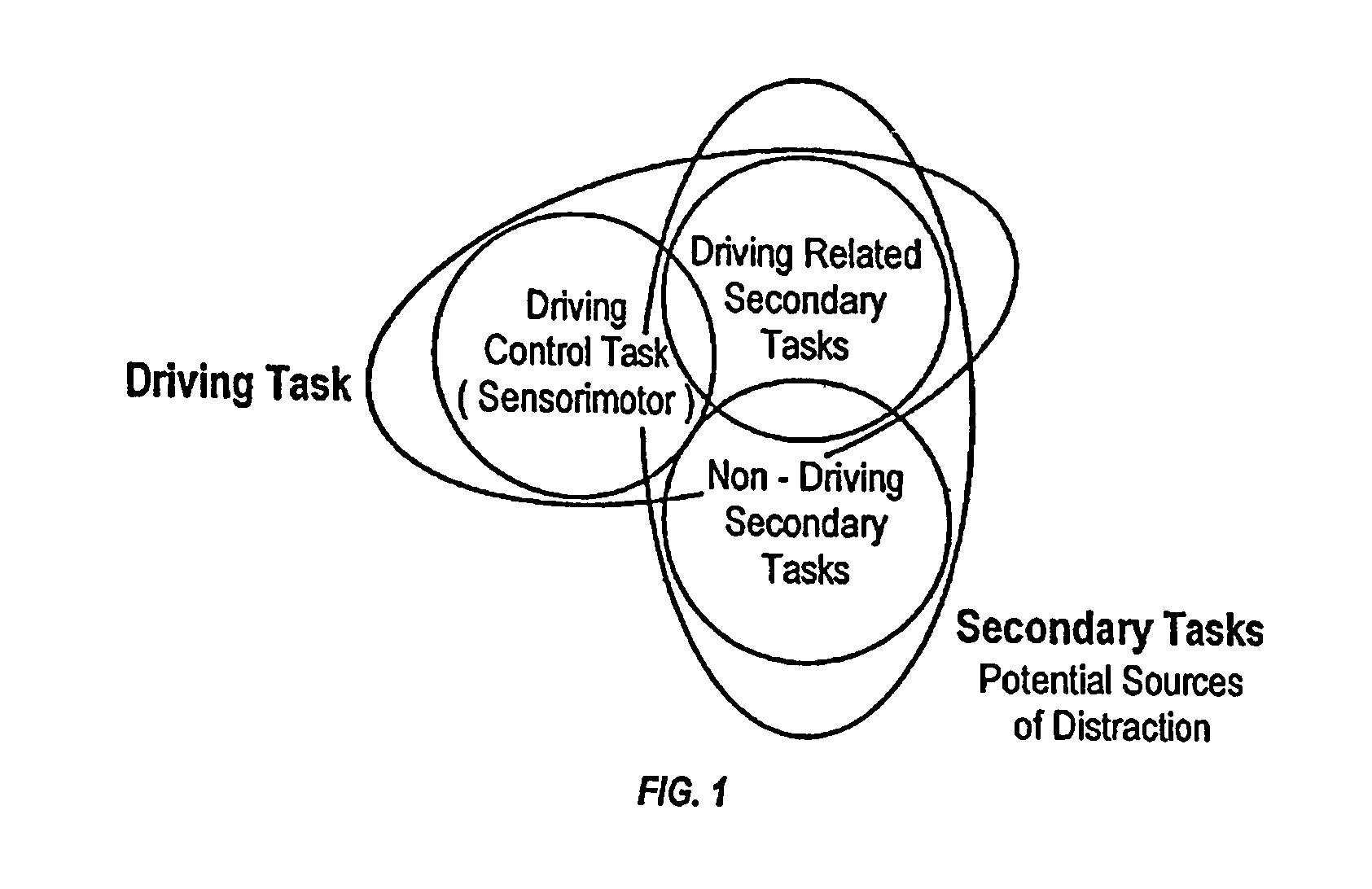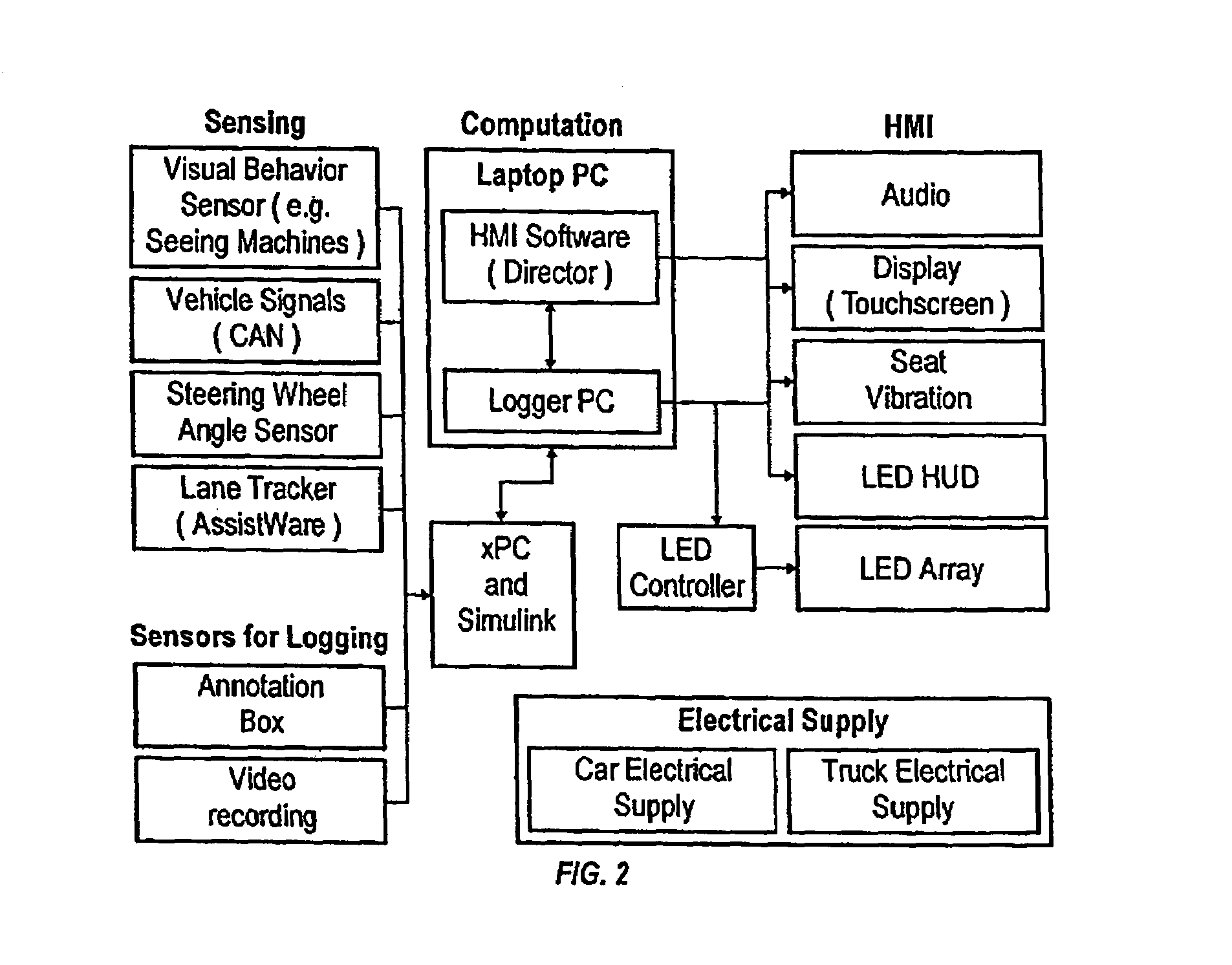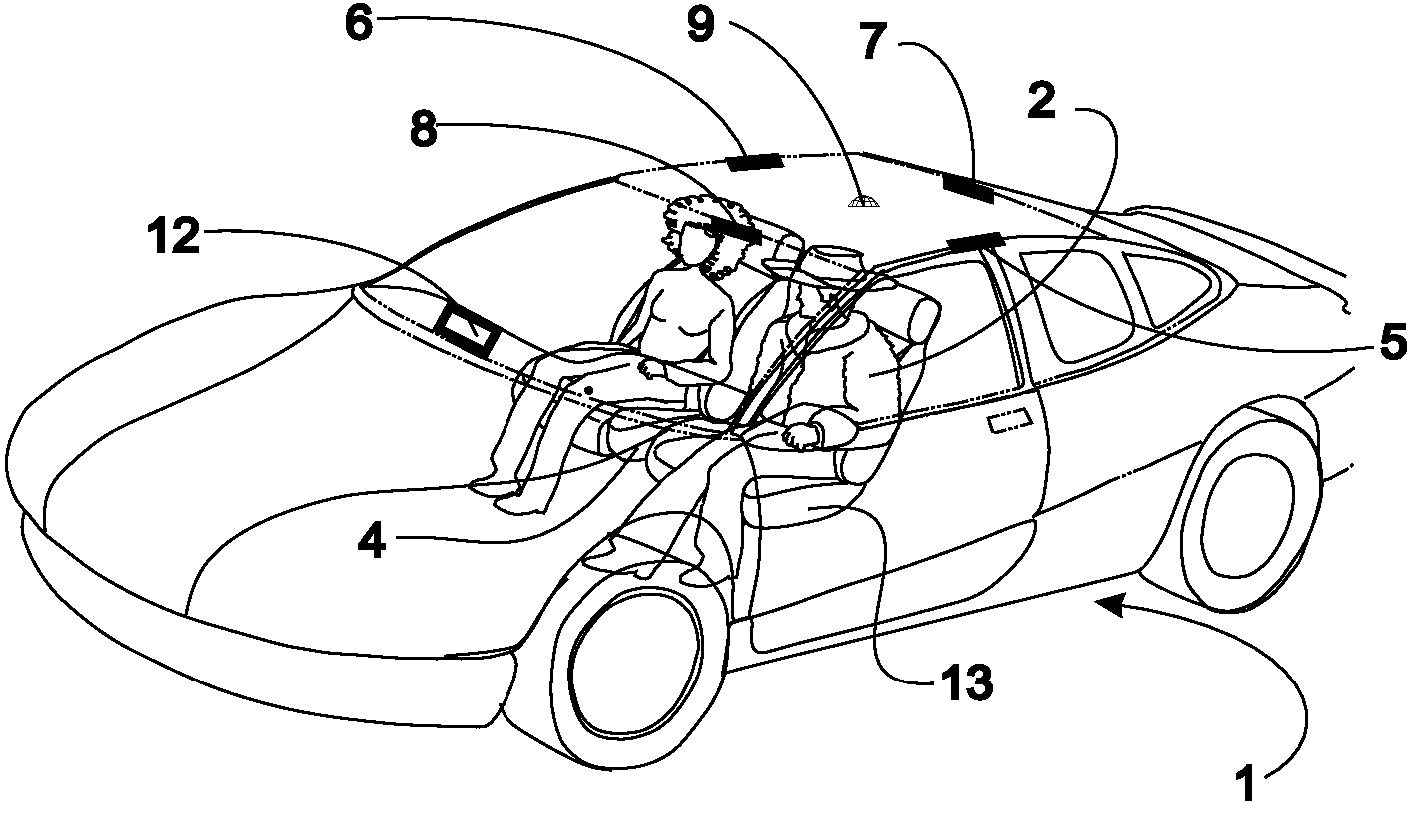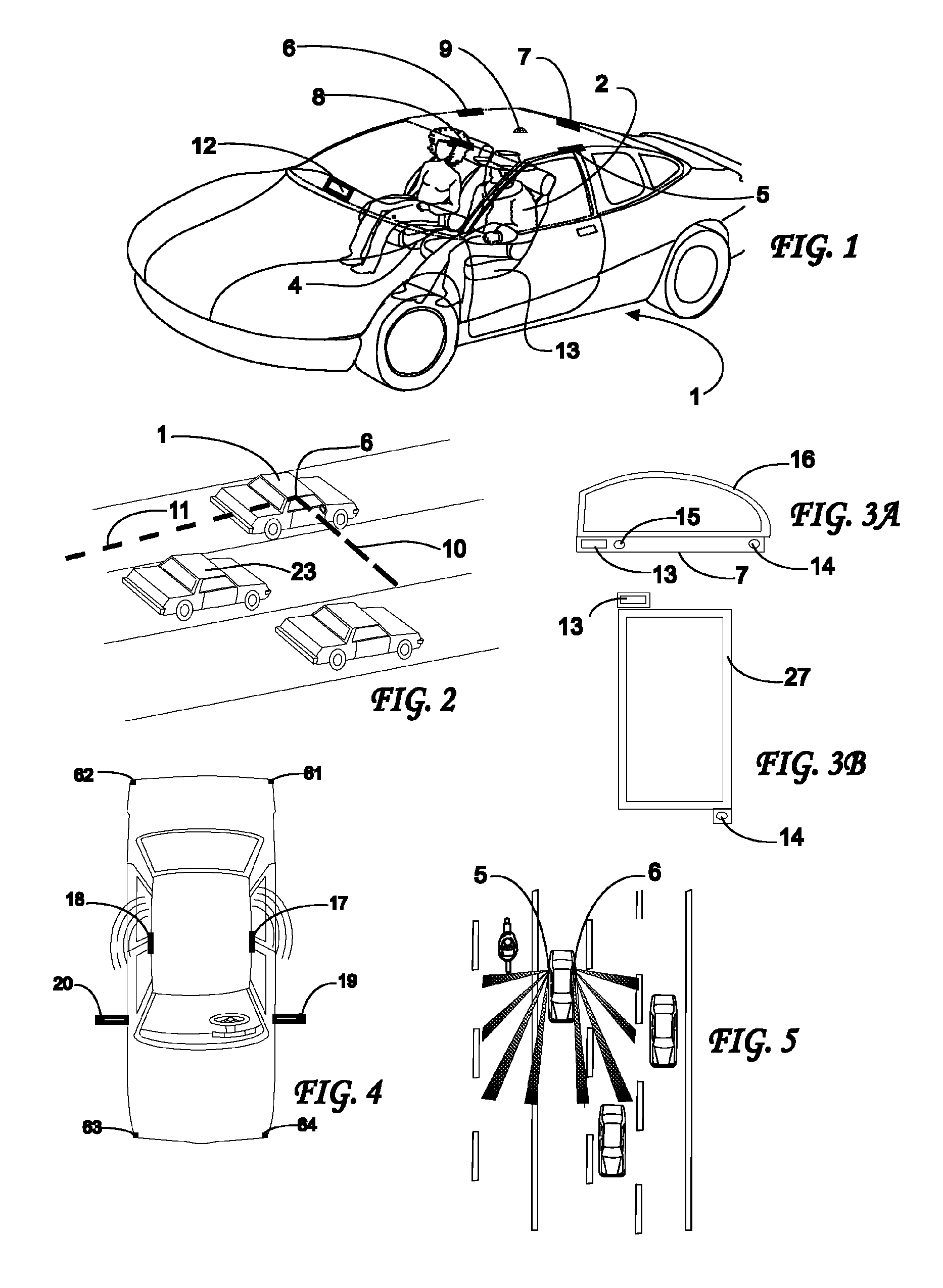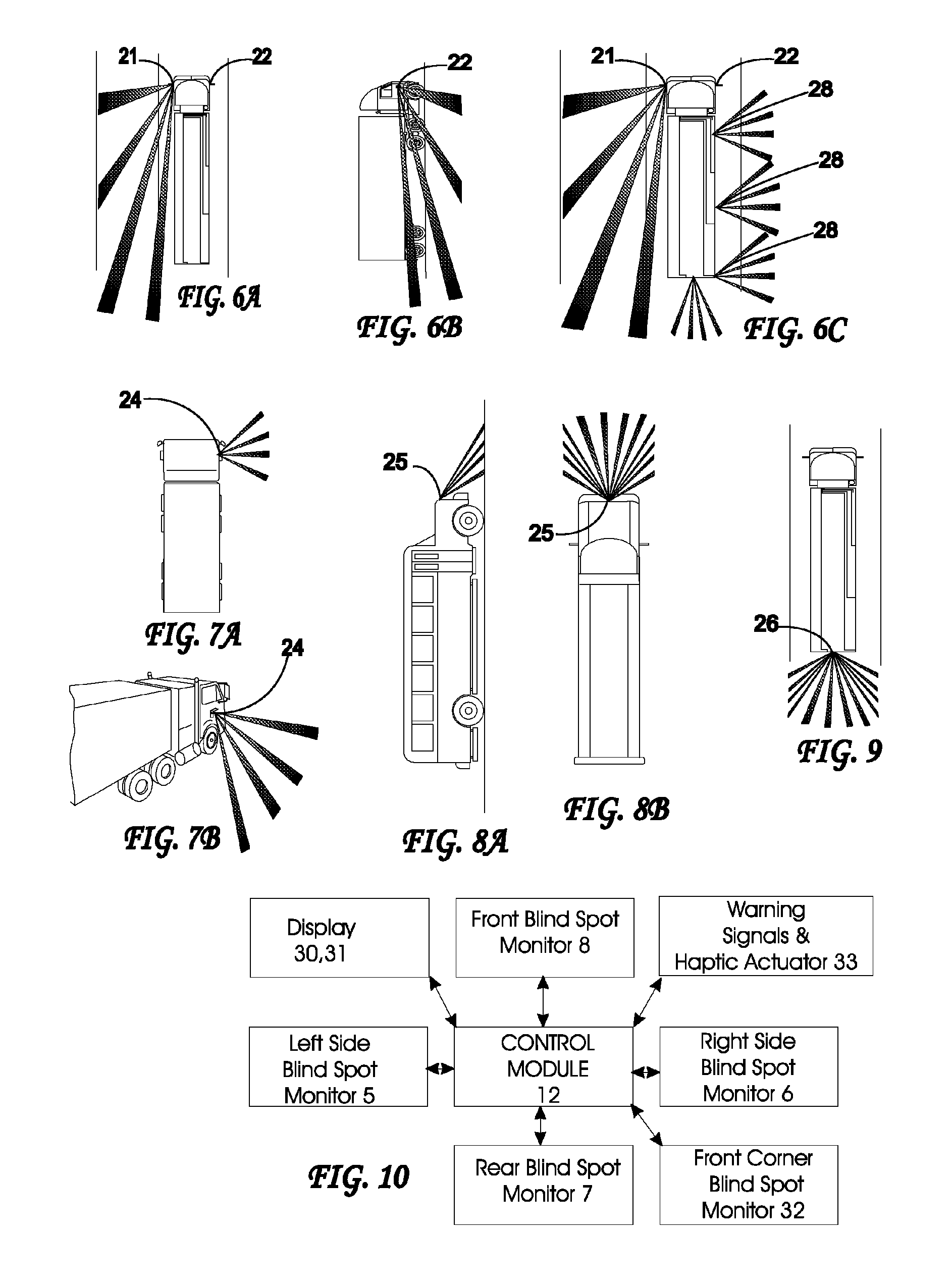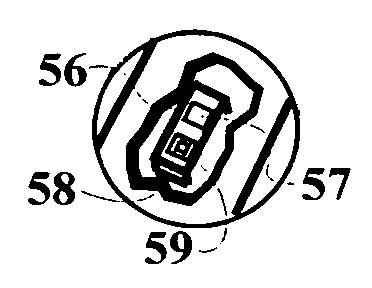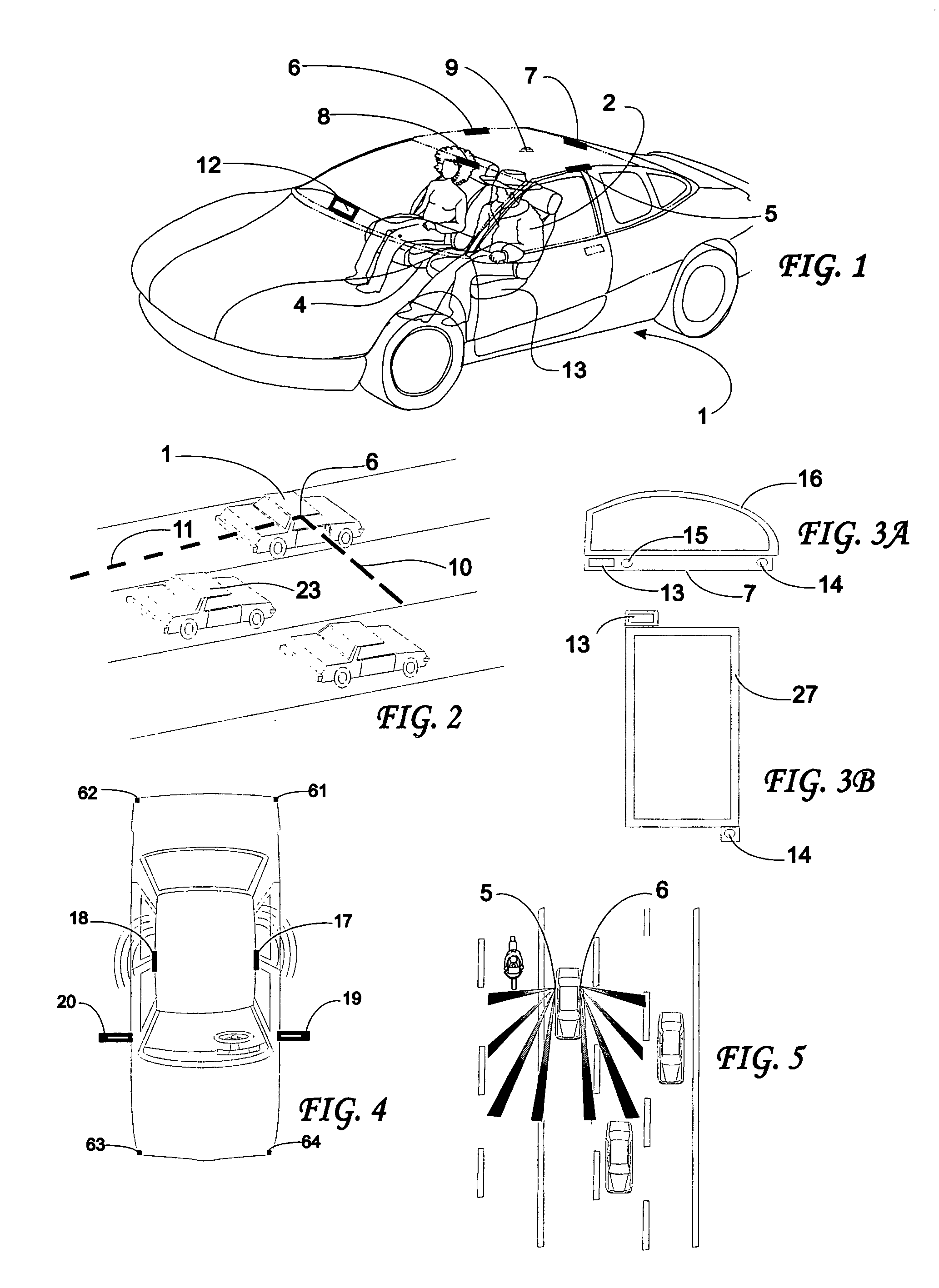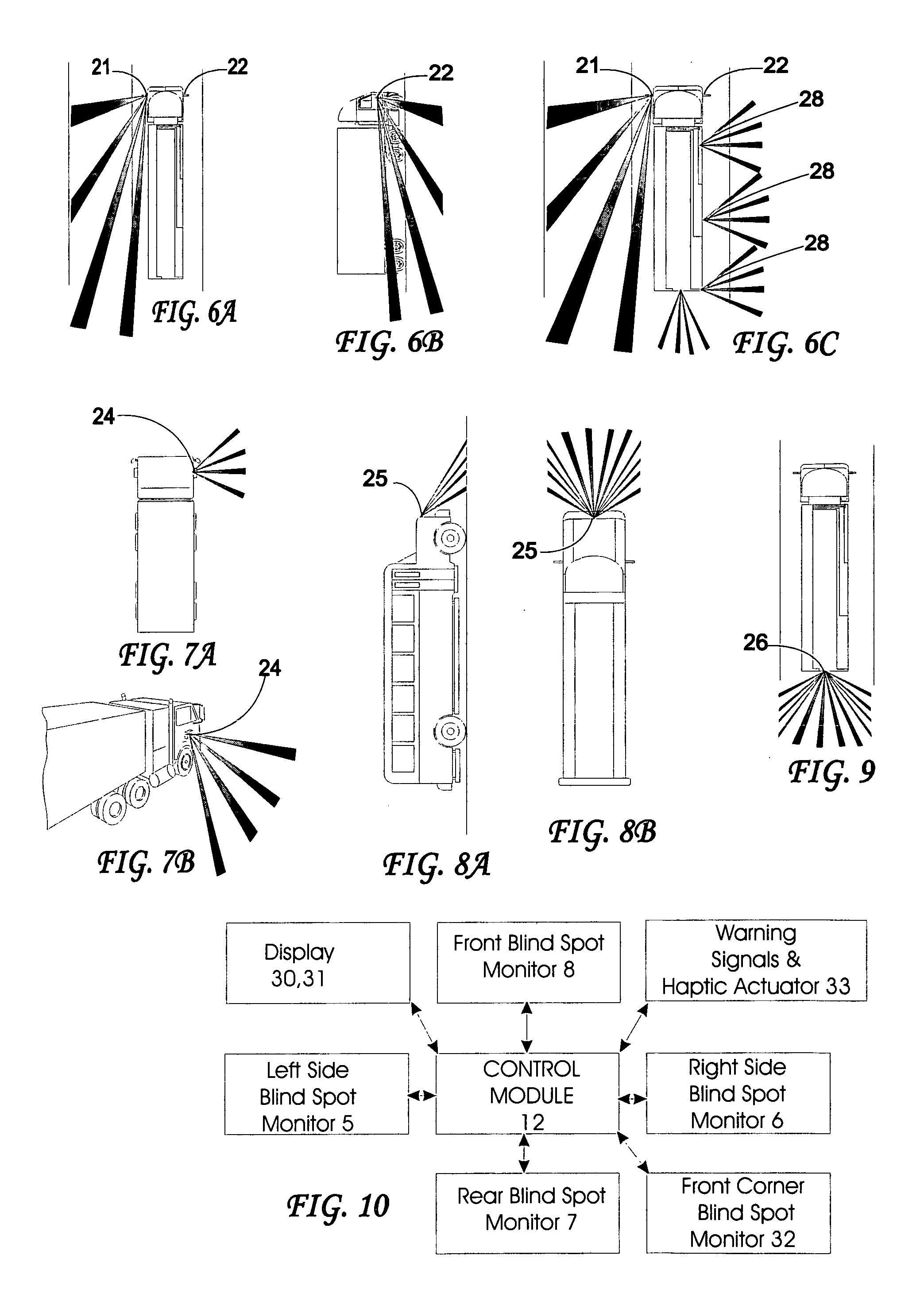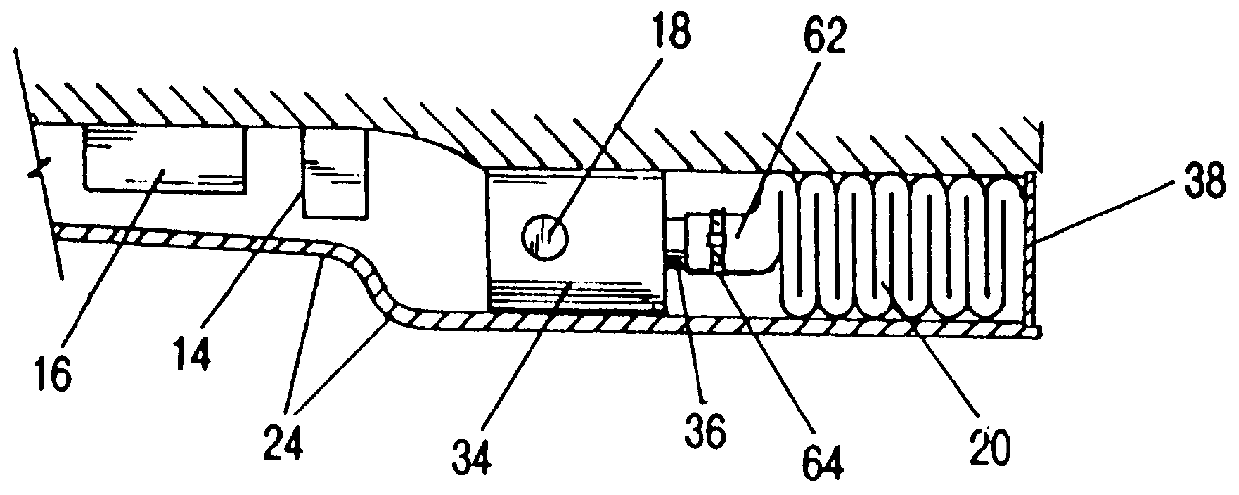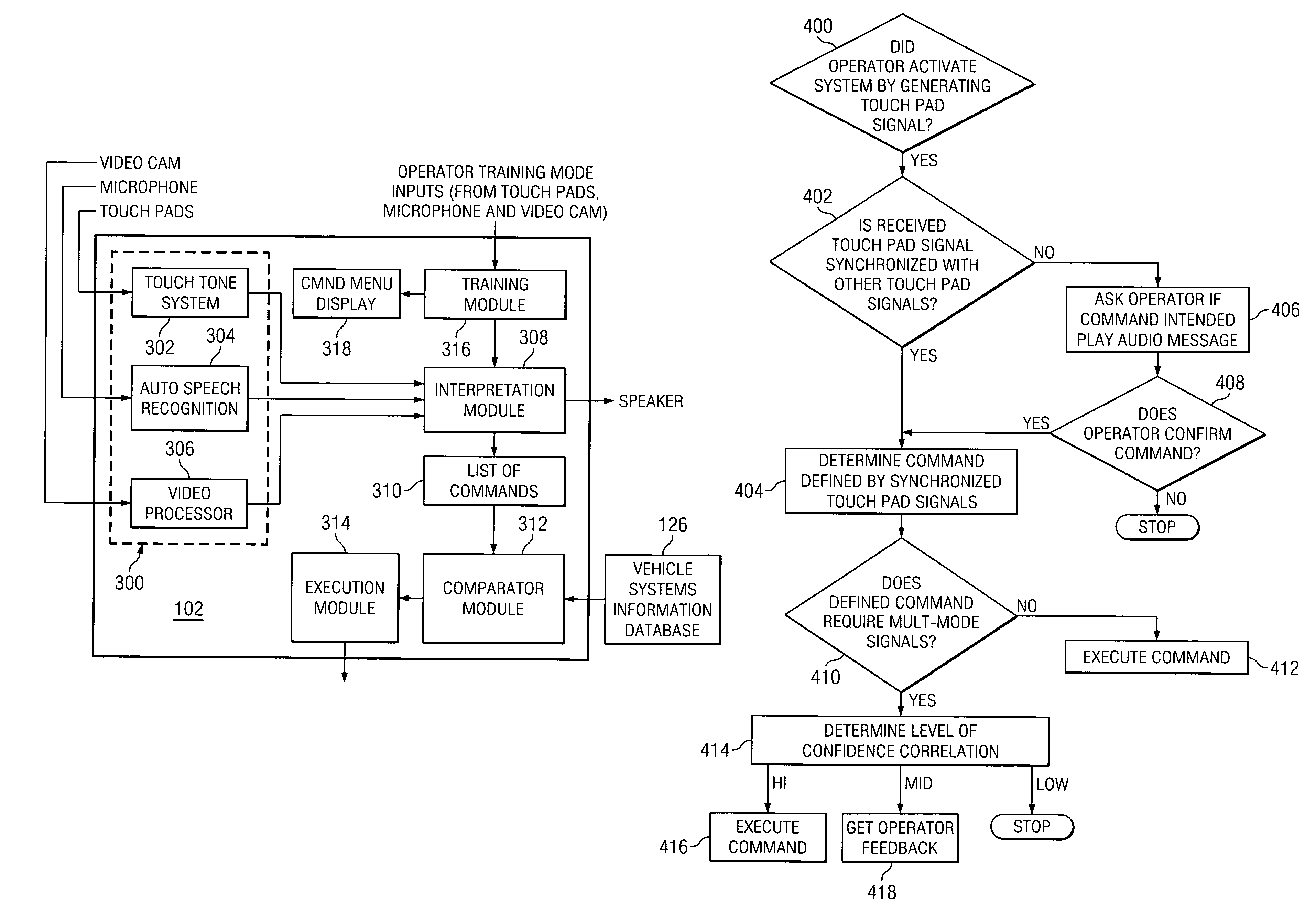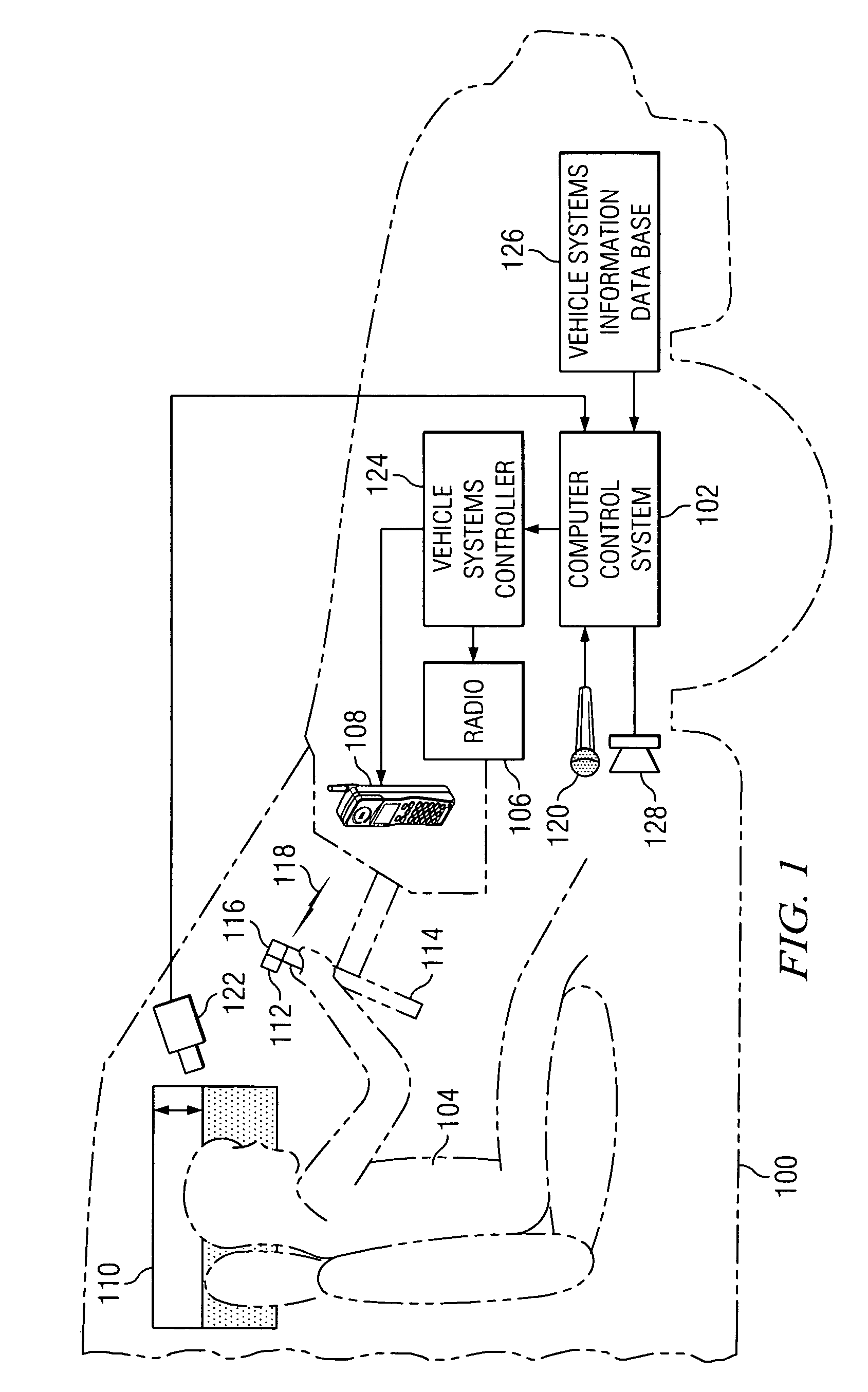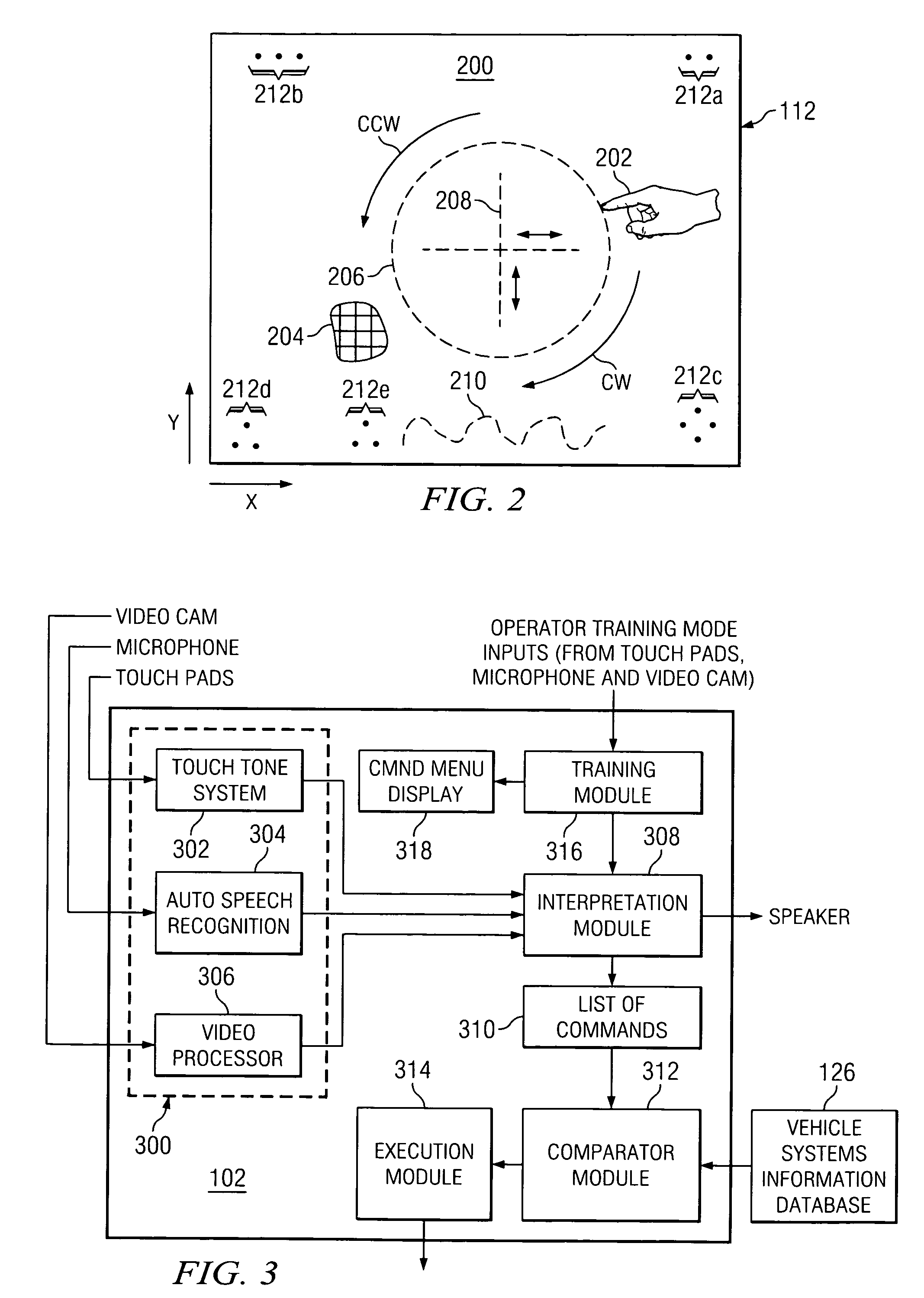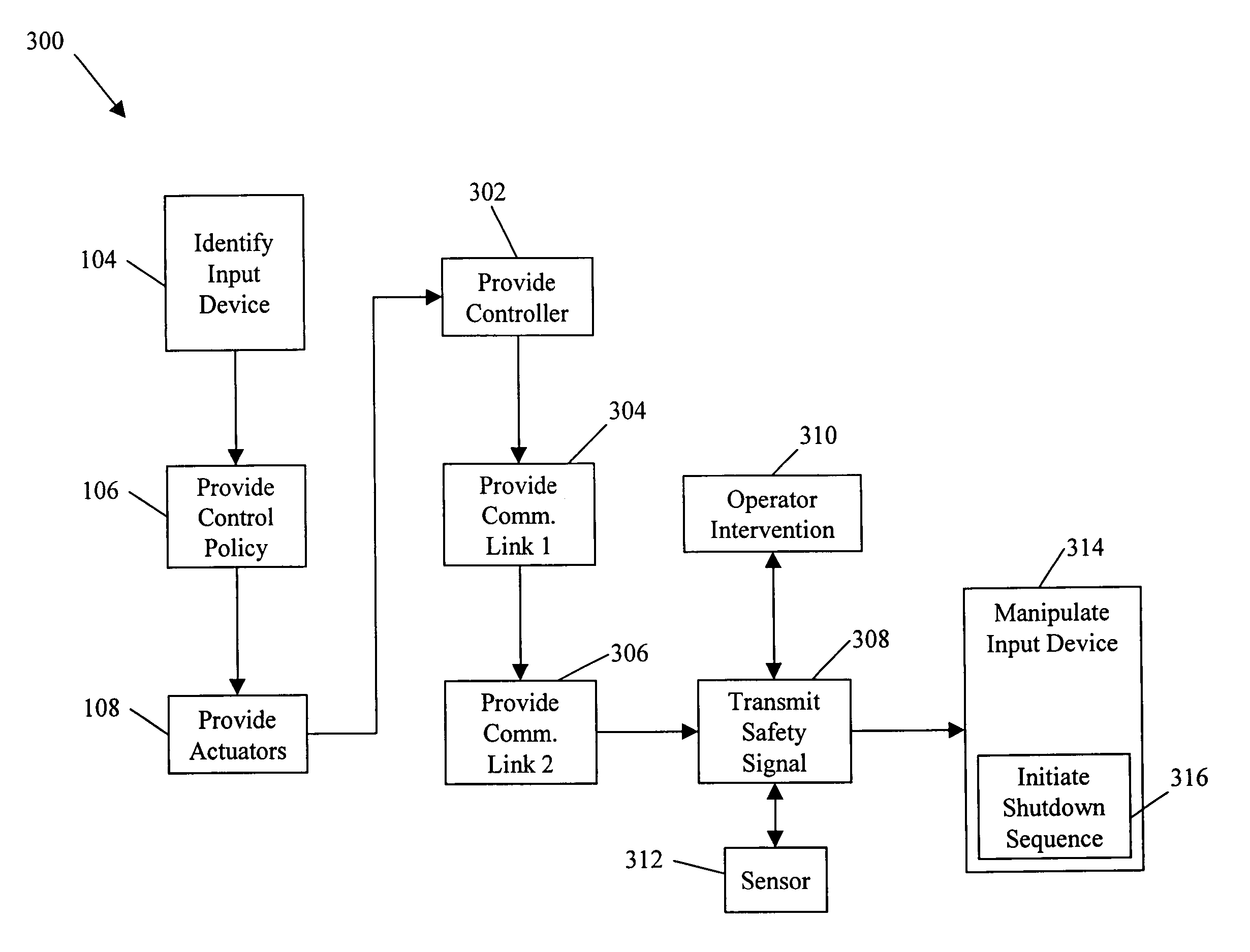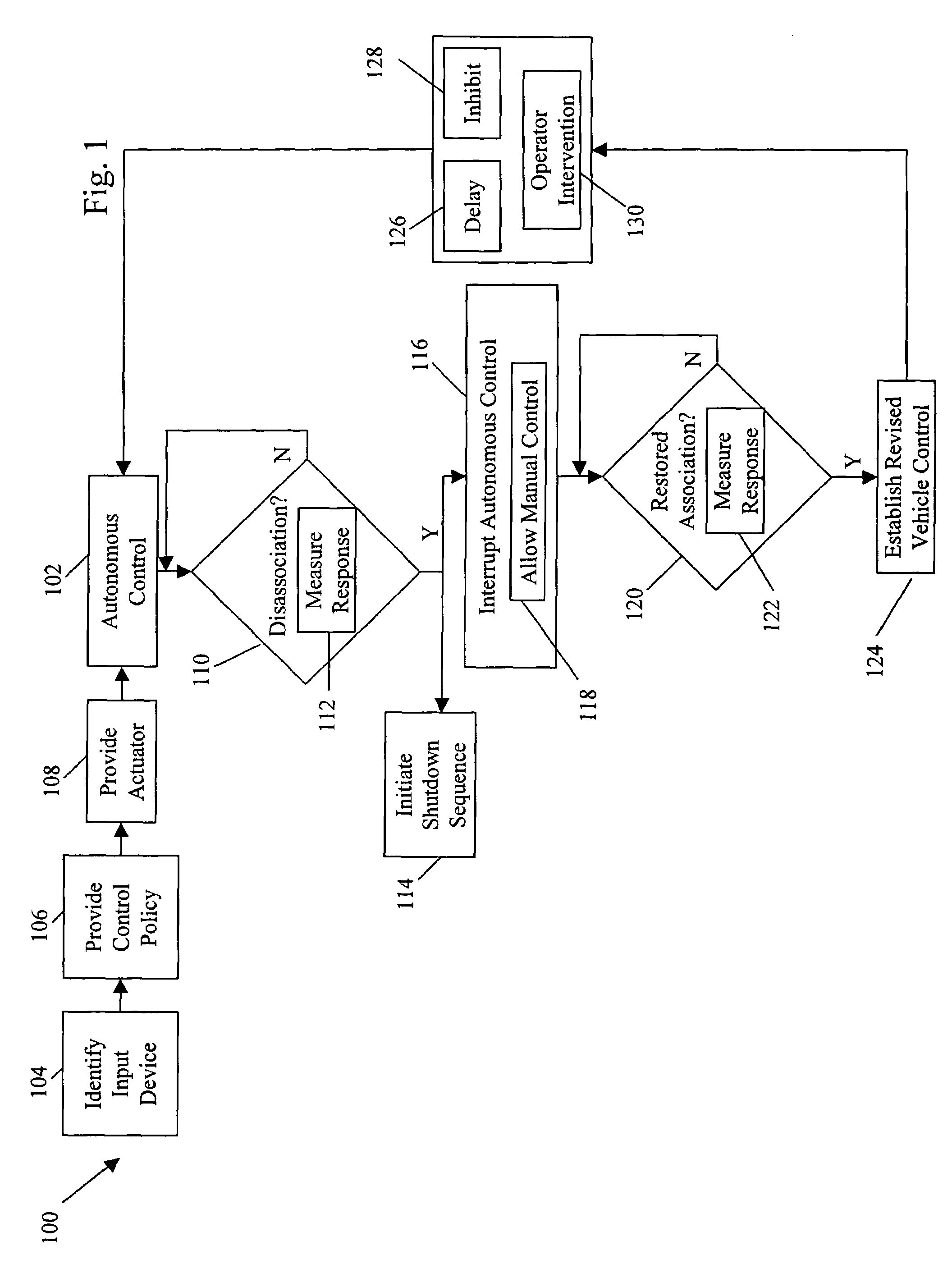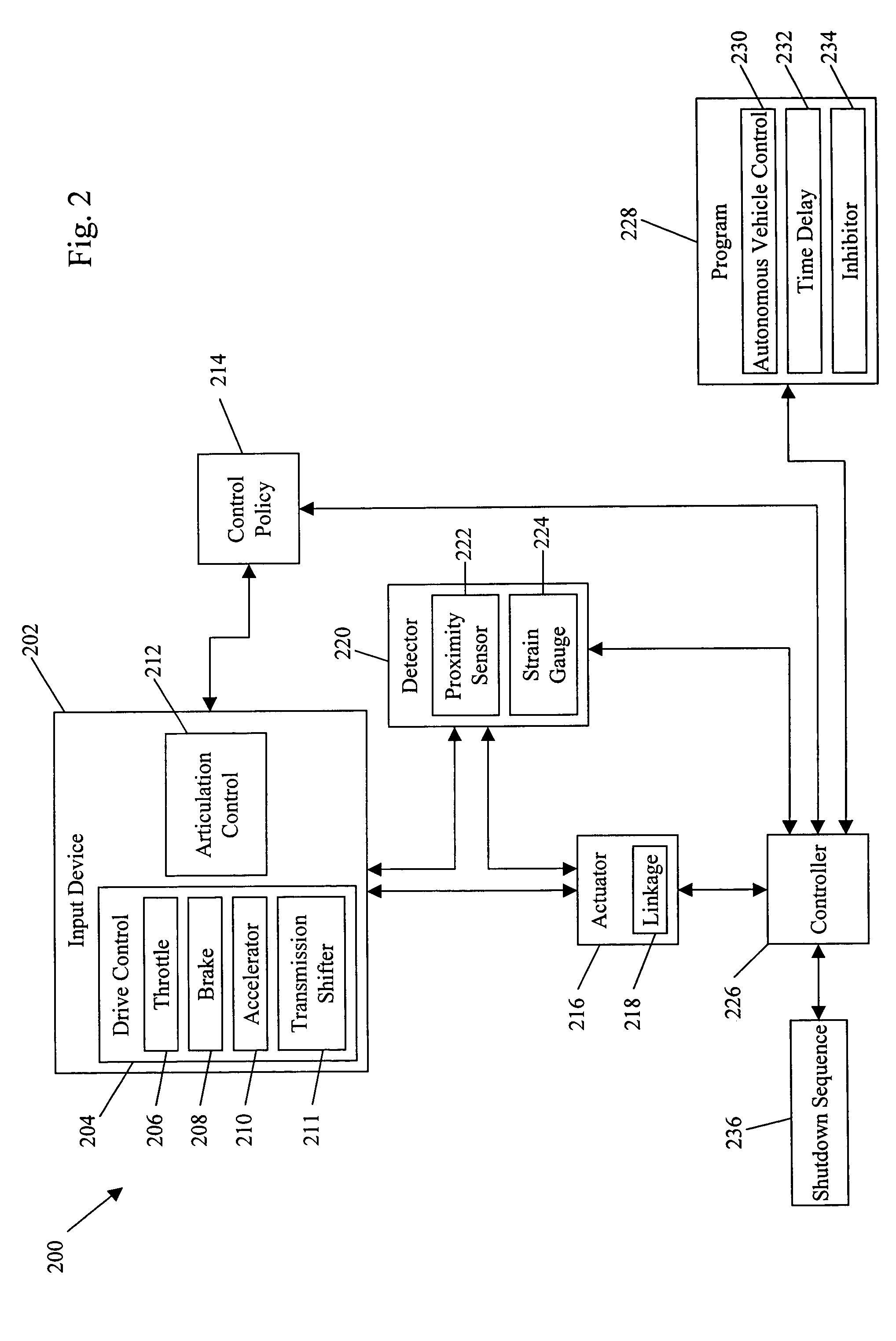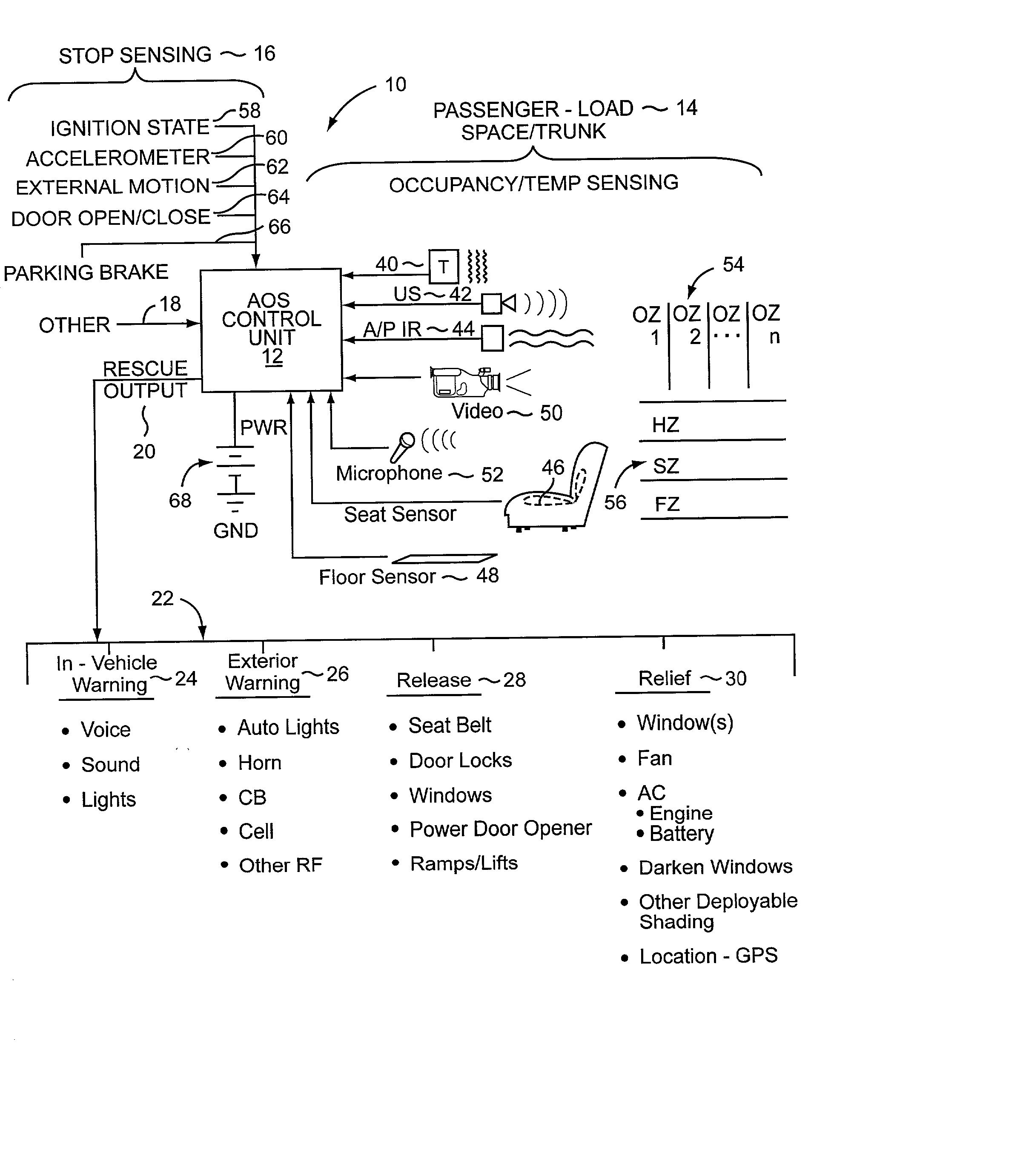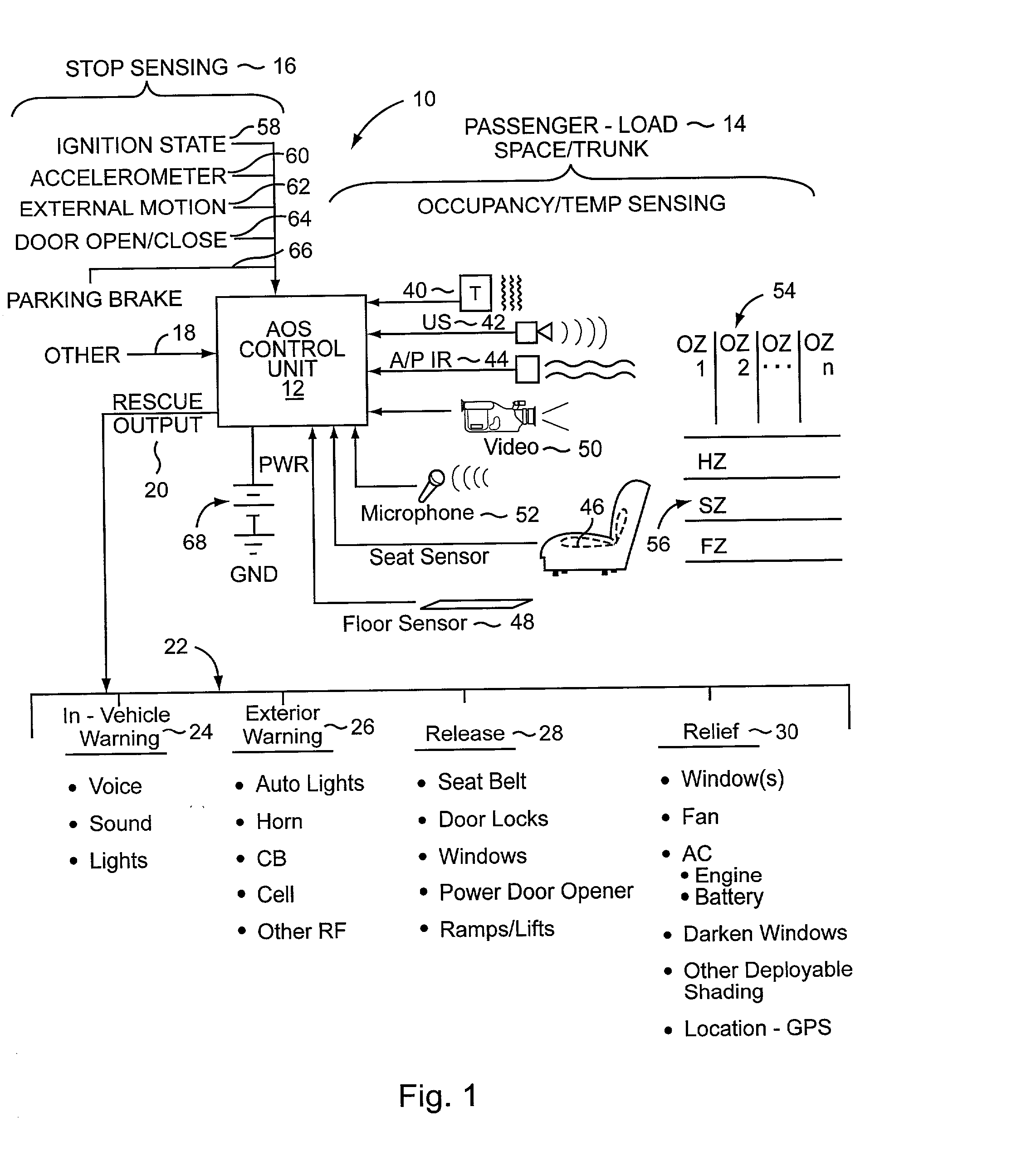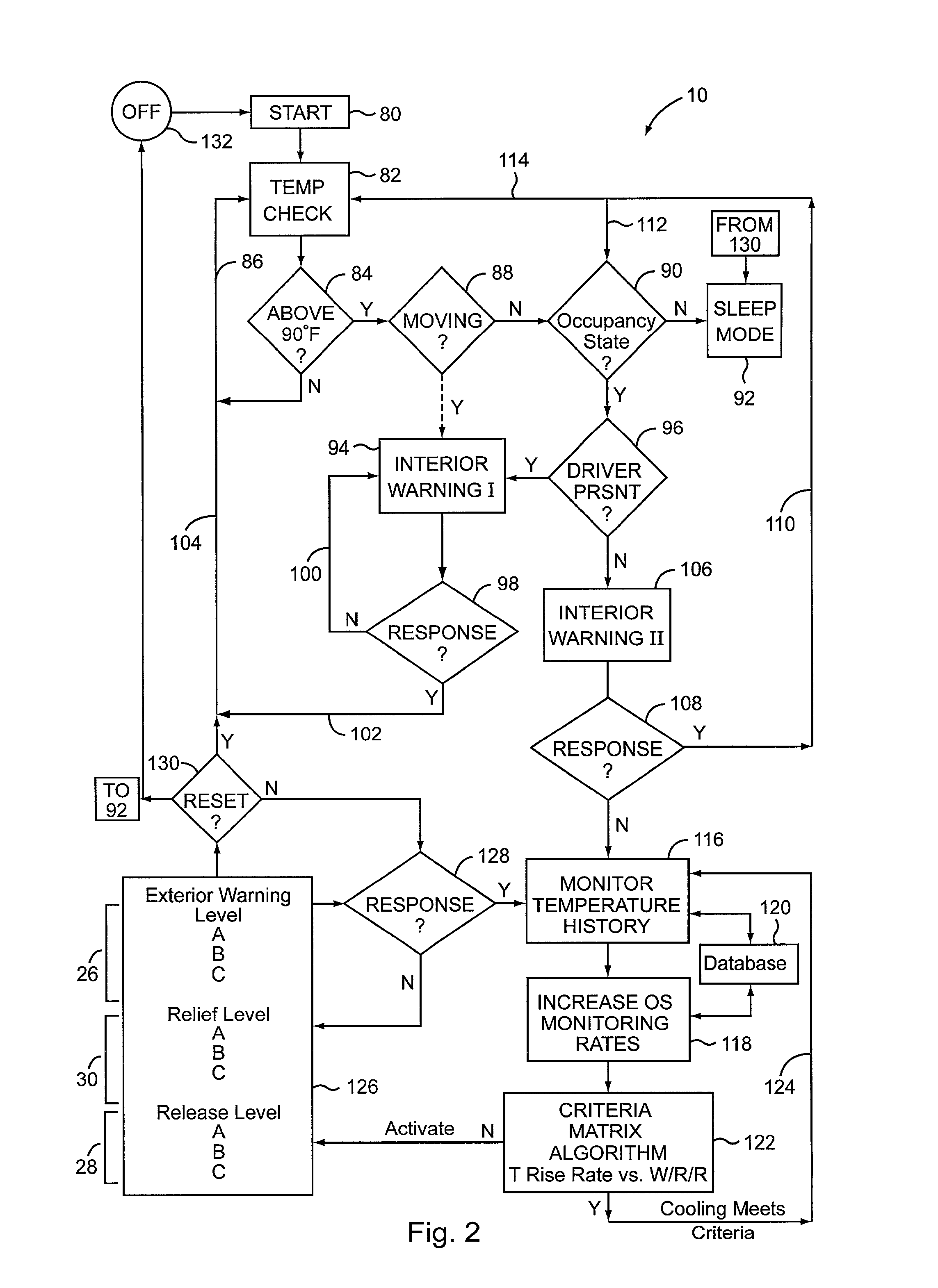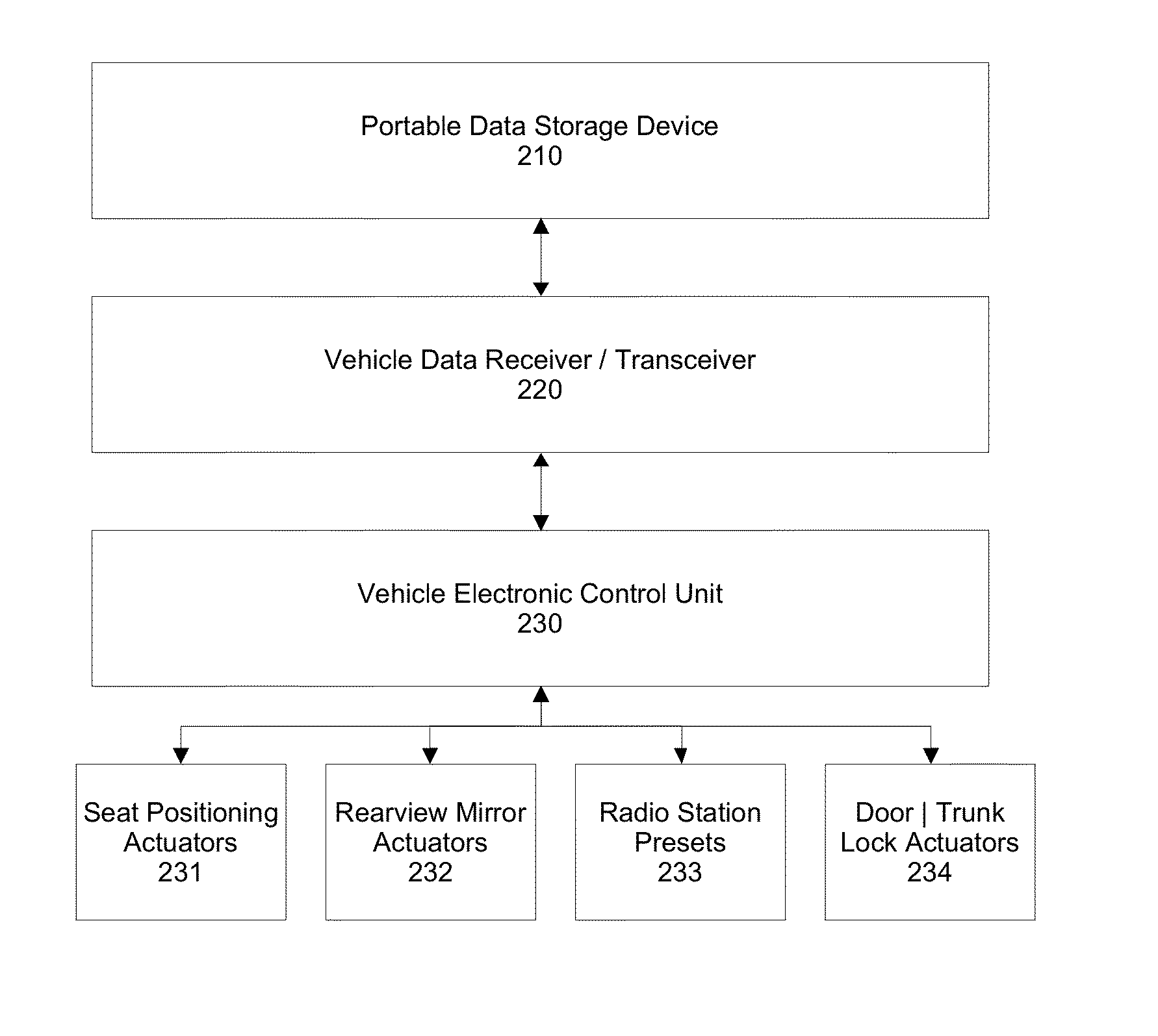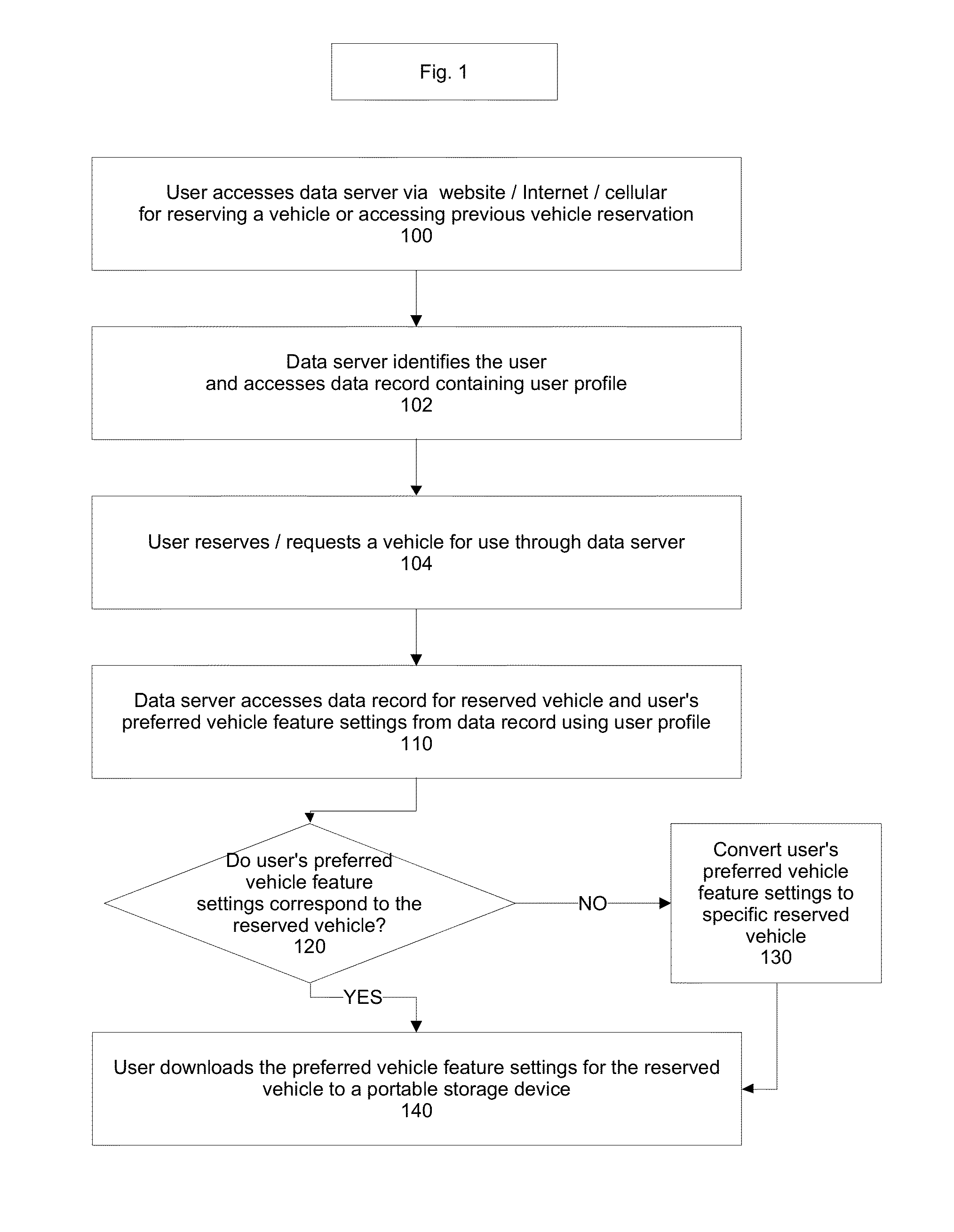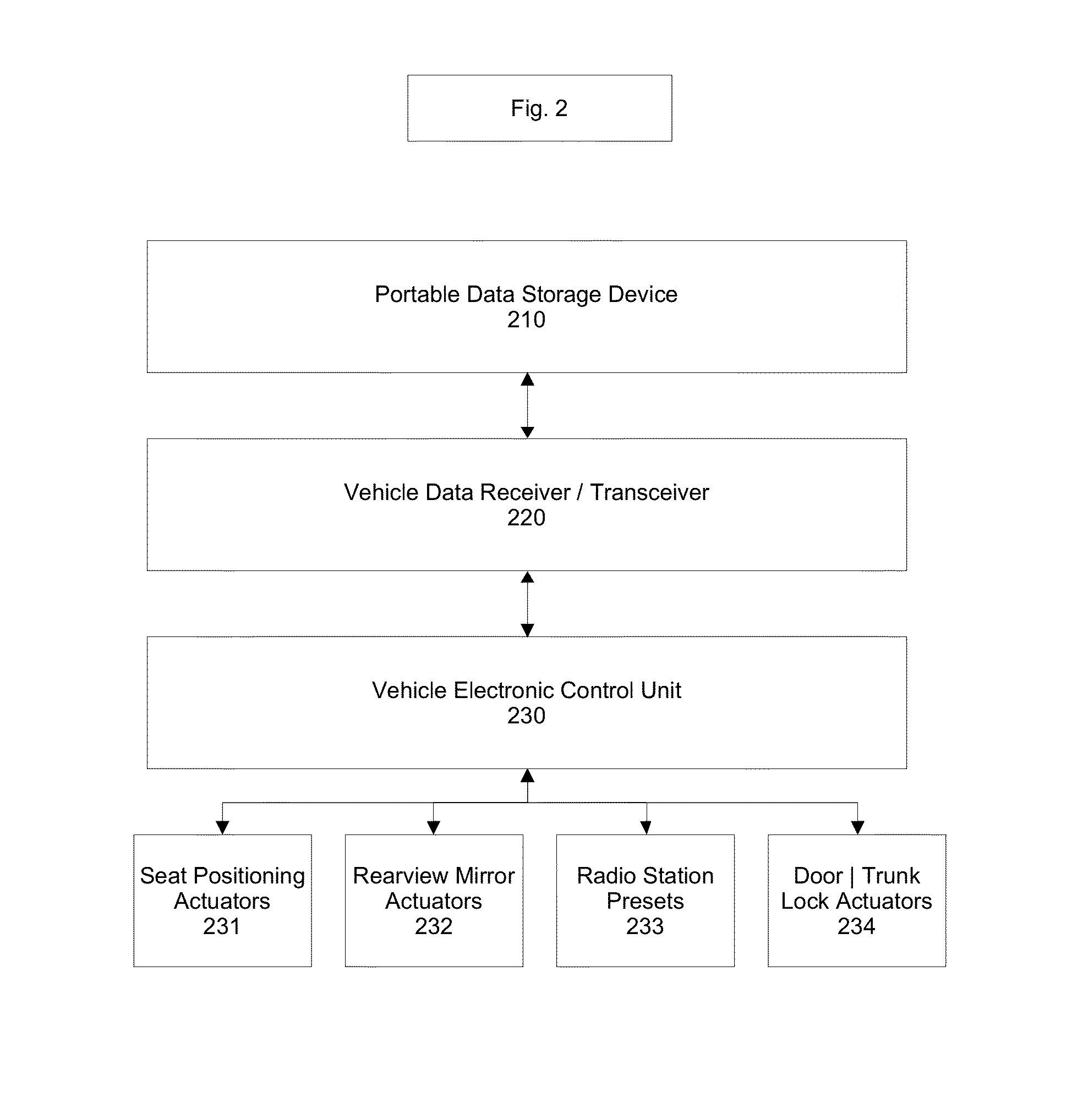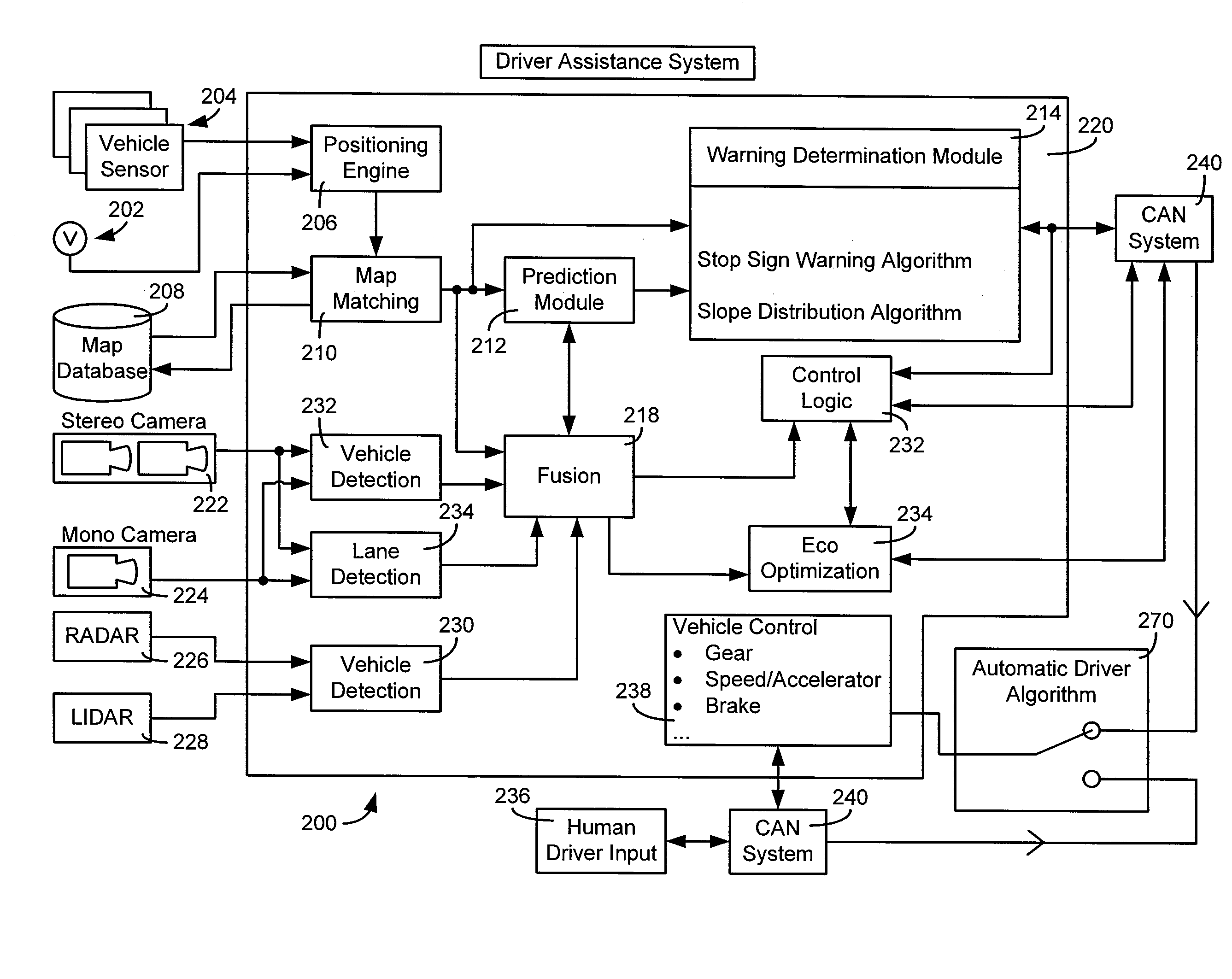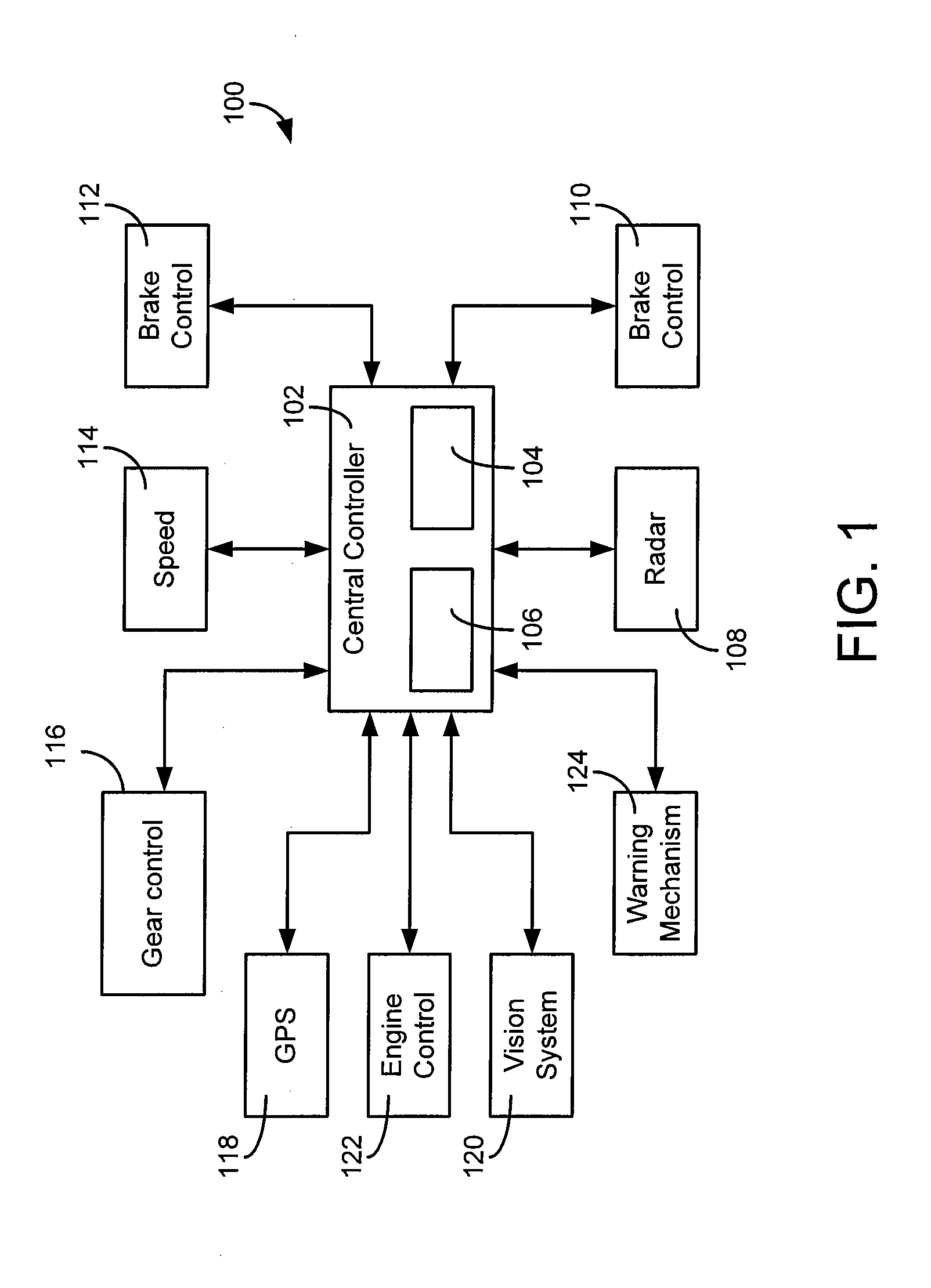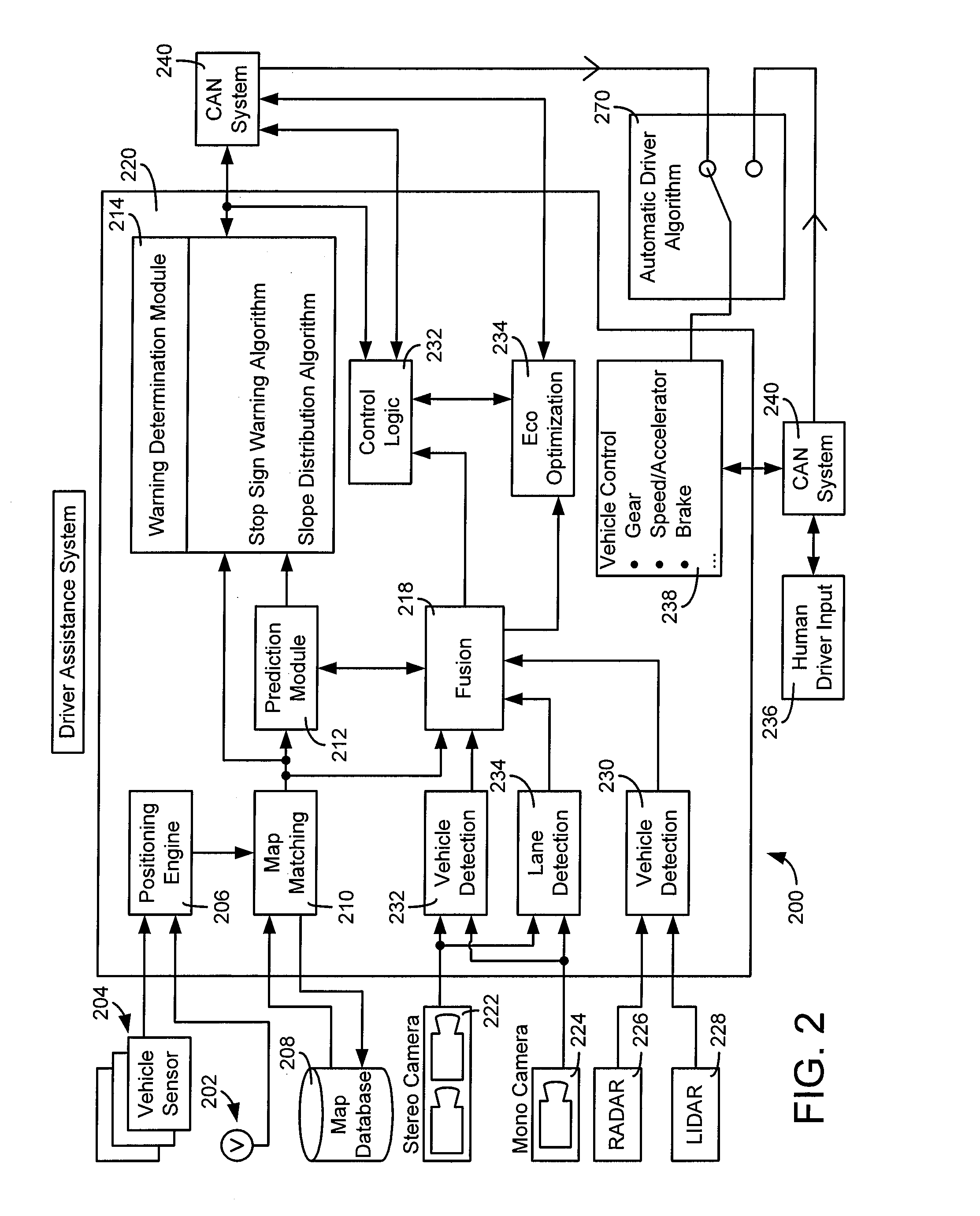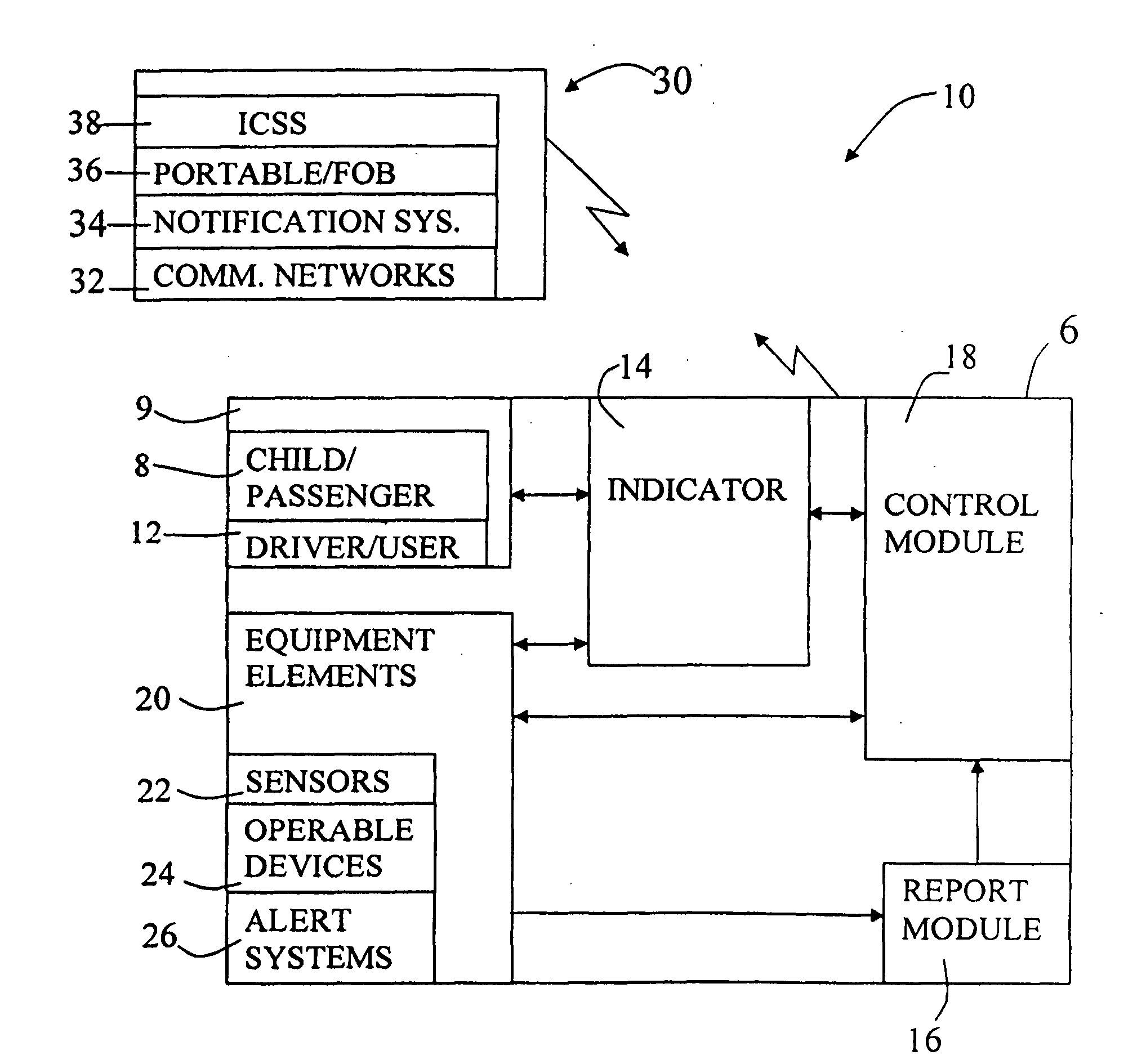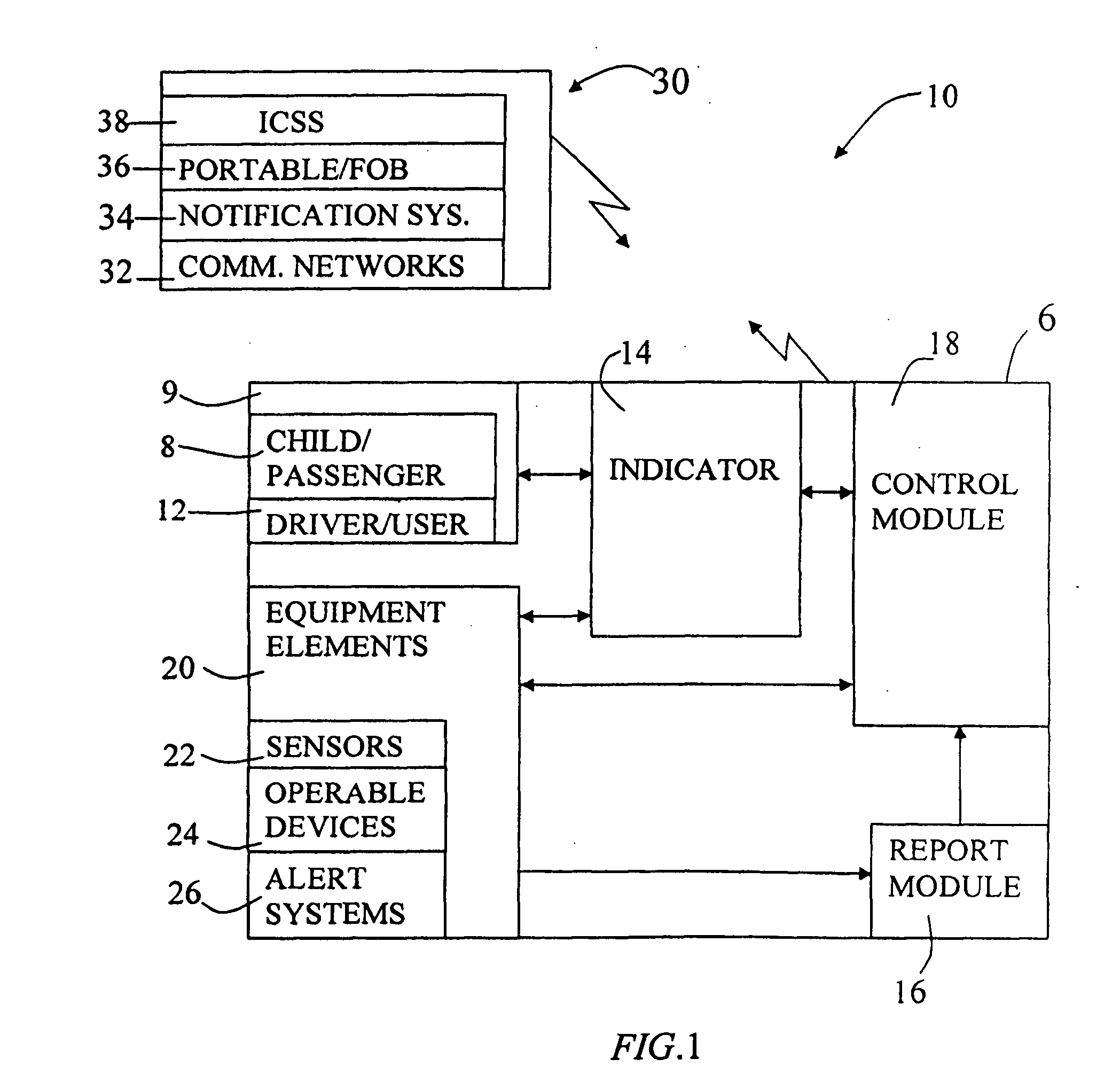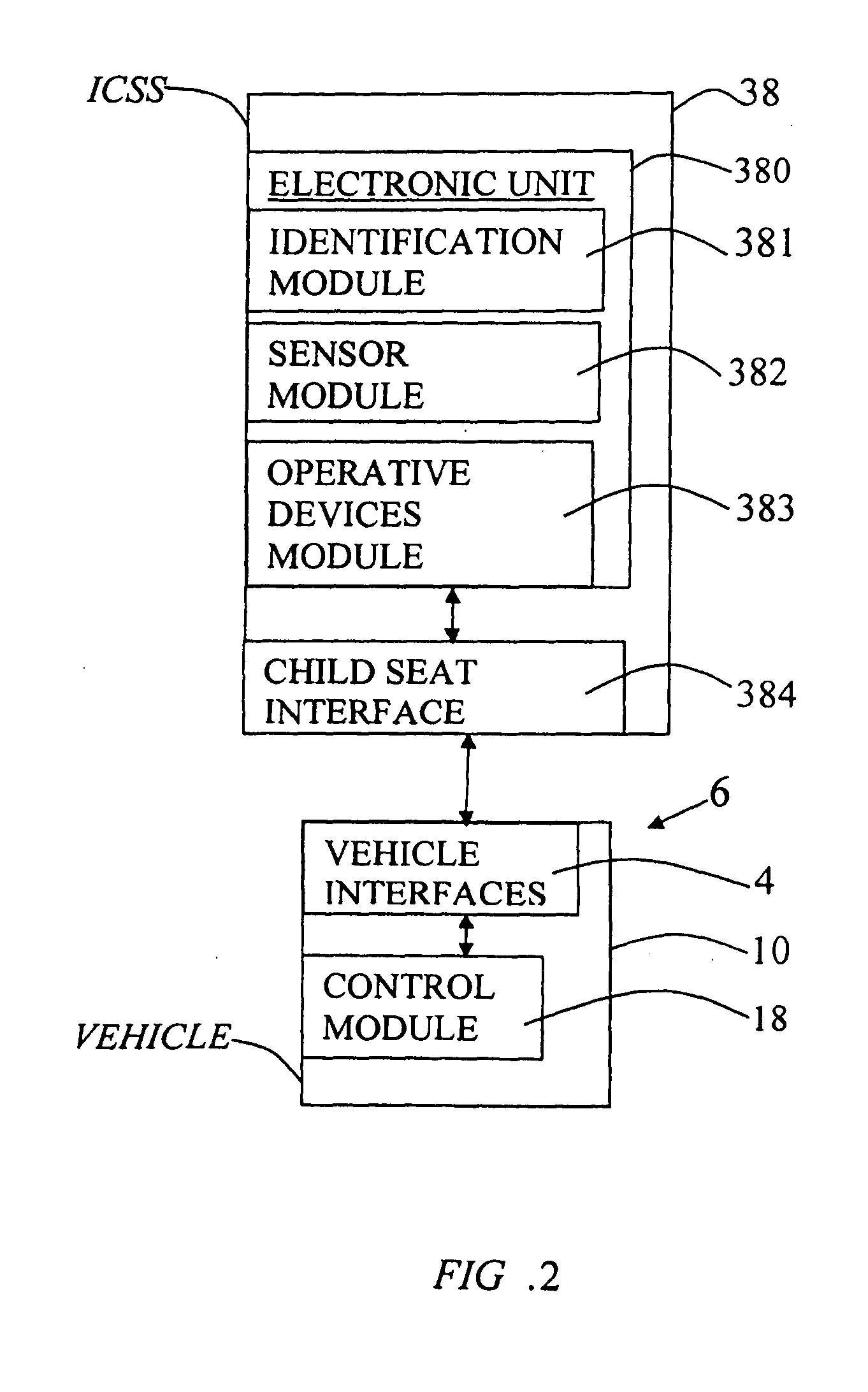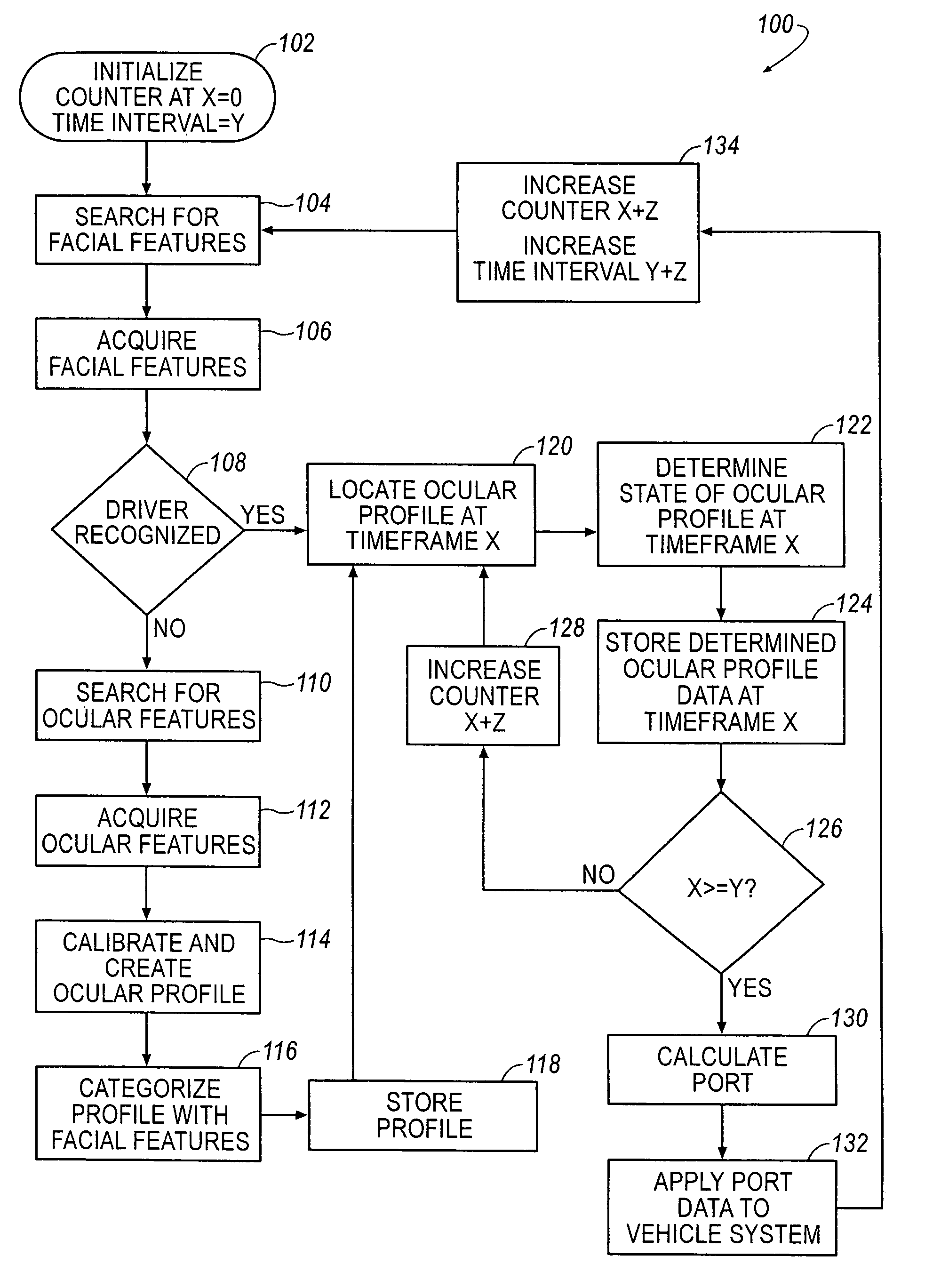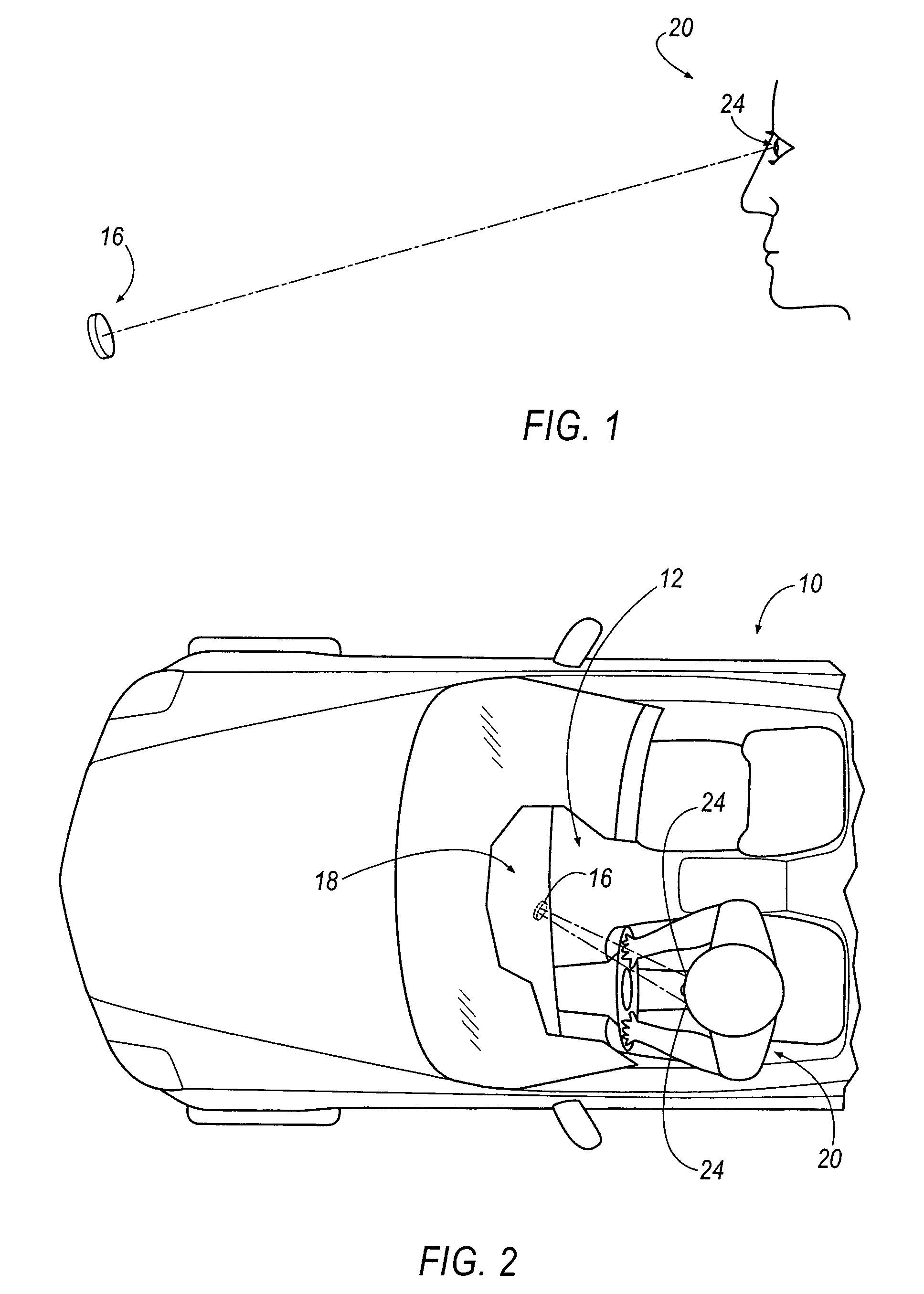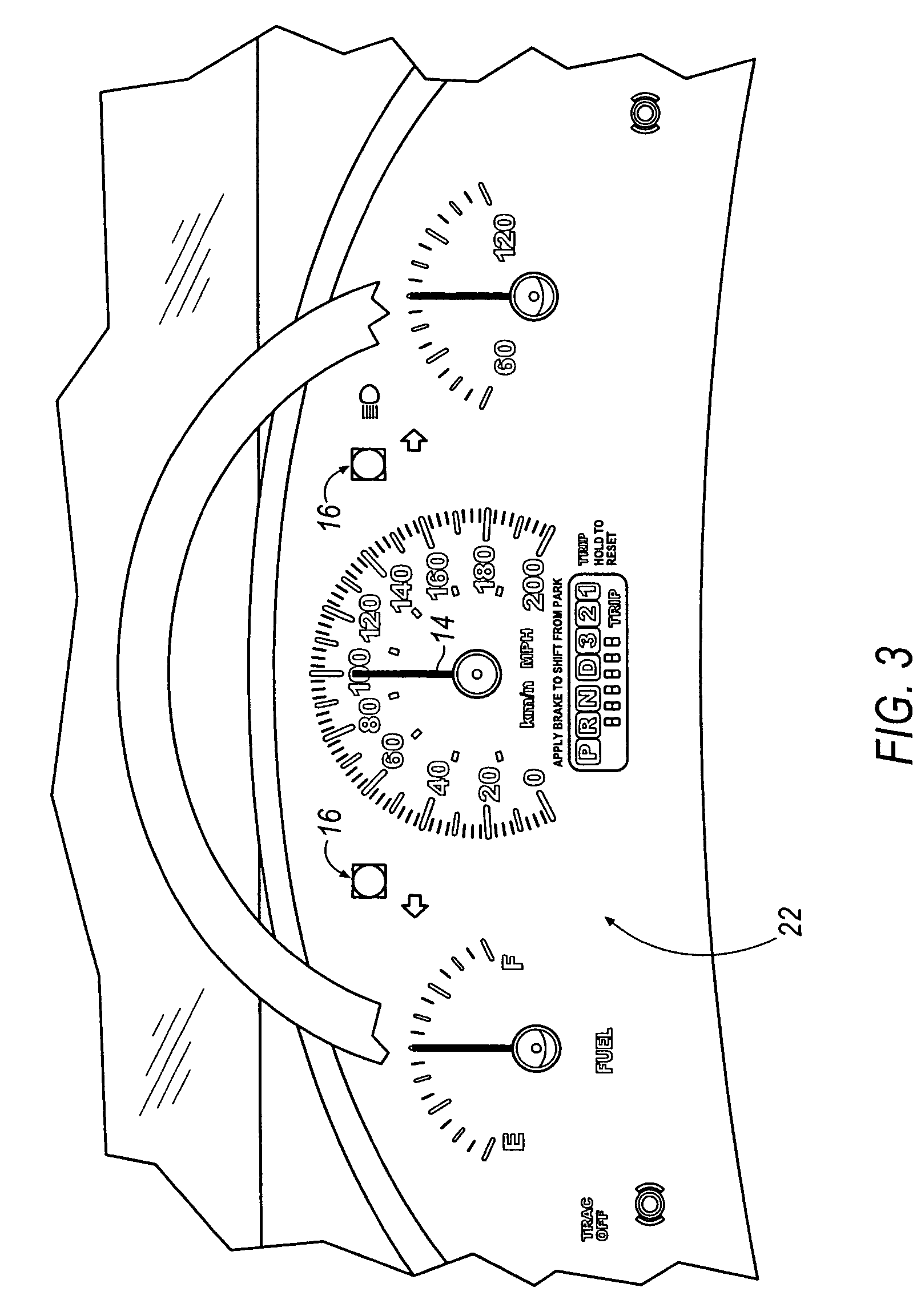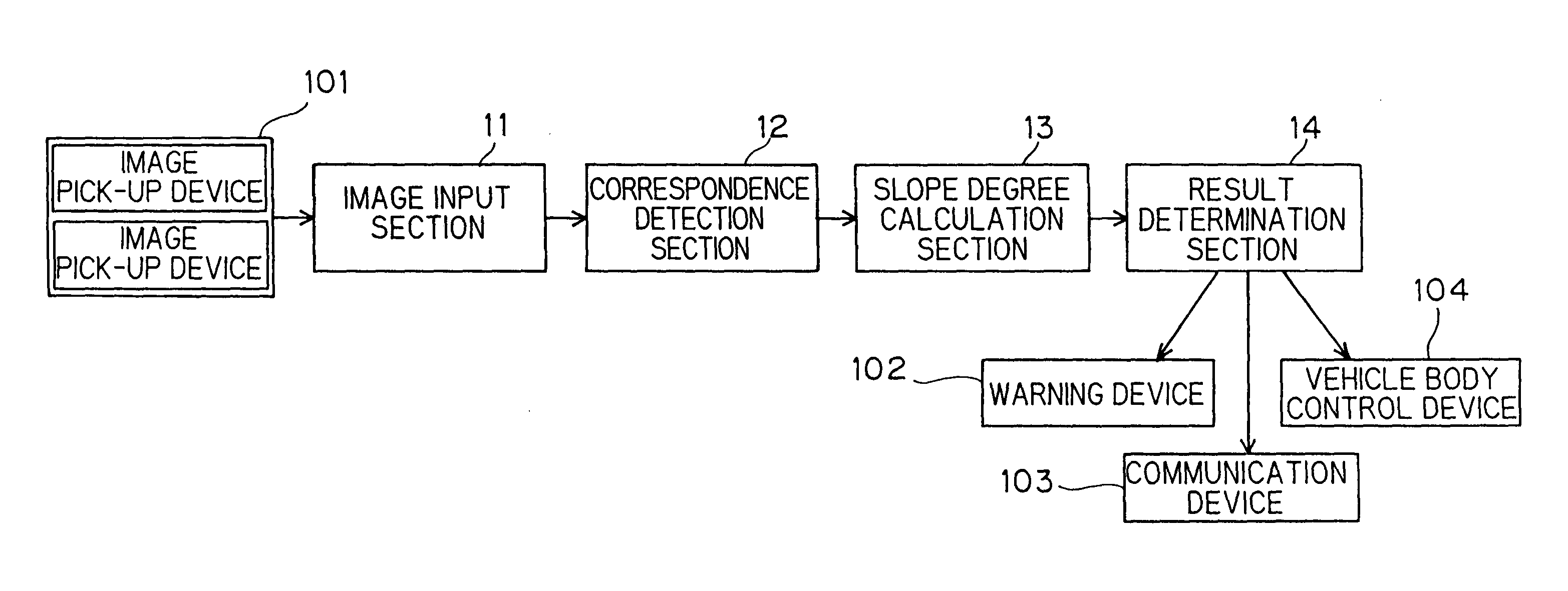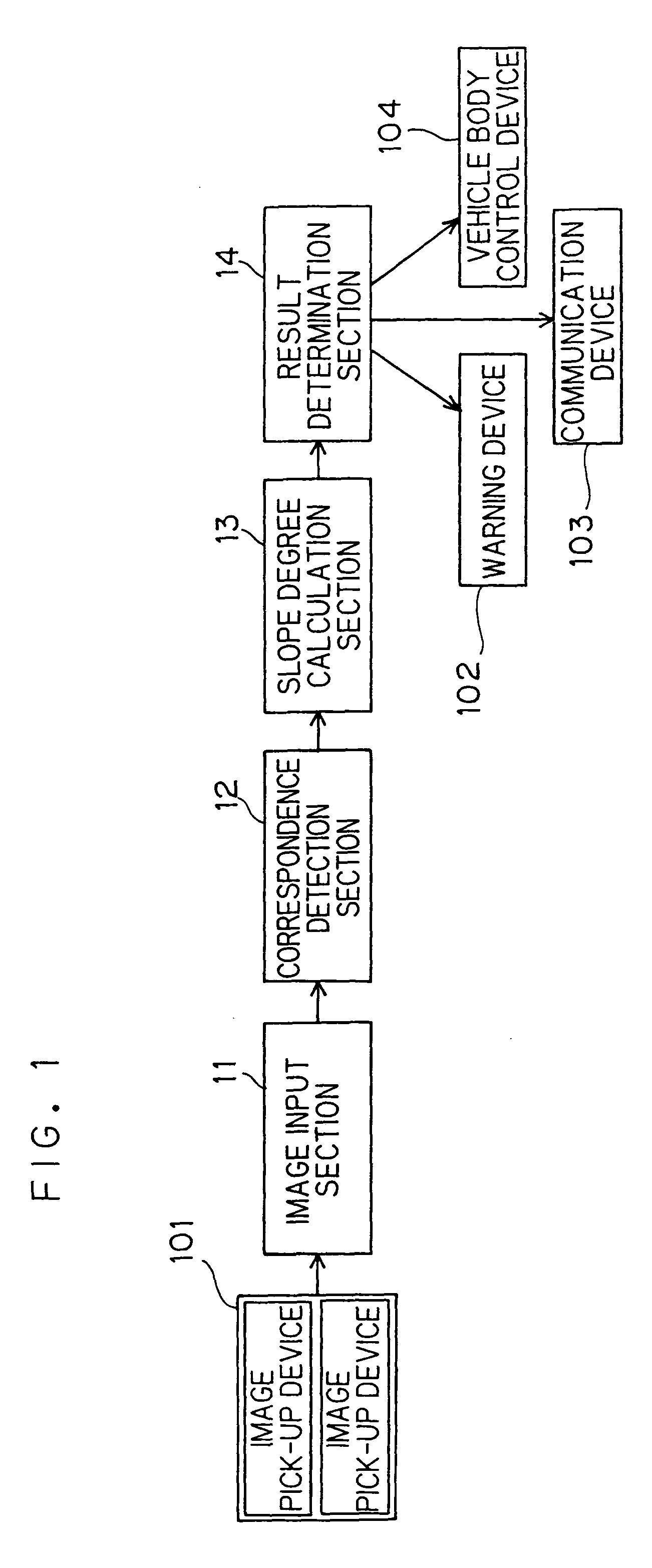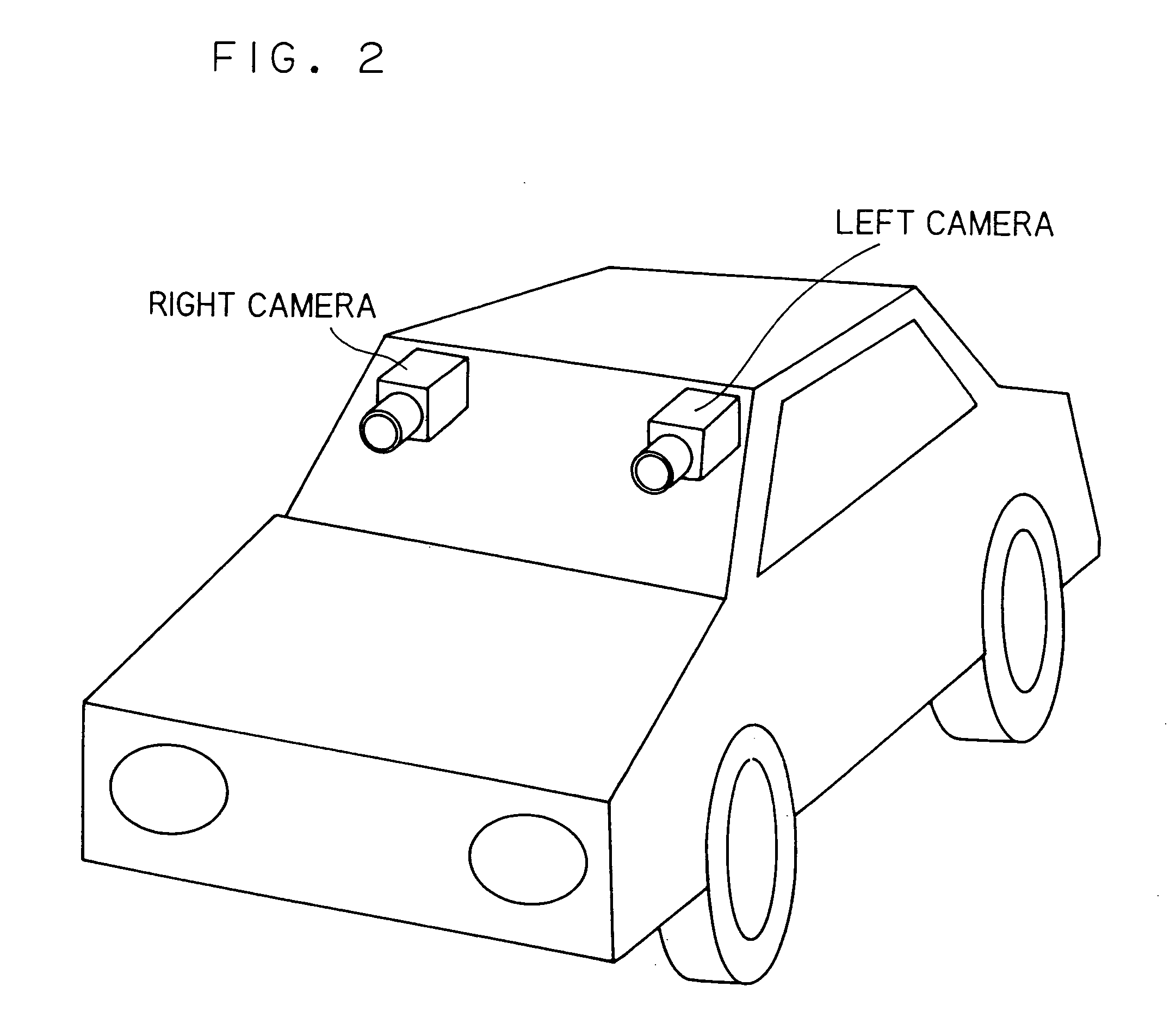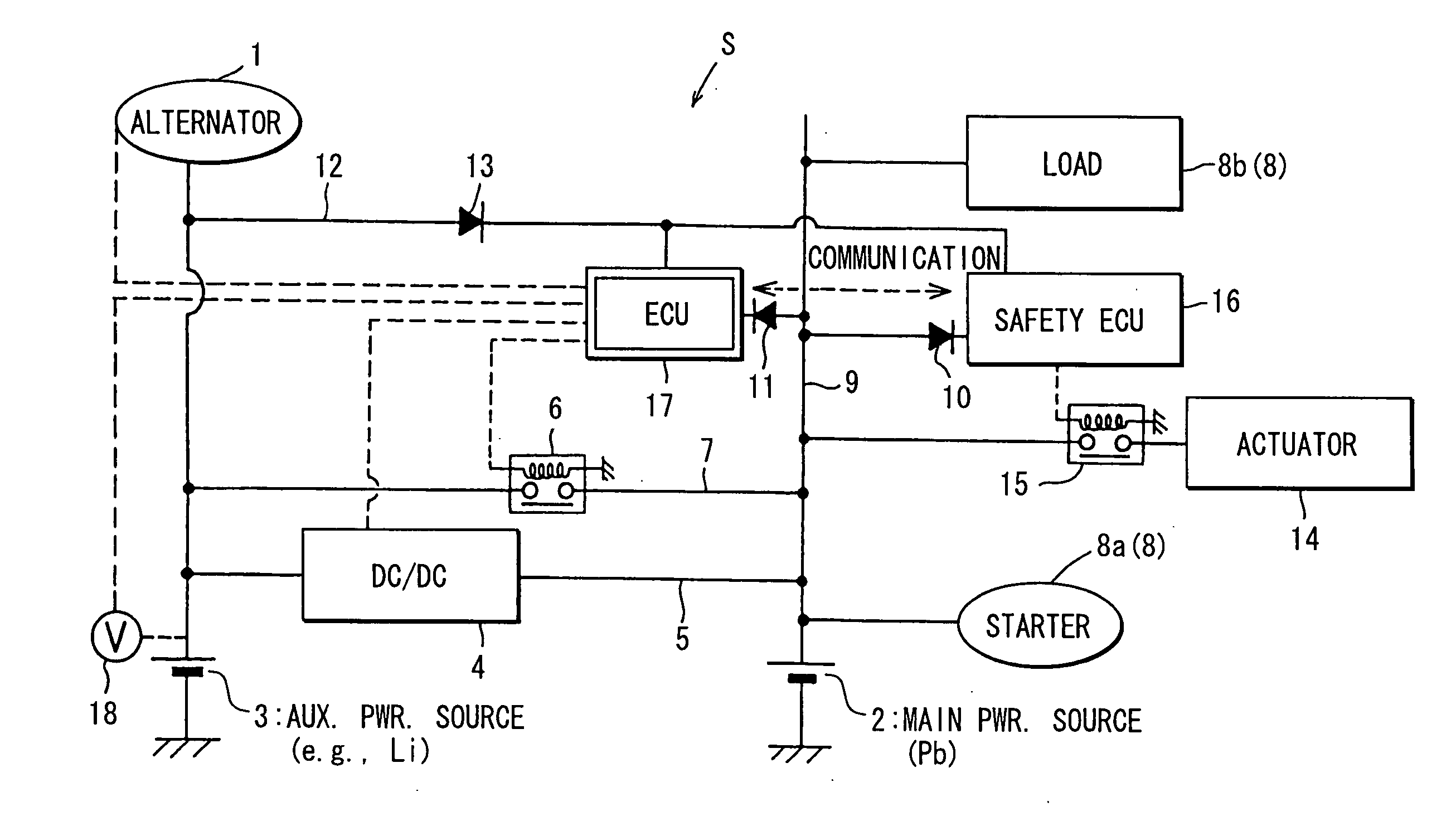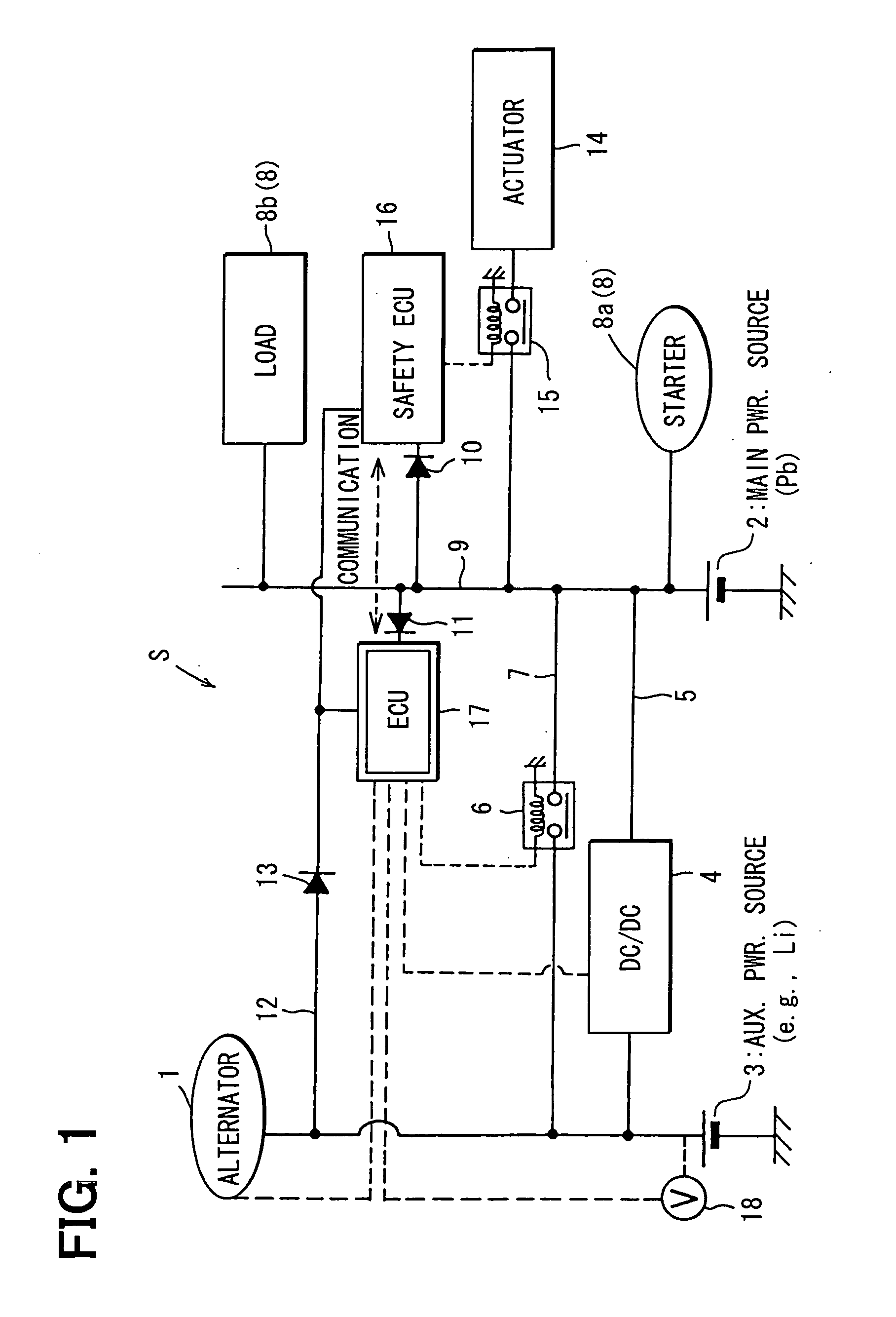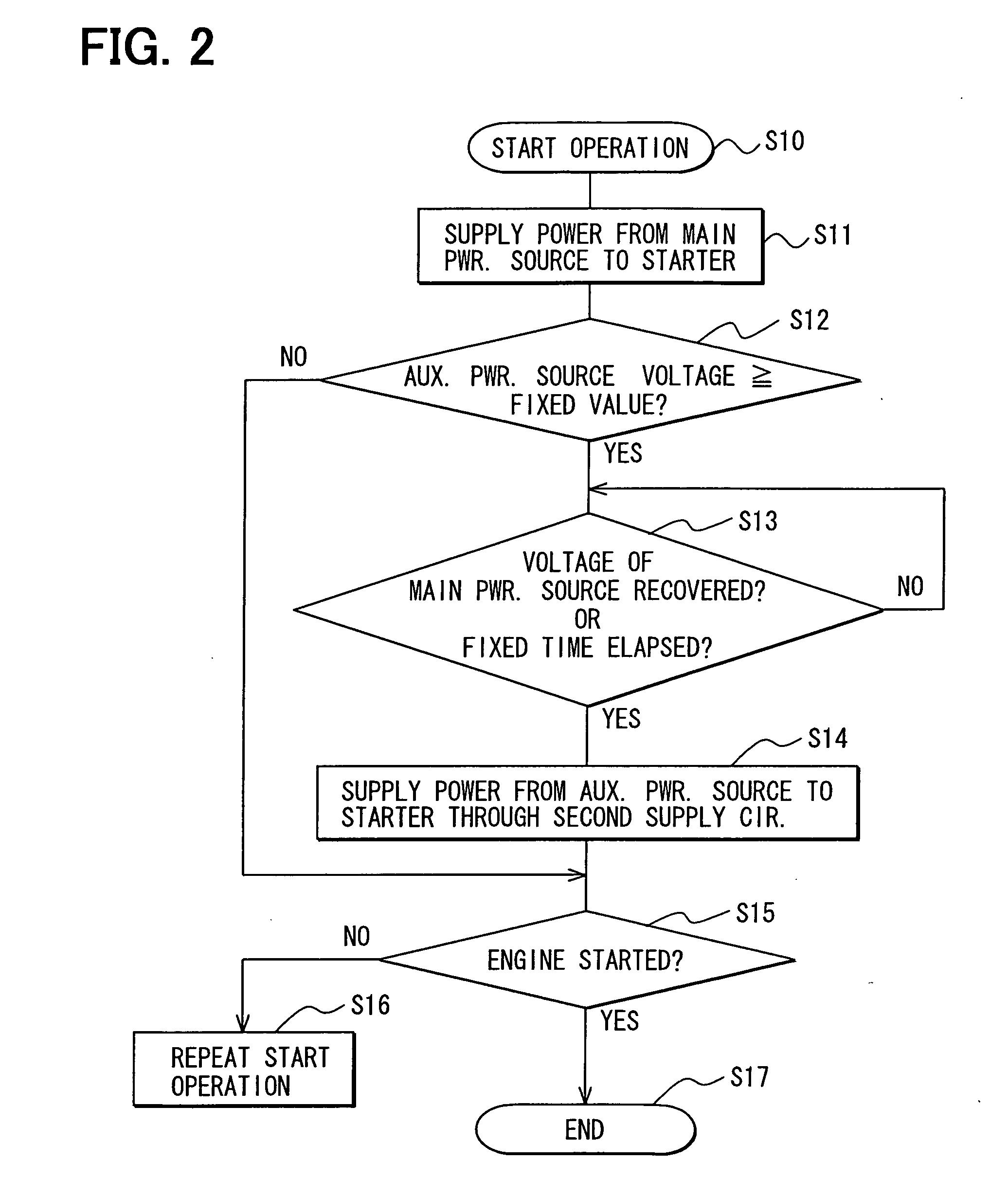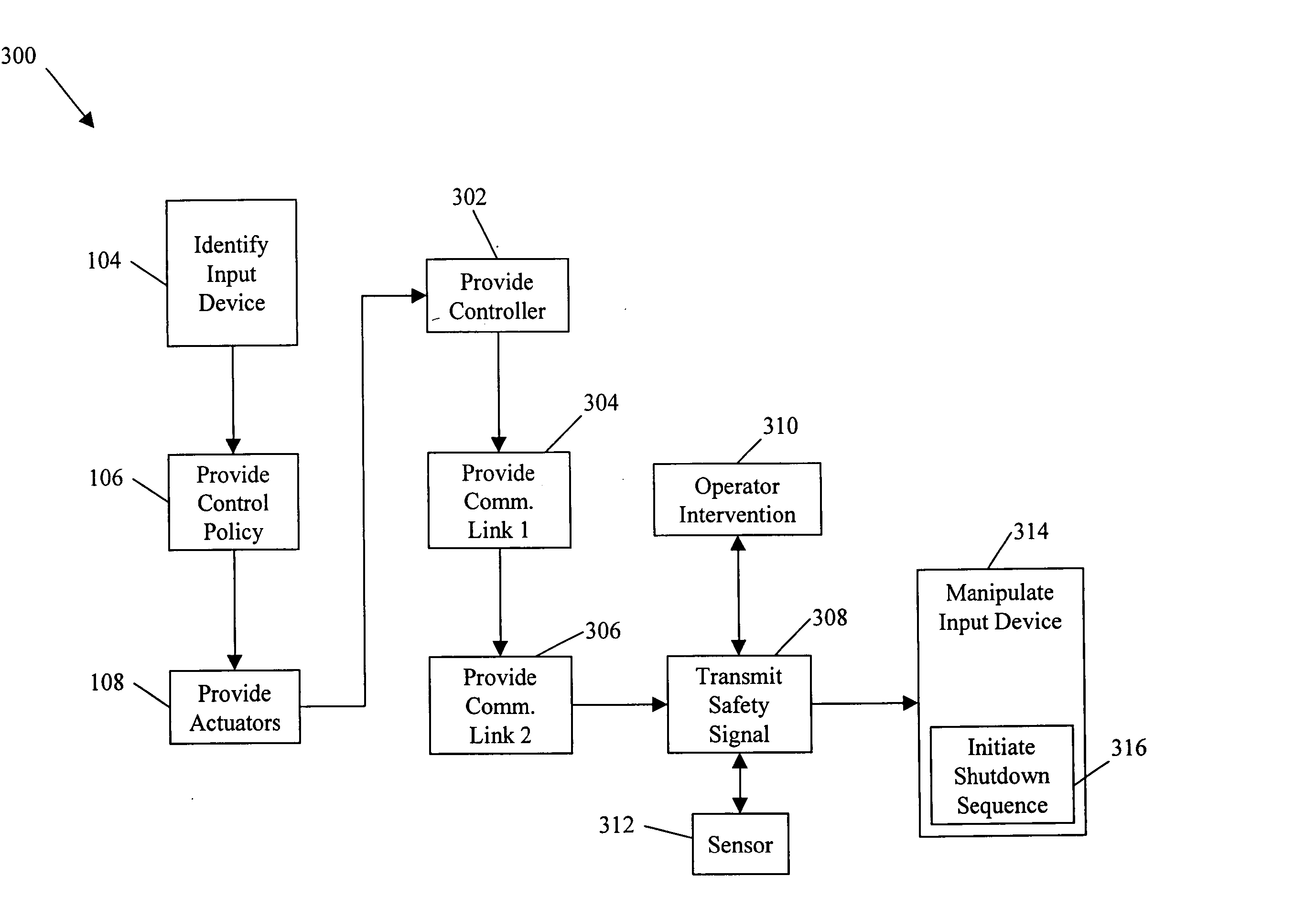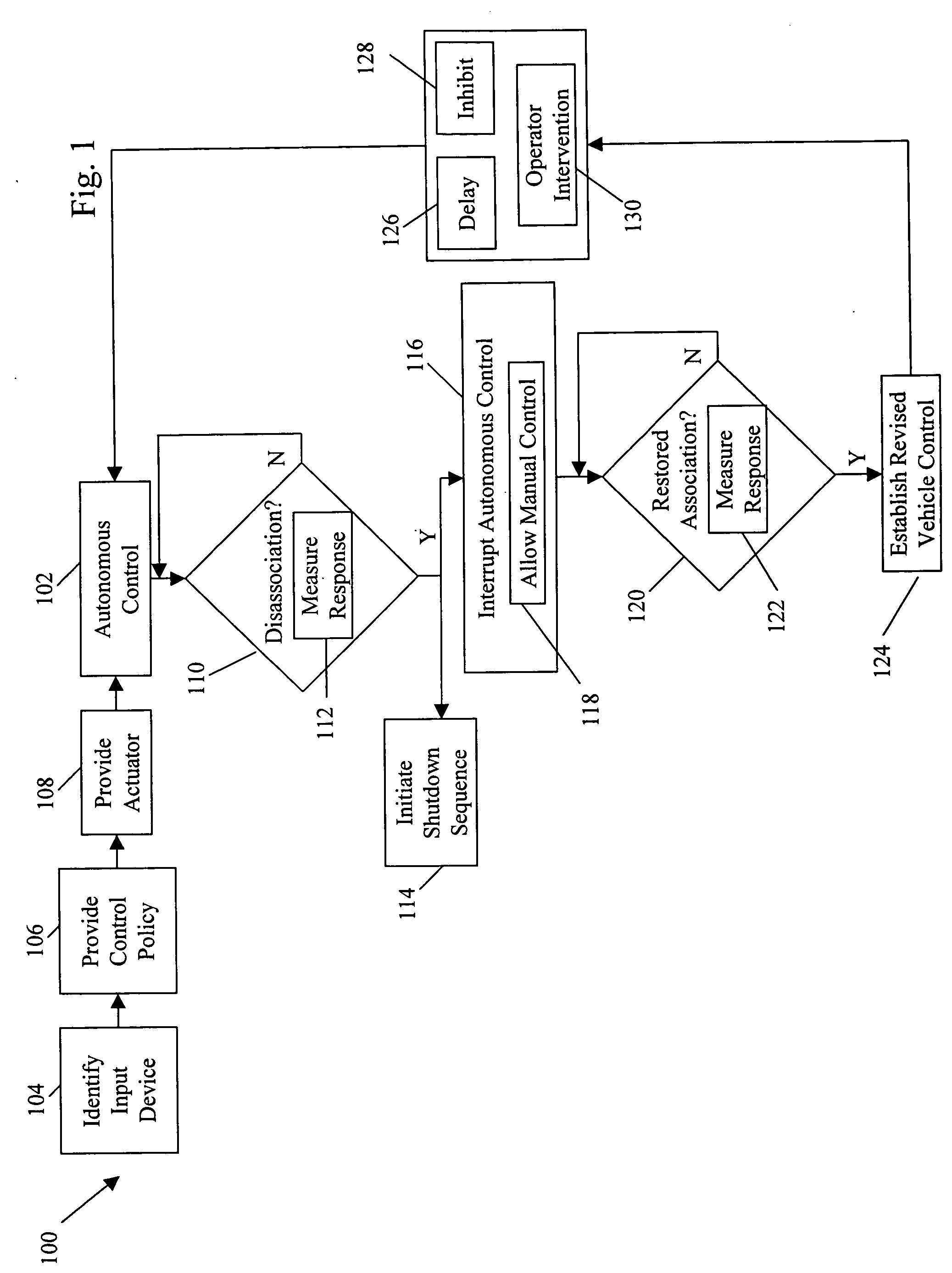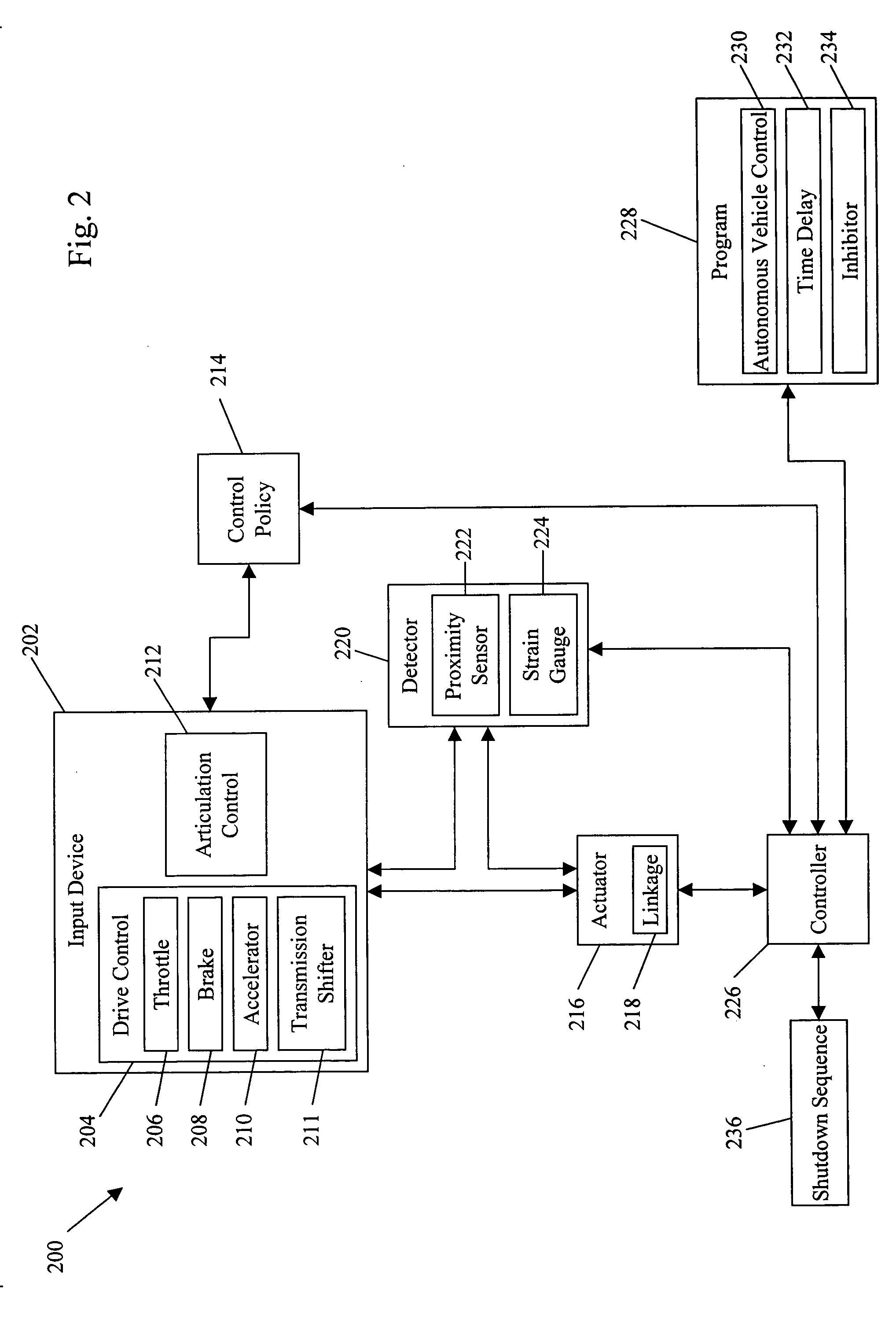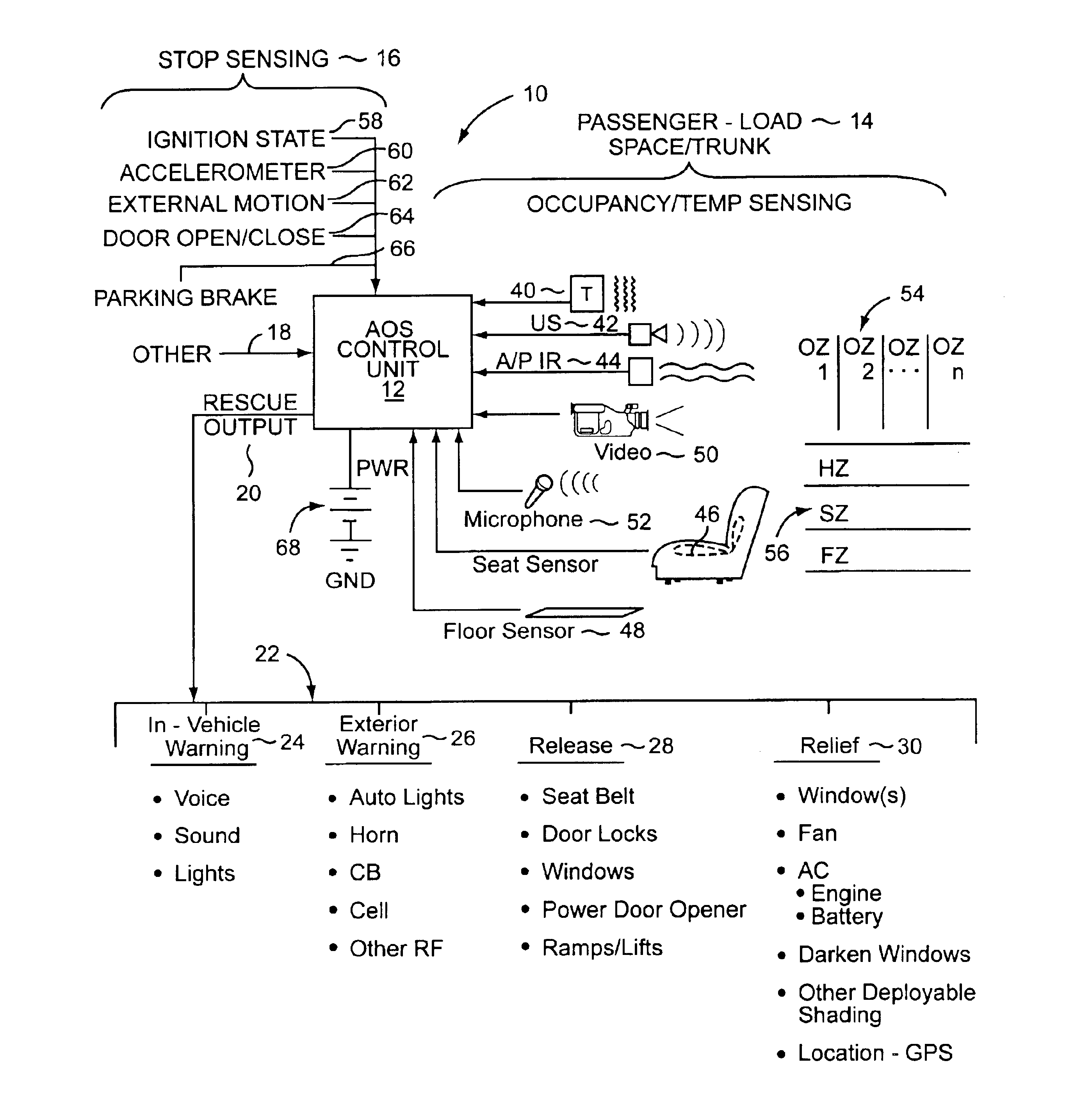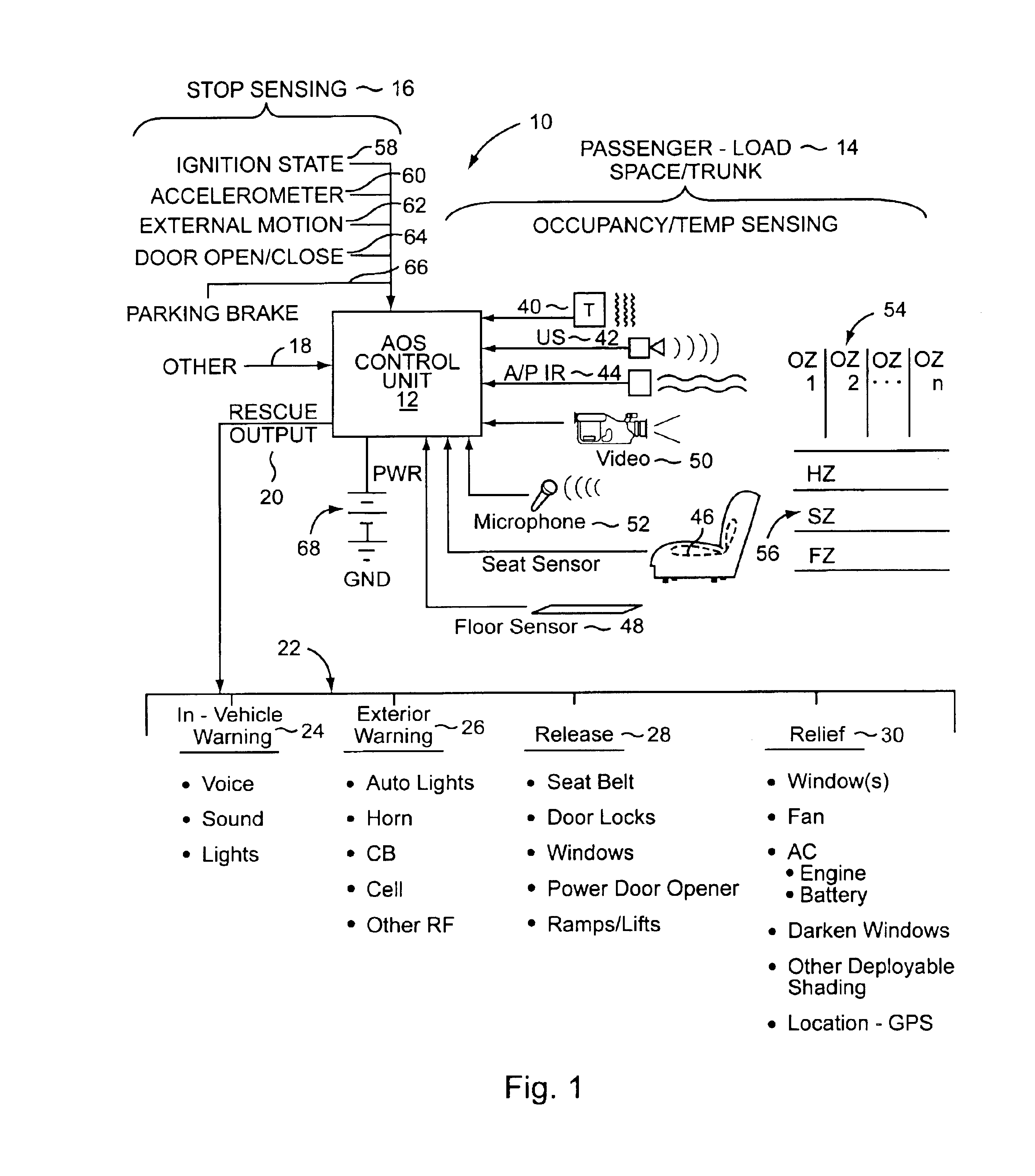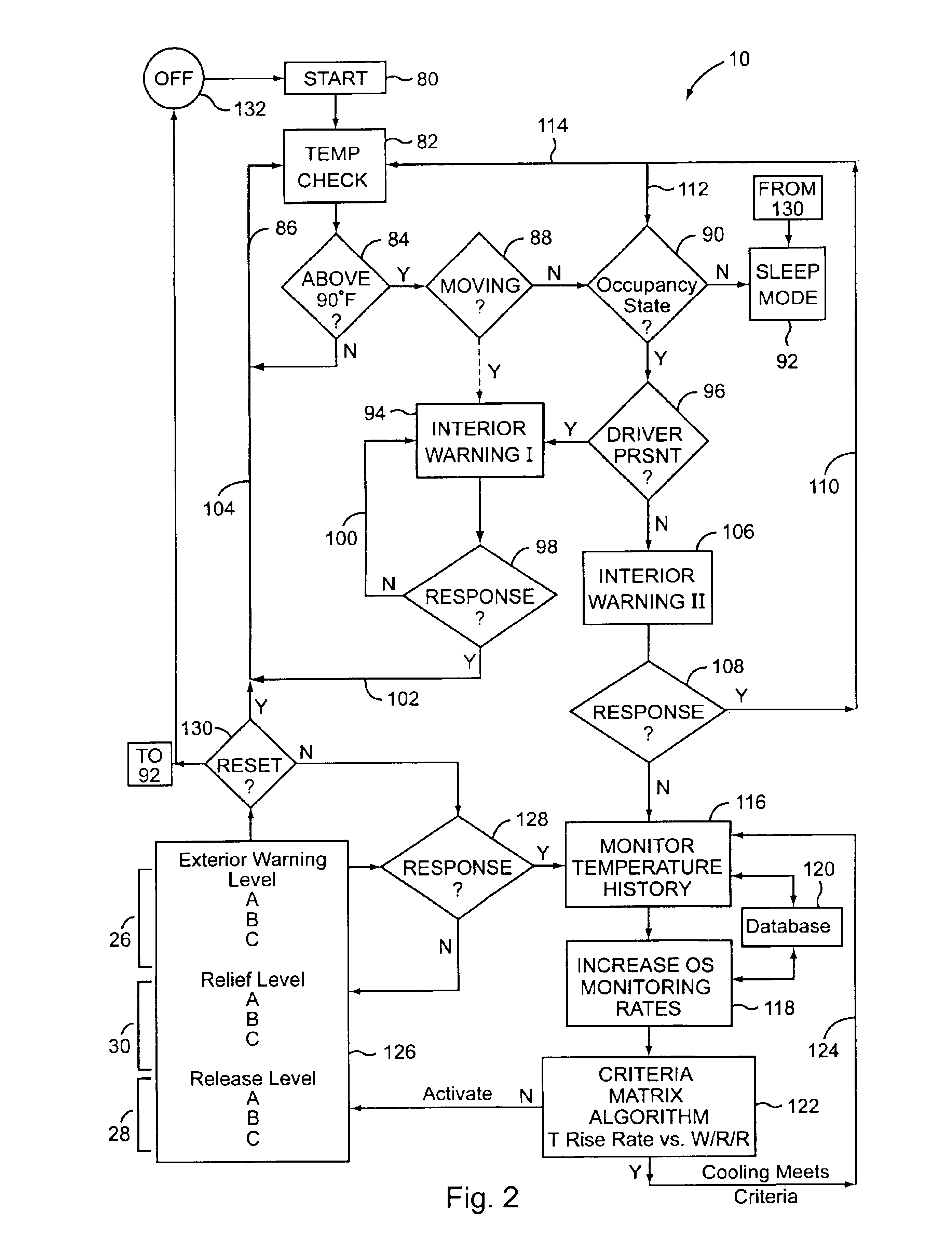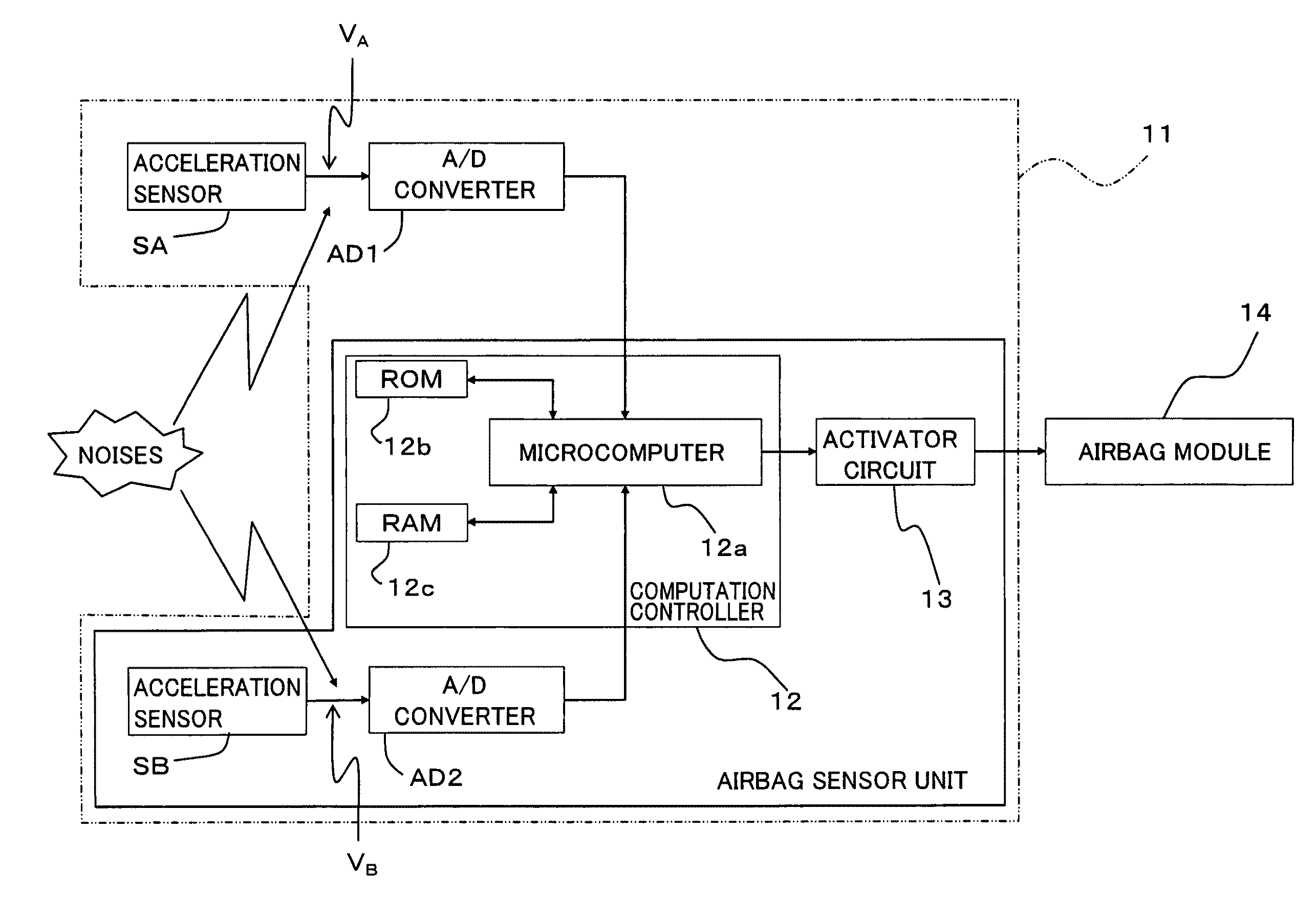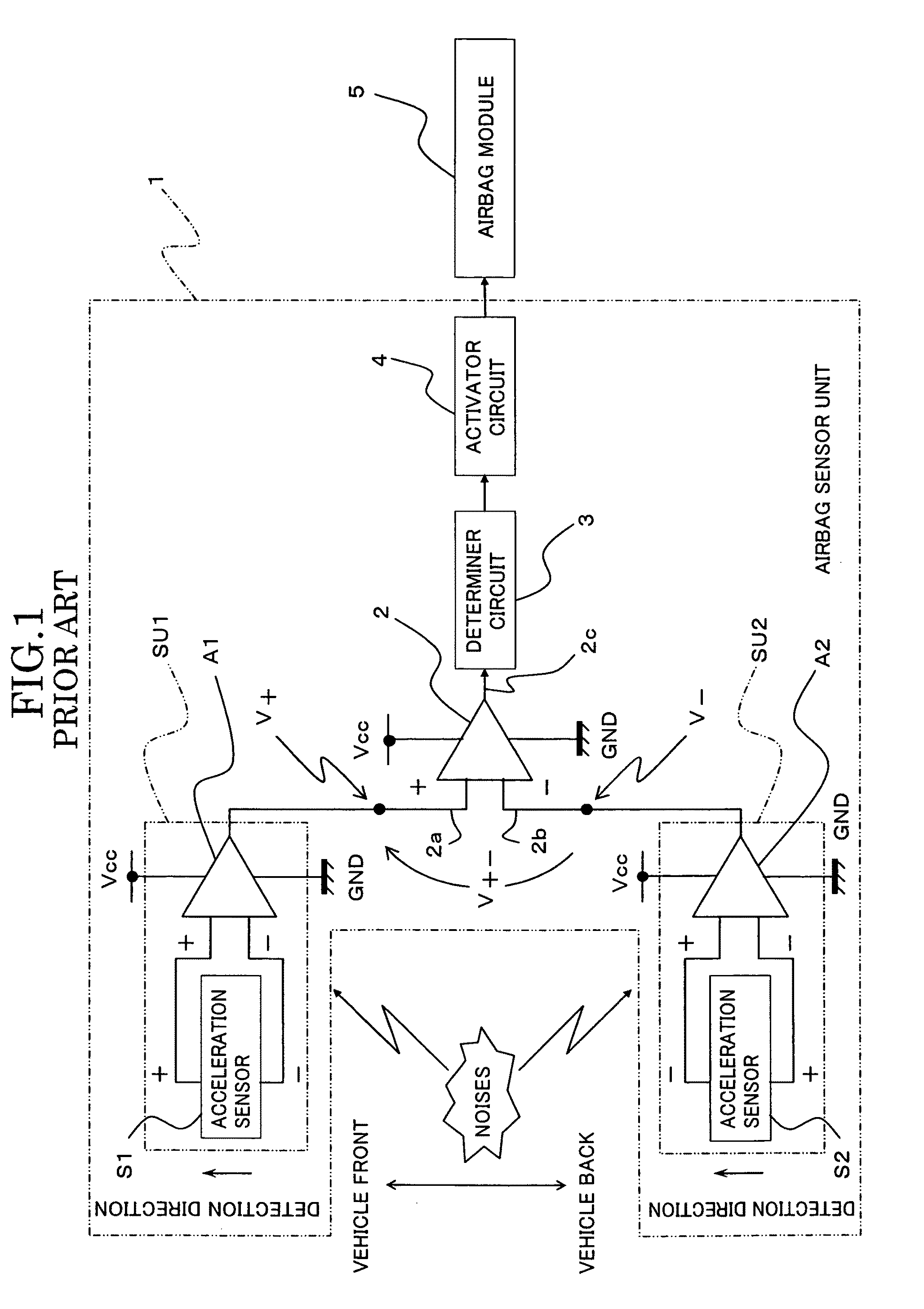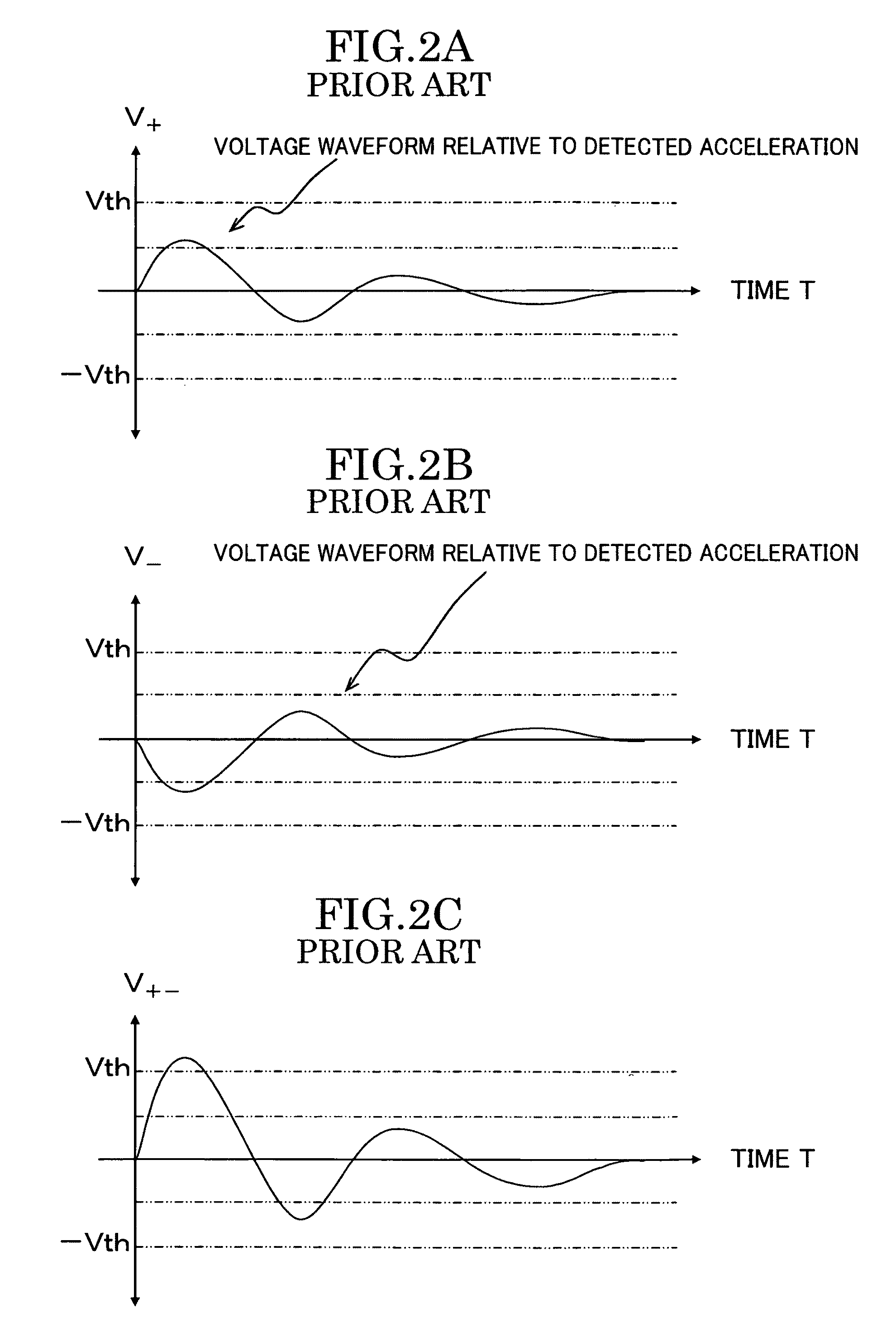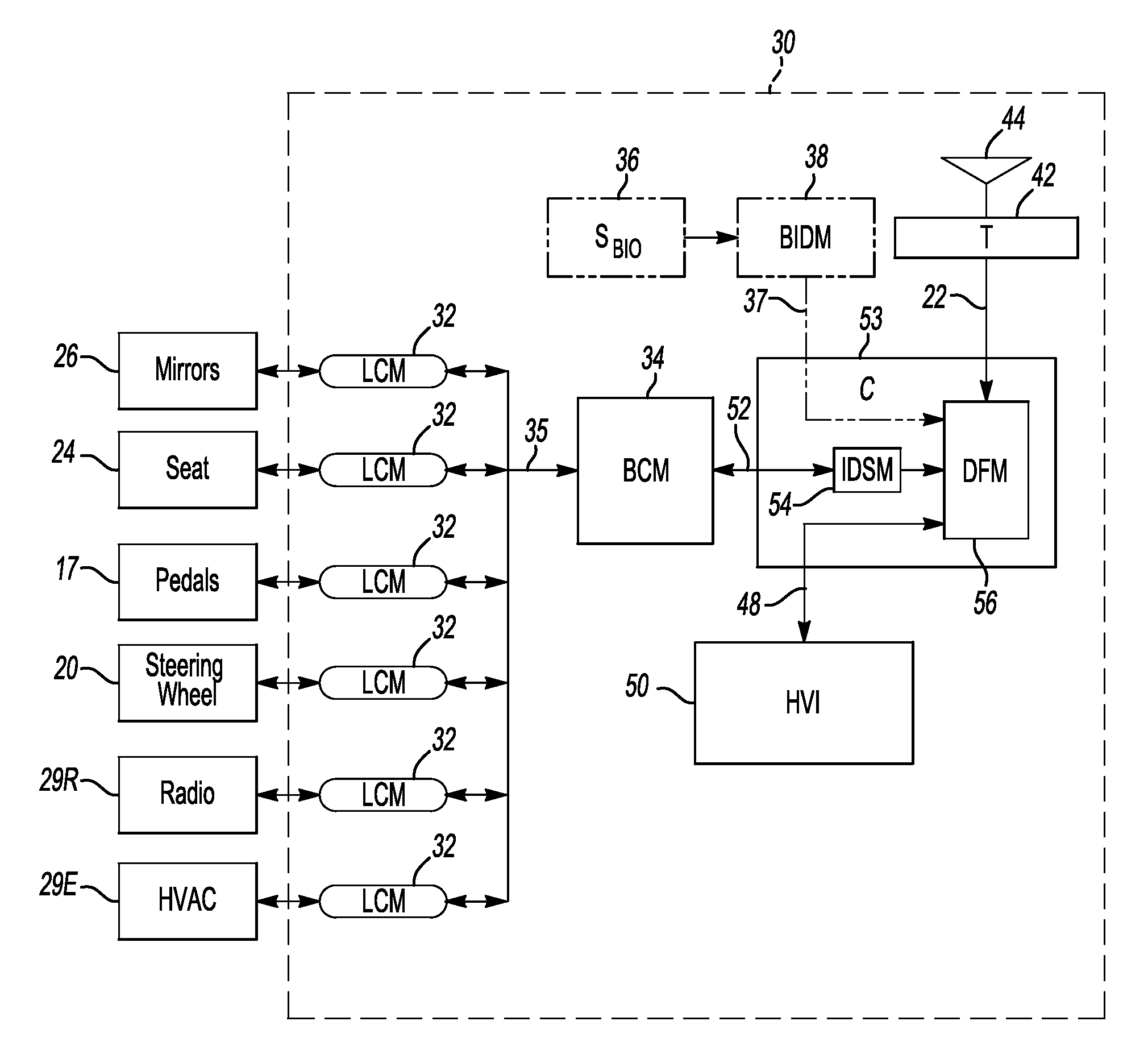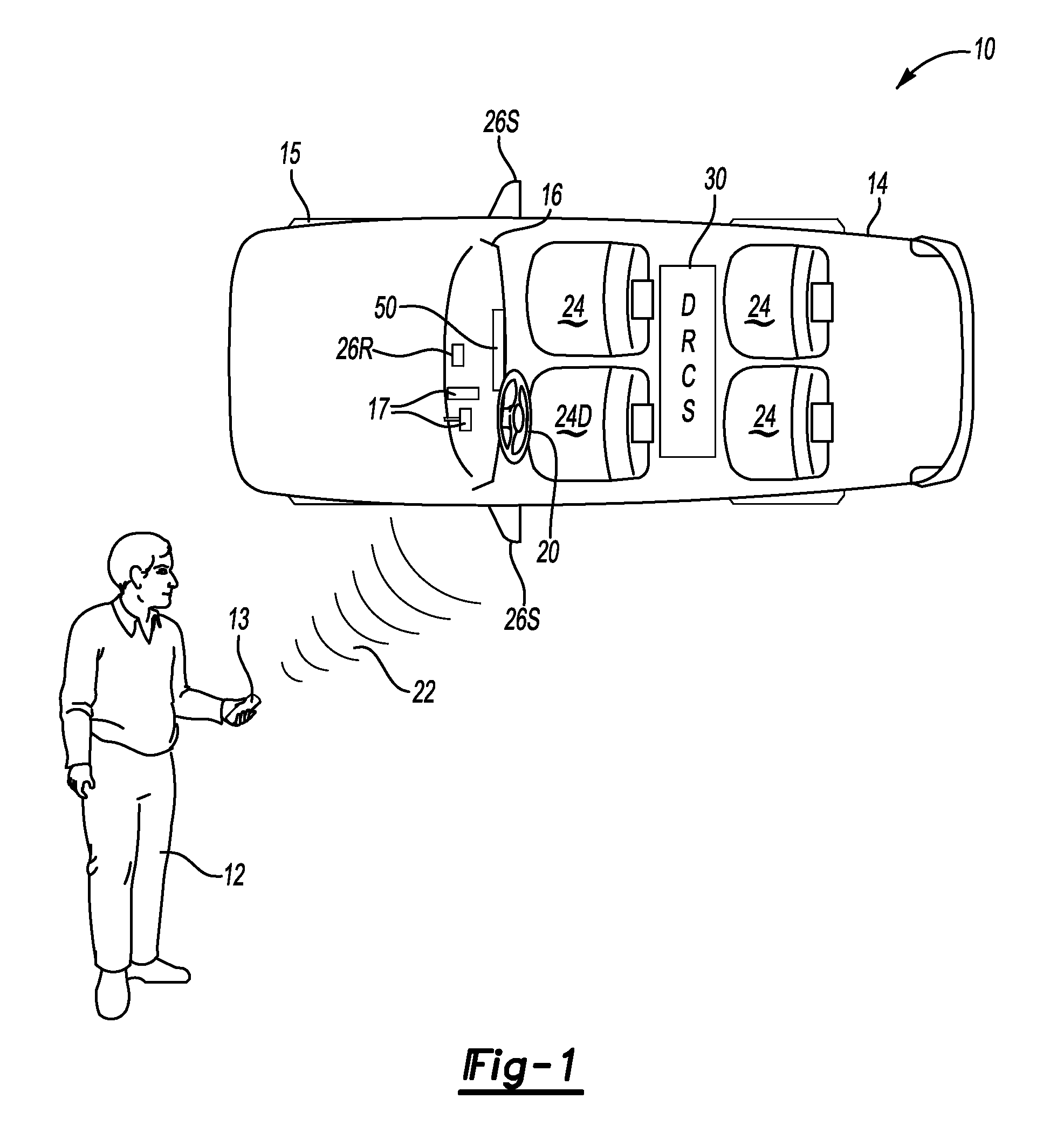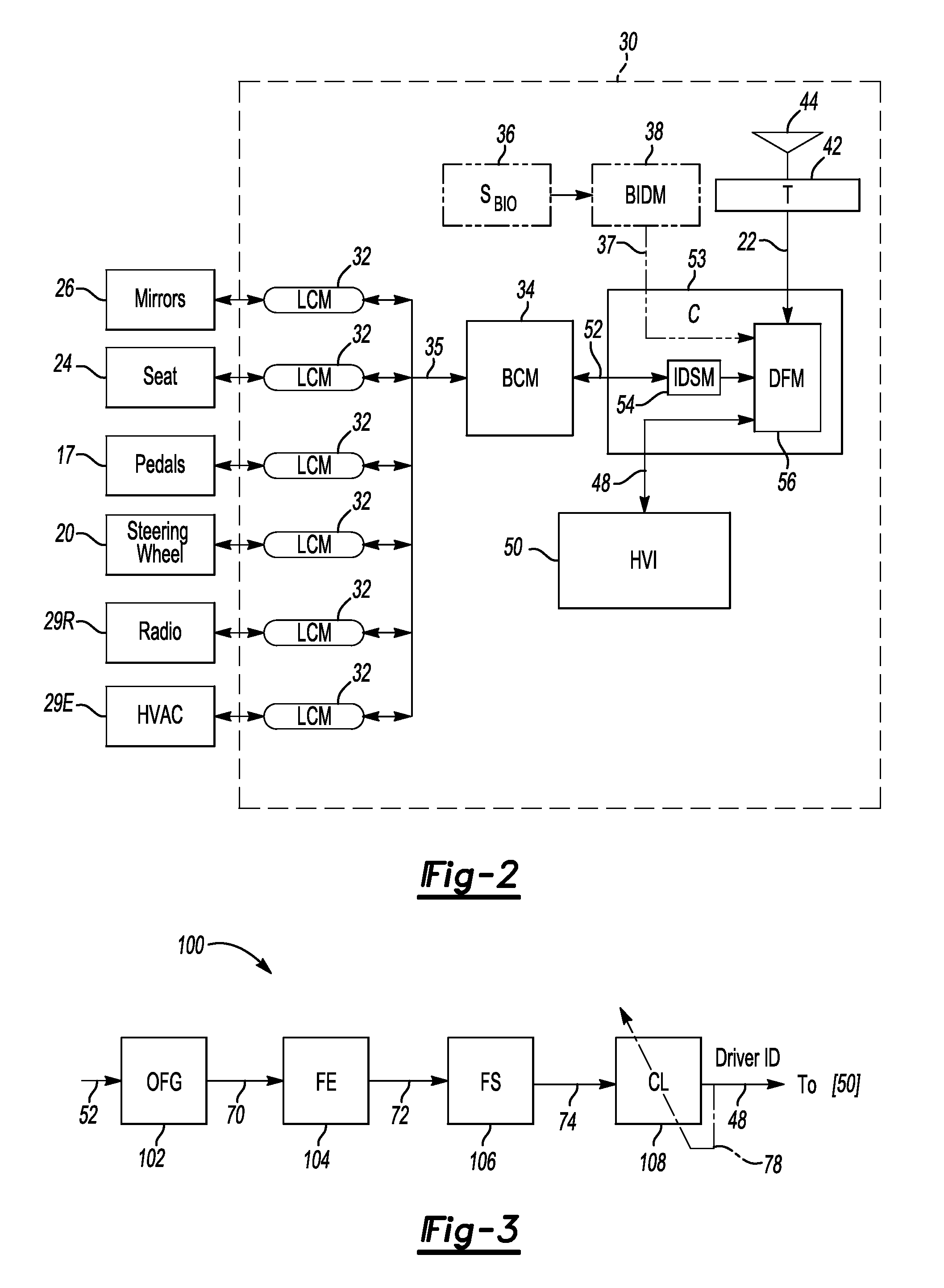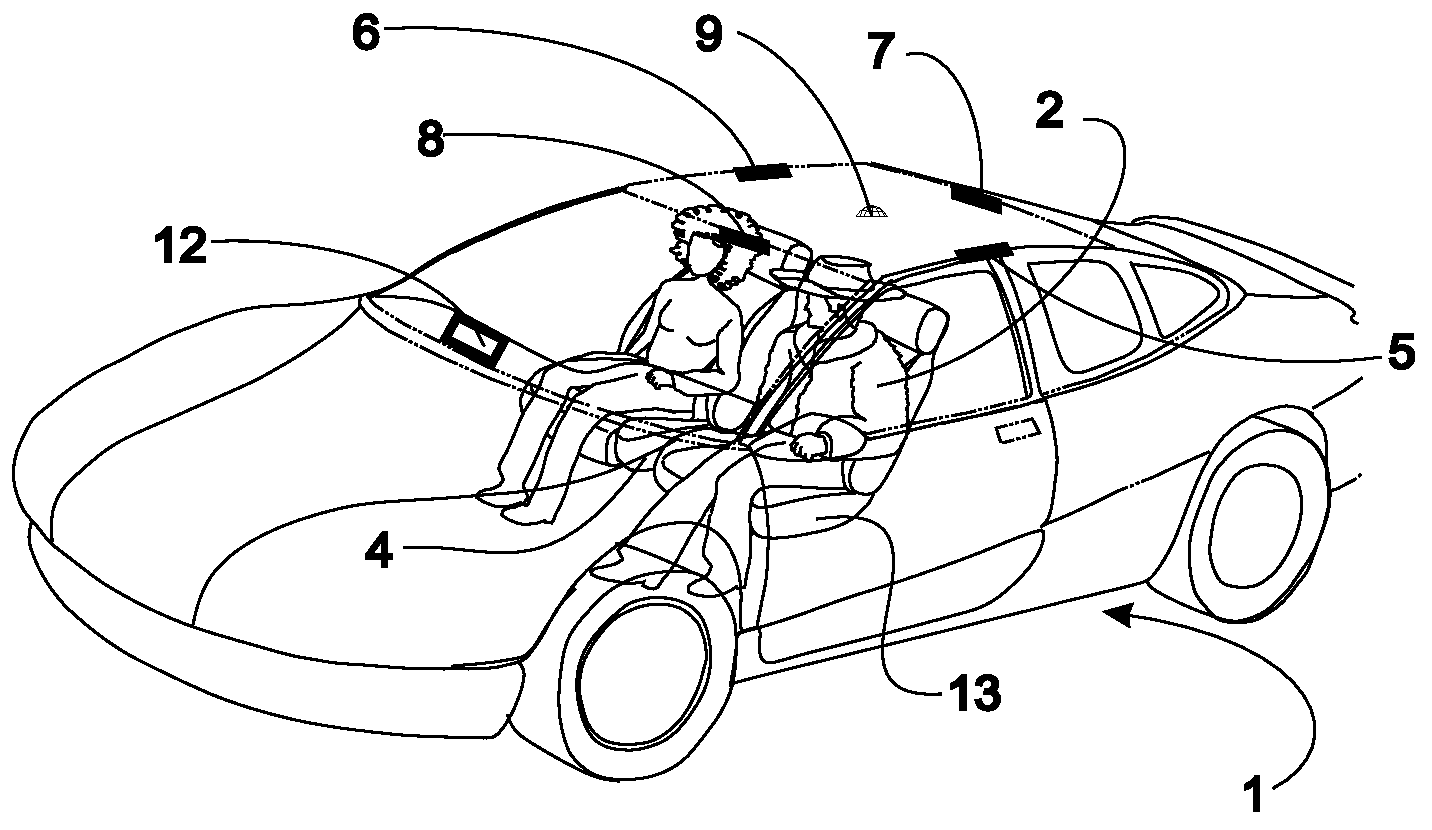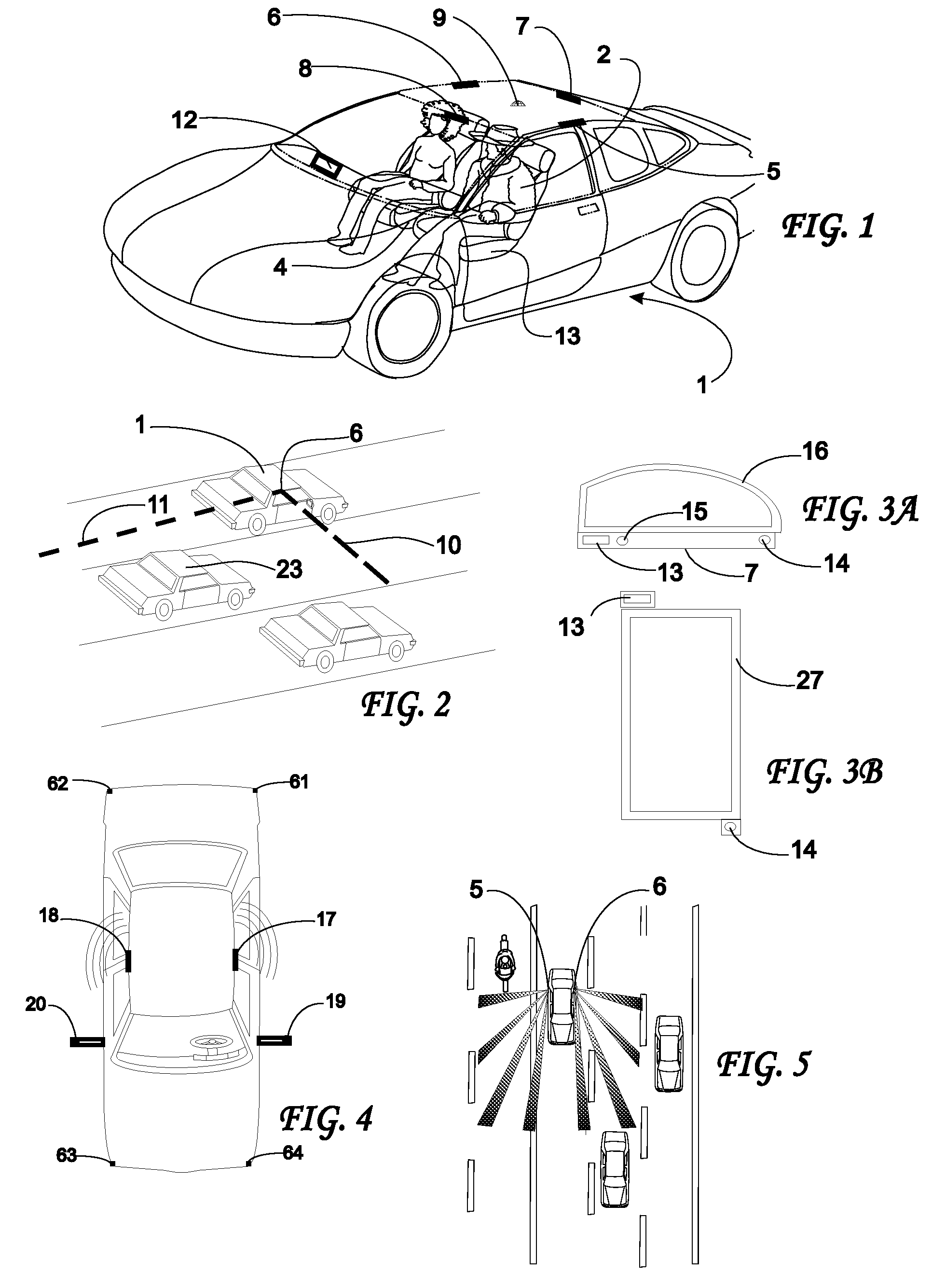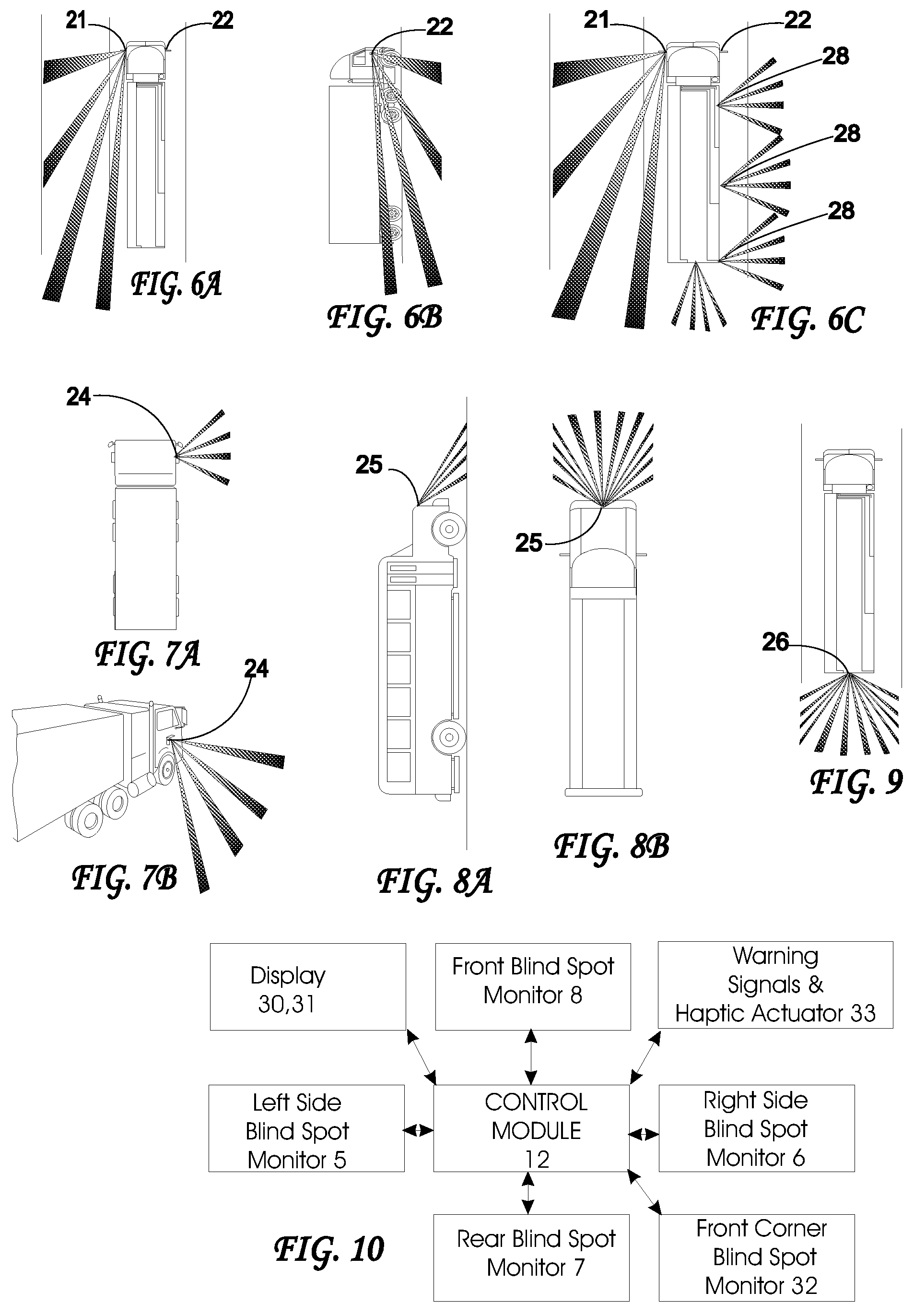Patents
Literature
3200results about "Vehicle safety belts" patented technology
Efficacy Topic
Property
Owner
Technical Advancement
Application Domain
Technology Topic
Technology Field Word
Patent Country/Region
Patent Type
Patent Status
Application Year
Inventor
Tracking and gesture recognition system particularly suited to vehicular control applications
InactiveUS7050606B2Realize automatic adjustmentImage enhancementImage analysisDriver/operatorControl system
A system and method tracks the movements of a driver or passenger in a vehicle (ground, water, air, or other) and controls devices in accordance with position, motion, and / or body or hand gestures or movements. According to one embodiment, an operator or passenger uses the invention to control comfort or entertainment features such the heater, air conditioner, lights, mirror positions or the radio / CD player using hand gestures. An alternative embodiment facilitates the automatic adjustment of car seating restraints based on head position. Yet another embodiment is used to determine when to fire an airbag (and at what velocity or orientation) based on the position of a person in a vehicle seat. The invention may also be used to control systems outside of the vehicle. The on-board sensor system would be used to track the driver or passenger, but when the algorithms produce a command for a desired response, that response (or just position and gesture information) could be transmitted via various methods (wireless, light, whatever) to other systems outside the vehicle to control devices located outside the vehicle. For example, this would allow a person to use gestures inside the car to interact with a kiosk located outside of the car.
Owner:JOLLY SEVEN SERIES 70 OF ALLIED SECURITY TRUST I
Method and system for detecting objects external to a vehicle
InactiveUS20050134440A1Avoid collisionAvoid and minimize effectVehicle seatsInstruments for road network navigationRange gateLaser beams
Method and system for obtaining information about objects in the environment outside of and around a vehicle and preventing collisions involving the vehicle includes directing a laser beam from the vehicle into the environment, receiving from an object in the path of the laser beam a reflection of the laser beam at a location on the vehicle, and analyzing the received laser beam reflections to obtain information about the object from which the laser beam is being reflected. Analysis of the laser beam reflections preferably entails range gating the received laser beam reflections to limit analysis of the received laser beam reflections to only those received from an object within a defined (distance) range such that objects at distances within the range are isolated from surrounding objects.
Owner:AMERICAN VEHICULAR SCI
Driving separation distance indicator
ActiveUS7123168B2Digital data processing detailsRoad vehicles traffic controlImage captureAutomotive engineering
A driving separation indication system for a vehicle includes an imaging sensor, a control and at least one indicator. The control is operable to process an image captured by the imaging sensor representative of a scene occurring exteriorly of the subject vehicle and to detect another vehicle via processing of the image. The control is operable to determine a threshold interspacing distance in response to a speed of the subject vehicle, and is operable to determine a distance from the subject vehicle to the detected other vehicle. The control is operable to at least occasionally actuate the indicator in response to the distance from the subject vehicle to the other vehicle being less than or equal to the threshold interspacing distance. The control may generally continuously determine the speed of the vehicle and the threshold interspacing distance to provide an appropriate threshold interspacing distance.
Owner:DONNELLY CORP
Touch gesture based interface for motor vehicle
ActiveUS20060047386A1Volume being raised and loweredDashboard fitting arrangementsDigital data processing detailsDistractionMobile vehicle
An improved apparatus and method is provided for operating devices and systems in a motor vehicle, while at the same time reducing vehicle operator distractions. One or more touch sensitive pads are mounted on the steering wheel of the motor vehicle, and the vehicle operator touches the pads in a pre-specified synchronized pattern, to perform functions such as controlling operation of the radio or adjusting a window. At least some of the touch patterns used to generate different commands may be selected by the vehicle operator. Usefully, the system of touch pad sensors and the signals generated thereby are integrated with speech recognition and / or facial gesture recognition systems, so that commands may be generated by synchronized multi-mode inputs.
Owner:WAYMO LLC
Method and arrangement for controlling vehicular subsystems based on interpreted driver activity
Method and arrangement for controlling a subsystem of a vehicle dependent upon a sensed level of driver inattentiveness to vehicle driving tasks. A variable characteristic is measured, on a substantially real-time basis, which correlates to the driver's inattentiveness. The level of inattentiveness is assessed based at least in part on the measurement. The performance of a subsystem of the vehicle, such as cruise control or lane keeping support, is tailored, based thereupon, to assure that behavior of the vehicle appropriately matches the driver's present level of inattentiveness. The subsystem's operation is controlled in an effort to avoid or prevent the establishment of driving conditions that become inherently more dangerous as the driver's level of inattentiveness increases.
Owner:VOLVO TECH
Vehicle information recording system
InactiveUS7254482B2Easy searchAnalogue computers for vehiclesInstruments for road network navigationReal-time computingRecording system
A vehicle information recording system 100 includes a picture acquiring unit 101a placed in a vehicle that takes a picture of surroundings and generates picture data showing the picture, a vehicle data receiving unit 107 placed in the vehicle that receives other vehicle data concerning another vehicle shown in the picture acquired by the picture acquiring unit 101a, an acquired information sending unit 103 placed in the vehicle that sends data including the picture data and the other vehicle data outside of the vehicle, a receiving unit 104 placed outside of the vehicle that receives the data sent by the acquired information sending unit 103, an encoding unit 105 placed outside of the vehicle that encodes the other vehicle data among the data received by the receiving unit 104 and adds the encoded data to the picture data as related data, and a recording unit 106 placed outside of the vehicle that records the picture data to which the other vehicle data is added by the encoding unit 105.
Owner:PANASONIC INTELLECTUAL PROPERTY CORP OF AMERICA
Vehicle illumination system and method
InactiveUS7987030B2Avoid interferenceConvenient lightingLighting circuitsPassenger/driving compartment lightingsSteering wheelControl system
An apparatus and method for illuminating a vehicle including a light source connected to an illuminatable component such as an interior or exterior vehicle door handle or steering wheel, and a control system including a plurality of sensors that monitor the vehicle and surroundings for predetermined conditions and selectively illuminate the component as a means of conveying information or warnings about the vehicle or its surroundings. Illumination may be enhanced by other auditory signals such as audio alarms or vibration. Predetermined conditions may include the proximity of a vehicle user, key fob activation or proximity, input from an entertainment system, activation of a pressure sensor, the presence of a person or object in proximity to the vehicle, or the vehicle's ignition or gear state.
Owner:GM GLOBAL TECH OPERATIONS LLC
Vehicular Component Control Methods Based on Blind Spot Monitoring
Method for controlling a vehicular system based on the presence of an object in an environment around a vehicle with one goals being to prevent collisions between the vehicle and any objects. Infrared light is emitted from the vehicle into a portion of the environment around the vehicle and received by a sensor on the vehicle. Distance between the vehicle and an object from which the infrared light is reflected is determined based on the emission of the infrared light and reception of the infrared light. The presence of and an identification of the object from which light is reflected is / are determined based at least in part on the received infrared light. The vehicular system is controlled or adjusted based on the determination of the presence of an object in the environment around the vehicle and the identification of the object and the distance between the object and the vehicle.
Owner:AMERICAN VEHICULAR SCI
System and Method for Preventing Vehicular Accidents
InactiveUS20080040004A1Reduce the potential harmDigital data processing detailsAnti-collision systemsVehicular accidentEngineering
Vehicle including an anticipatory sensor system for determining that an impact involving the vehicle is about to occur unless a corrective action is taken based on data obtained prior to the impact and determining whether the potential impact requires activation of a reactive system which controls operation of the vehicle. The anticipatory sensor system includes a receiver for receiving waves or energy and a pattern recognition system for analyzing the received waves or energy, or data representative thereof, to determine that an impact is about to occur if corrective action is not taken and whether the potential impact requires activation of the reactive system. The pattern recognition system ascertains the identity of an object from which the waves or energy have been emitted, reflected or generated, so that the determination whether the impact requires activation of the reactive system is based on identification of the object.
Owner:AMERICAN VEHICULAR SCI
Vehicle control
ActiveUS7349776B2Improved vehicle controlEasy to controlBrake system interactionsDigital data processing detailsControl systemMode control
A vehicle control system has a plurality of subsystem controllers including an engine management system 28, a transmission controller 30, a steering controller 48, a brakes controller 62 and a suspension controller 82. These subsystem controllers are each operable in a plurality of subsystem modes, and are all connected to a vehicle mode controller 98 which controls the modes of operation of each of the subsystem controllers so as to provide a number of driving modes for the vehicle. Each of the modes corresponds to a particular driving condition or set of driving conditions, and in each mode each of the functions is set to the function in mode most appropriate to those conditions.
Owner:JAGUAR LAND ROVER LTD
Method and arrangement for controlling vehicular subsystems based on interpreted driver activity
InactiveUS7639148B2Vehicle fittingsDigital data processing detailsDriver/operatorVariable Characteristic
Owner:VOLVO TECH
System and method for preventing vehicular accidents
InactiveUS7783403B2Reduce the potential harmDigital data processing detailsAnti-collision systemsVehicular accidentReactive system
Vehicle including an anticipatory sensor system for determining that an impact involving the vehicle is about to occur unless a corrective action is taken based on data obtained prior to the impact and determining whether the potential impact requires activation of a reactive system which controls operation of the vehicle. The anticipatory sensor system includes a receiver for receiving waves or energy and a pattern recognition system for analyzing the received waves or energy, or data representative thereof, to determine that an impact is about to occur if corrective action is not taken and whether the potential impact requires activation of the reactive system. The pattern recognition system ascertains the identity of an object from which the waves or energy have been emitted, reflected or generated, so that the determination whether the impact requires activation of the reactive system is based on identification of the object.
Owner:AMERICAN VEHICULAR SCI
Vehicular impact reactive system and method
InactiveUS20050278098A1Reduce number and severityDigital data processing detailsAnti-collision systemsEngineeringReactive system
System and method for reacting to an expected impact involving a vehicle including an anticipatory sensor system for determining that an impact involving the vehicle is about to occur prior to the impact and an impact responsive system coupled to the sensor system and actuated after its determination of the expected impact. The sensor system includes wave receivers spaced apart from one another, each receiving waves generated by, modified by, or reflected from a common object exterior of the vehicle. The impact responsive system attempts to reduce the potential harm resulting from the impact and can be a protection apparatus which protects a vehicular occupant or a pedestrian, such as one including an airbag and an inflator for inflating the airbag.
Owner:AMERICAN VEHICULAR SCI
Motor vehicle occupant sensing systems
A roof-mounted passenger position sensor array of capacitive coupling passenger position sensors, to determine position and motion of a passenger by analysis of distances of the passenger to the various sensors of the array and analysis of the changes of distances with time.
Owner:METHODE ELETRONICS INC
Touch gesture based interface for motor vehicle
ActiveUS7295904B2Dashboard fitting arrangementsDigital data processing detailsMobile vehicleDistraction
An improved apparatus and method is provided for operating devices and systems in a motor vehicle, while at the same time reducing vehicle operator distractions. One or more touch sensitive pads are mounted on the steering wheel of the motor vehicle, and the vehicle operator touches the pads in a pre-specified synchronized pattern, to perform functions such as controlling operation of the radio or adjusting a window. At least some of the touch patterns used to generate different commands may be selected by the vehicle operator. Usefully, the system of touch pad sensors and the signals generated thereby are integrated with speech recognition and / or facial gesture recognition systems, so that commands may be generated by synchronized multi-mode inputs.
Owner:WAYMO LLC
System and method for processing safety signals in an autonomous vehicle
InactiveUS7499774B2Decrease and eliminates need for manual interventionImprove securityDigital data processing detailsAnti-theft devicesUnsafe conditionProcess safety
System and method for processing a safety signal in an autonomous vehicle. Safety signals are typically generated in response to the detection of unsafe conditions or are sent by the vehicle operator. In either case, the safety signals are conveyed using redundant communication paths. The paths include a computer network and a current loop. The safety signals are processed, thereby causing actuators (e.g., linkages) to manipulate input devices (e.g., articulation controls and drive controls, such as a throttle, brake, tie rods, steering gear, throttle lever, accelerator, or transmission shifter). The manipulation ensures the vehicle responds appropriately to the safety signals, for example, by shutting down the vehicle.
Owner:IROBOT CORP
Hot vehicle safety system and methods of preventing passenger entrapment and heat suffocation
InactiveUS20020161501A1Low powerSave battery powerAnti-theft cycle devicesDigital data processing detailsSeat beltVehicle horn
Safety systems for vehicles, primarily passenger vehicles, comprising automated systems and methods for preventing entrapment of children, disabled, aged or infirm persons, or pets from being trapped in closed vehicles left in the sun, so that they will not suffocate from the heat. The invention is characterized by use of one or more systems to sense the occupancy state and temperature inside the vehicle passenger or load space, and provide one or more outputs which can selectively be employed to provide interior and exterior warning of a trapped passenger in a dangerously hot car to permit rescue, and / or to activate vehicle electro-mechanical systems to relieve the heat, such as rolling down windows, unlatching seat belts, unlocking doors, starting the car and / or fans or air conditioning systems and the like. The exterior warnings may be any suitable warning, such as sounding the car horn or alarm siren, flashing head, tail or special lights, placing an emergency call via a vehicle dedicated cell phone, CB radio, GPS system, or the like.
Owner:ROBERT BOSCH CORP
Systems For a Shared Vehicle
InactiveUS20140222298A1Simulating experienceRealize automatic adjustmentDigital data processing detailsAnti-theft devicesElectronic communicationOnboard computer
The present invention relates to a system for automatically adjusting a vehicle feature of a vehicle, where the system includes a first sensor, an onboard computer, a camera, a mirror, a controller; an actuator; and an algorithm. The algorithm instructs the onboard computer in steps for adjusting one or more vehicle features. The first sensor and the controller are in electronic communication with the onboard computer and the controller is in electronic communication with one or more actuators that connect to and adjust the various vehicle features. The onboard computer includes or accesses a database that correlates users, features, and vehicle feature settings. Such vehicle features include seat position and camera viewing angle.
Owner:GURIN MICHAEL H
Driver assistance system
InactiveUS20120303222A1Instruments for road network navigationRoad vehicles traffic controlArea networkDriver/operator
A system and method of assisting a driver of a vehicle by providing driver and vehicle feedback control signals is disclosed. The system and method includes receiving location data of the vehicle from a GPS unit, receiving the location data of the vehicle and retrieving navigation characteristics relevant to the location data using a processing circuit, generating a most probable future path for the vehicle and determining a location of at least one navigation characteristic with respect to the most probable future path and the vehicle, generating vehicle data at least one vehicle sensor, and transmitting a control signal to a vehicle control area network to warn the driver of an upcoming navigation characteristic on the most probable path.
Owner:TK HLDG
Vehicle seat provided with a device for protecting the neck in the event of impact from behind
InactiveUS6024406AMitigate such drawbackSafety beltsPedestrian/occupant safety arrangementEngineeringMechanical engineering
A motor vehicle seat has a strength-member for its back that includes an upper portion pivotally mounted on a lower portion and carrying a headrest, the two portions of the strength-member are connected together by a locking device which holds them together and which is dimensioned to give way when the back of a passenger bears against a thrust member of the upper portion of the strength-member in the event of an impact from behind, such that the upper portion of the seat-back strength-member and the upper region of the front face of the seat-back then pivot forwards together with the headrest, with this movement being braked by an energy absorber device.
Owner:BERTRAND FAURE EQUIP SA (FR)
Protecting children and passengers with respect to a vehicle
InactiveUS20090027188A1Avoid accidental activationPotential dangerVehicle testingVehicle seatsDriver/operatorEngineering
There is provided a system and methods for mitigation of the potential dangers to which at least a child, and passengers, are exposed to prior to, during travel and after travel, when outside and adjacent a vehicle. Potential dangers to which a child is exposed are risks associated with driving and non-driving behavior of the driver, when the child is inside and outside the vehicle, when the vehicle is driven on public roads and on private property grounds, and as a result of deficient of mistaken operation of child and passenger related devices. The system and methods require input commands into an indicator to operate equipment elements aboard the vehicle, including sensors, operable devices and alert systems, and are operative for communication with remote stations, with adjacent-driven vehicles, and with the vehicle owner.
Owner:SABAN ASHER S
Automotive occupant sensor system and method of operation by sensor fusion
InactiveUS6026340AReliable detectionImprove reliabilityVehicle seatsDigital data processing detailsUltrasonic sensorTyping Classification
A system for sensing the presence, position and type classification of an occupant in a passenger seat of a vehicle, as well as for sensing the presence of a rear-facing child seat therein, for use in controlling a related air bag activator control system to enable, disable or control inflation rate or amount of inflation of an air bag. The sensor system employs sensor fusion, a process of combining information provided by two or more sensors (24, 26), each of which "sees" the world in a unique sense. In a preferred embodiment, infrared sensor inputs (78) and ultrasonic sensor inputs (79) are combined in a microprocessor by a sensor fusion algorithm (80) to produce an occupancy state output signal (85) to the air bag controller.
Owner:ROBERT BOSCH CORP
Method of mitigating driver distraction
ActiveUS7835834B2Reduce distractionsDigital data processing detailsAcquiring/recognising eyesDriver/operatorIn vehicle
A driver alert for mitigating driver distraction is issued based on a proportion of off-road gaze time and the duration of a current off-road gaze. The driver alert is ordinarily issued when the proportion of off-road gaze exceeds a threshold, but is not issued if the driver's gaze has been off-road for at least a reference time. In vehicles equipped with forward-looking object detection, the driver alert is also not issued if the closing speed of an in-path object exceeds a calibrated closing rate.
Owner:APTIV TECH LTD
Obstacle detection device and method therefor
Provided is a technology for helping safe driving and realizing automatic driving of vehicles, or for counting the number of passing vehicles on the road or monitoring those passing vehicles for their driving. Using a plurality of cameras mounted in a vehicle or provided above a road, even if the relationship between the road plane and the respective cameras constantly changes in relative position or posture due to camera vibration or a change in road tilt, any obstacles located on the road such as other vehicles ahead, parked vehicles, and pedestrians on the road are detected without confusing those with textures including white lines, road signs, paint, road stains, and shadows of roadside objects, all of which do not disturb vehicle driving. An obstacle detection device 10 is structured by an image input section 11 for receiving images from a plurality of image pick-up devices 101, a correspondence detection section 12 for finding a plurality of pairs of corresponding points from the received right and left images, the slope degree calculation section 13 for calculating a slope degree of a plane including the corresponding points, and a result determination section 14 for determining as there being an obstacle when the calculated slope degree is larger than a predetermined value.
Owner:KK TOSHIBA
Vehicle power supply system
ActiveUS20060097577A1Efficient executionPower supplyBatteries circuit arrangementsDigital data processing detailsInternal resistanceEngineering
A main power source (2) is, for example, an ordinary Pb battery and generates a voltage of 12-13 V. At the time of starting an engine, the main power source (2) supplies power to a starter (8a). The main power source (2) is given a higher priority than an auxiliary power source (3) to supply power to ordinary loads (8b). The auxiliary power source (3) is a high performance battery (e.g., Li ion battery), which has superior charge acceptance capability and better state detectability over the main power source (2). Furthermore, the auxiliary power source (3) has an internal resistance per unit capacity, which is smaller than that of the main power source (2), and generates a voltage of 9-12 V. A generator (1) is directly connected to the auxiliary power source (3). The auxiliary power source (3) stores regenerative power, which is generated by the generator (1) at the time of deceleration of a vehicle, and is used as a redundant power source for the main power source (2). The main power source (2) and the auxiliary power source (3) are connected to each other through a supply circuit (5), which has a DC / DC converter (4), and a second supply circuit 7, which has a switch (6).
Owner:DENSO CORP
System and method for processing safety signals in an autonomous vehicle
InactiveUS20060089763A1Improve securityDecrease and eliminates need for manual interventionDigital data processing detailsAnti-theft devicesUnsafe conditionActuator
System and method for processing a safety signal in an autonomous vehicle. Safety signals are typically generated in response to the detection of unsafe conditions or are sent by the vehicle operator. In either case, the safety signals are conveyed using redundant communication paths. The paths include a computer network and a current loop. The safety signals are processed, thereby causing actuators (e.g., linkages) to manipulate input devices (e.g., articulation controls and drive controls, such as a throttle, brake, tie rods, steering gear, throttle lever, accelerator, or transmission shifter). The manipulation ensures the vehicle responds appropriately to the safety signals, for example, by shutting down the vehicle.
Owner:IROBOT CORP
Hot vehicle safety system and methods of preventing passenger entrapment and heat suffocation
Safety systems for vehicles, primarily passenger vehicles, comprising automated systems and methods for preventing entrapment of children, disabled, aged or infirm persons, or pets from being trapped in closed vehicles left in the sun, so that they will not suffocate from the heat. The invention is characterized by use of one or more systems to sense the occupancy state and temperature inside the vehicle passenger or load space, and provide one or more outputs which can selectively be employed to provide interior and exterior warning of a trapped passenger in a dangerously hot car to permit rescue, and / or to activate vehicle electro-mechanical systems to relieve the heat, such as rolling down windows, unlatching seat belts, unlocking doors, starting the car and / or fans or air conditioning systems and the like. The exterior warnings may be any suitable warning, such as sounding the car horn or alarm siren, flashing head, tail or special lights, placing an emergency call via a vehicle dedicated cell phone, CB radio, GPS system, or the like.
Owner:ROBERT BOSCH CORP
Collision detector
InactiveUS8010256B2Avoid misuseReliably activatedDigital data processing detailsPedestrian/occupant safety arrangementEngineeringAirbag
A vehicle collision detector is configured to reliably activate an airbag system at a collision and prevent the airbag system from erroneously operating. The collision detector includes two acceleration sensors disposed at different positions in a vehicle to detect acceleration for collision determination, first and second collision routines in which a determination is made on whether or not a variation in the detected acceleration is caused by a collision, and a final collision routine in which an airbag module is activated when all of results of the first and second collision routines indicate a collision.
Owner:CALSONIC KANSEI CORP
Apparatus and Method for Vehicle Driver Recognition and Customization Using Onboard Vehicle System Settings
A vehicle includes vehicle systems each having driver-selectable vehicle system settings (VSS), and a control system for statistically modeling the VSS to determine an identity of a driver. The control system automatically controls a setting of at least one of the vehicle systems using or based on the identity. The control system statistically models the VSS for the driver over time to produce a historical driver profile (HDP) for the driver, and can automatically update the HDP when said driver manually changes any one of the VSS. An optional driver identification device can verify the identity. A method for controlling a predetermined onboard system of a vehicle includes collecting a set of VSS for a plurality of onboard systems, processing the VSS through a statistical modeling algorithm to determine an identity of a driver of the vehicle, and automatically controlling a predetermined onboard system using the identity of the driver.
Owner:GM GLOBAL TECH OPERATIONS LLC
System and method for detecting and protecting pedestrians
InactiveUS7630806B2Reduce the potential harmElectric devicesDigital data processing detailsMobile vehicleEngineering
System and method for reacting to an impact involving a motor vehicle in which an anticipatory sensor system assesses the probable severity of the impact based on data obtained prior to the impact and initiates deployment of an external safety device via an actuator in the event an impact above a threshold probable severity is assessed. The anticipatory sensor system includes receivers for receiving waves or energy and a pattern recognition system for analyzing the received waves or energy, or data representative thereof, to assess the probable severity of the impact. The pattern recognition system ascertains the identity of an object from which the waves or energy have been emitted, reflected or generated. The pattern recognition system includes a processor embodying a pattern recognition algorithm designed to provide an output of one of a number of pre-determined identities of the object.
Owner:AMERICAN VEHICULAR SCI
Popular searches
Features
- R&D
- Intellectual Property
- Life Sciences
- Materials
- Tech Scout
Why Patsnap Eureka
- Unparalleled Data Quality
- Higher Quality Content
- 60% Fewer Hallucinations
Social media
Patsnap Eureka Blog
Learn More Browse by: Latest US Patents, China's latest patents, Technical Efficacy Thesaurus, Application Domain, Technology Topic, Popular Technical Reports.
© 2025 PatSnap. All rights reserved.Legal|Privacy policy|Modern Slavery Act Transparency Statement|Sitemap|About US| Contact US: help@patsnap.com
